Filing bankruptcy may actually improve your credit score if you're already behind on payments. Most people see their scores recover to the 600s within one to two years and can reach the 700s within two to three years post-filing. Solo can help you respond to debt lawsuits, and Upsolve offers free Chapter 7 bankruptcy filing assistance.
To settle a debt collection lawsuit, file an Answer to prevent default judgment, use disclosure documents for leverage, negotiate knowing offers aren't admissible in court, and check if statute of limitations has expired. Solo can help you respond properly, and SoloSettle connects you directly with collectors to negotiate settlements.
You may be able to clear some tax debt by filing for bankruptcy, but it will depend on your unique circumstances and the types of tax debt owed. For example, you may only be able to clear income tax debt if you file for Chapter 7 bankruptcy, while other types of taxes (e.g., property taxes, recent tax assessments, etc.) cannot be discharged.
Love, Beal, and Nixon may be more willing to settle debt outside court than you think. To succeed, you must not ignore communication from the firm. Respond to collection letters and calls with a Debt Validation Letter. If they verify the debt, review your finances and consider making a settlement offer.
Today I'm going to show you an interview that I recently had with a real former debt collector named Bill. Bill used to work for Avante USA, Ltd Financial, which are three debt collection agencies based out of Houston, Texas. In our interview, he spills secrets and tactics that he used while working as a debt collector to get people to pay up.
Una deuda en colección es una instancia en el proceso de cobro de deudas en la cual la gestión de la cobranza pasa del acreedor original a una agencia de cobros (Collection Agency), quien, asume entonces la responsabilidad de cobrar la deuda en nombre de la empresa original; o, a veces, la agencia compra la deuda y luego la cobra en su propio nombre.
Swift Funds Financial, also known as Swift Financial Services, is a debt collection agency that specializes in the collections of unpaid gym and fitness account balances and other fitness industry collection needs. So, if you have some sort of gym membership that goes without paying, you may be contacted by Swift Funds Financial.
Despite state and federal laws, there are still debt collectors in the industry with a reputation for using questionable methods to collect debts, many of which are downright violations of the law. Below is a guide on how to resolve debt with Puget Sound Collections. Even if they sue you, SoloSuit can help you get out of this situation by responding to the lawsuit and settling the debt before your court date. Keep reading to learn how to respond to Puget Sound Collections
If you're facing harassment from such a debt collector, remember that you're not powerless. Maryland and federal laws offer strong protections to shield you while you navigate the challenges of settling a delinquent account. These legal safeguards are there to ensure your peace of mind during this tough time. This article provides a comprehensive summary of debt collection laws in Maryland, including laws pertaining to the statute of limitations.
You’re having a relaxing day off when you suddenly get a call from an unfamiliar number. Out of curiosity, you answer the phone, only to find that it’s a call from a debt collector. According to the caller, you owe a substantial debt, but this is the first you’ve heard of it. You’re tight on cash as it is — how are you going to pay for this, too?
If you’ve just gotten a call from Alltran Financial, you probably have a lot of questions: Do I really owe money? Is this a scam? What should you do next? Having debt in collections is nerve-racking, so you’re probably in a hurry to fix the situation. But don’t rush into anything just yet — you might not owe what Alltran says you do. Here’s our guide.
Are you being chased by collectors from First Financial Asset Management? If so, your best option might be to negotiate a lower settlement amount. But before you do anything, you’ll need to take steps to assert your rights and verify that the debt is yours. Here’s how to resolve your debt quickly and painlessly.
It can be tough to distinguish between legitimate phone calls and scammers. But Diversified Adjustment is a legitimate debt collection company and one you shouldn’t ignore. If you’ve been contacted by Diversified Adjustment Service, it’s because they believe you have an unresolved debt with another party. Here’s how to verify that the debt is yours and resolve your debt quickly.
It’s like a twisted game show: Is this debt collection phone call a scam, or am I being contacted by a legitimate company? Unfortunately, it’s not a game. If you’ve been contacted by Source Receivables Management, you’ll need to act fast. Here’s what you need to know about this company and how to resolve your debt.
Debt collection laws in the Hawkeye State are intended to help protect consumers from inappropriate and harassing debt collection efforts. There are a number of state and federal laws that address how debt collectors can interact with consumers, namely The Iowa Fair Debt Collection Practices Act and the federal Fair Debt Collection Practices Act (FDCPA). Let’s take a closer look at these Iowa debt collection laws and how they can protect you from unscrupulous debt collectors.
Have you been ducking phone calls from Faber and Brand? That’s not the best strategy. Faber and Brand is a law firm that handles debt collection, among other things. If you ignore them, you could soon face a lawsuit — if you haven’t been sued already. It’s time to stop running and face your debt head-on. Here’s how to resolve your debt quickly and permanently.
Learn how to resolve debt with them by knowing your consumer rights and using various documents to stop their calls or win your debt collection lawsuit. Dealing with health issues is stressful enough, and medical debt only exacerbates the issue. The constant reminders from Marcam Associates debt collectors can be enough to drive you crazy. You may be asking yourself if it is a legitimate company.
We’ve all heard stories about debt collector calls that end up being scams. And unfortunately, it can be hard to tell the difference between a scam collection call and the real thing. If you’ve been getting calls from Dynamic Collectors Inc., you’re talking to a legitimate company. But are the debts they’re asking you to pay legitimate? Here’s what to do about a debt you allegedly owe to Dynamic Collectors.
If you’ve ever gotten a call from a debt collector, you know exactly how stressful it can be! And if BCA Financial Services has recently started bothering you about a debt, you probably want to get the issue resolved as soon as you can. You might not know that there are more ways to resolve a debt than paying it in full. Here’s how to deal with the debt that BCA Financial Services claims that you owe.
Suffering through numerous phone calls that seem to occur at all times of the day and night, receiving threatening letters in the mail, and other forms of intimidation and harassment by an unethical debt collector is generally considered to be awful by most people, including residents of North Carolina. If you find yourself being pursued by such a debt collection agent or agency, there are legal protections under both North Carolina law and federal law designed to protect you while engaging with a debt collector about a delinquent account.
If you had healthcare costs not covered by insurance, you could find yourself facing medical debt collectors like H&R Accounts Inc. You may have already been contacted by the company under the name Avadyne Health (which is the name used on the company website). But regardless of the name, your primary goal should be to respond quickly to the threat of a lawsuit and resolve your debt for a lower amount.
Suffering through numerous phone calls that seem to occur at all times of the day and night, receiving threatening letters in the mail, and other forms of intimidation and harassment by an unethical debt collector is generally considered to be awful by most people, including residents of the Granite State.
Primero, lo primero. ¿Qué debe entenderse por “deuda”? Una deuda es una obligación legal de pagar o devolver una cosa (generalmente dinero) en un determinado plazo de tiempo, a otra persona o empresa. Hay muchos tipos de deudas: dinerarias, en especie, garantizada o no garantizada, con fecha de vencimiento fija o recurrente, etc.
Dealing with an overly aggressive debt collector can be a difficult and stressful experience. Having financial problems is challenging enough on its own. Adding countless phone calls and threatening letters from a debt collector only serves to make the situation worse. If you are living in New Jersey and can’t seem to get debt collectors off your back, you can find solace in knowing you have legal rights and protections under both state and federal law.
You thought that old medical bill was paid for — until you were contacted by Synerprise Consulting. The company claims to be seeking to collect on your past medical debt. It may even threaten a lawsuit. Before you do anything, it’s important to verify that you owe this debt, then take steps to resolve your debt quickly.
Being subjected to countless phone calls, threatening letters, and other forms of intimidation by an unscrupulous debt collector is a nerve wracking and generally unpleasant experience for most people, including residents of Kansas. If you find yourself being pursued by a debt collection agent or agency, there are legal provisions under both state and federal law designed to protect you while engaging with a debt collector about a delinquent account.
Not many people know debt collection companies by name — until they’ve dealt with one directly, anyway. If you’ve been getting calls or letters from a company called Berlin-Wheeler, you have the distinct displeasure of dealing with one of the most established collection agencies. Do you need to find your peace again and get Berlin-Wheeler to leave you alone? Here’s the SoloSuit guide.
Student loans are challenging enough as it is. So when you received a notification from Trellis Company, it naturally made you long for the days when midterms were your biggest worry. Thankfully, you can act quickly to resolve your debt with Trellis Company while avoiding a legal battle or further damage to your credit.
Honda has been manufacturing motorcycles and other vehicles since 1949. Over the years, it has earned a reputation for building durable and efficient cars. It is no wonder that many Americans are thrilled to own a Honda. If you want to lease or finance a Honda or Acura vehicle, using Honda Financial Services, also known as American Honda Financial Corporation (AHFC), may make the most sense.
Buying a home is a big financial decision that requires you to find the best mortgage lender with favorable terms. Many consumers have been scammed and lost thousands of dollars because of unclear or expensive loan terms. To avoid this outcome, you must compare mortgage rates and various loan features such as:
You might consider ACE Cash Express if you need a short-term personal loan. Compared with payday loans, which are short-term loans, you can access money quickly but with longer repayment terms. Borrowers may apply for payday loans, installment loans, auto title loans, and cash advances. But before applying for an Ace Cash Express loan, find out more about the company. Find out what types of loans are available, including their interest rates.
Maybe you’ve just gotten a letter from MCA Management Company. Or maybe you’ve seen this company’s name pop up on your credit report. Either way, you know you want to resolve the situation right now. But wait! Don’t rush to pay the debt. You have the legal right to make a debt collector prove you owe money before you pay anything. In some cases, you might not have to pay anything at all. Here’s how to deal with MCA Management Company.
In today's fast-paced world, indulging in luxury experiences like wine tourism is a dream for many. However, balancing these desires with financial responsibilities, especially when dealing with debt, can be challenging. In my recent interview with Andy Abramson, avid and experienced world traveler and CEO of several companies, including wineTOURia, we explored ways to enjoy luxury adventures while also juggling debt or trying to be financially conscious.
You can use SoloSuit to respond to a debt lawsuit, file a Motion to Compel Arbitration, or settle the debt before going to court. Join our live webinars to ask your own questions about how to resolve a debt lawsuit. The following is a transcript for one of our webinars. In it, SoloSuit's founder George Simons responds to live questions from consumers.
Few things are as nerve-racking as being contacted by a debt collector. So, if you’ve been contacted by AAA Collections, you’ll want to work quickly to reach a settlement and resolve your debt once and for all. Here’s how to respond to AAA Collections.
If you’ve received a Court Summons for a debt collection lawsuit, watch this video to learn how to respond:
If you’re treading water financially, a debt collection phone call can feel like someone just tossed you an anchor. But there’s an easy way to resolve debt with ConServe Debt Collection without finding yourself in court. The following steps can help you avoid a lawsuit and settle your debt for a mere fraction of what you owe.
Some debt collectors operate with a very specific strategy. If you’ve been contacted by Valley Servicing, it may be asking to withhold a percentage of your wages to pay off a previous loan. The good news is that no one can withhold your wages without your permission or without a lawsuit. But if you have unresolved debt, your best option is to resolve it as quickly as possible. SoloSuit can help.
How long can you keep dodging debt collectors? If you’ve been contacted by Southern Management Systems (SMS), you’ll need a strategy that lets you resolve your debt once and for all. The following guide can help you respond to a debt collection lawsuit and settle your debt for a fraction of the original amount.
Synergetic Communication — also known as SynCom — is a full-service debt collection agency licensed to collect debt across the United States and Puerto Rico. If you’ve received a Synergetic Communication Inc. letter, email, or phone call, it’s because the company is attempting to collect on an unpaid debt. But if you take the following steps, you can resolve this debt and start moving on.
Personal loans can help consumers meet urgent financial needs, but as the number of lenders has skyrocketed, it is becoming harder for consumers to identify legitimate loan offers. ModoLoan connects consumers to real lenders and helps people get approved for loans, typically ranging from $250 to $3000, in minutes.
Even with insurance, healthcare costs can be debilitating. And if you get behind in your bills, you might start getting calls from RTR Financial Services. Don’t panic. There’s actually a simple way to resolve your debt without facing a lawsuit. Here’s how to respond to RTR Financial Services and move on with your life.
Debt collection phone calls from companies like Superlative RM can be annoying — but don’t ignore them. Even if you don’t believe the debt is legitimate, the collector sure does. If you don’t act, you could soon face a debt collection lawsuit. Here’s how to verify that your debt is yours, then resolve your debt quickly.
Does a person’s debt die when they do? The answer is often yes, but there are some gray areas. Unfortunately, debt collection agencies like AscensionPoint Recovery Services capitalize on that confusion to try to make people pay the debts of deceased loved ones. Here’s what to do if you’ve been contacted by AscensionPoint.
No matter how many times you deal with a debt collector, the process never gets easier. If you’ve recently been contacted by Global Trust Management, you might think you need to rush to pay back your debt. But when you know your rights, you can protect your financial well-being and avoid paying more money than you need to. Here’s what you need to know.
In recent years, BMG Money Loan has gained a reputation for providing payroll loans to help individuals pay for unexpected expenses. They emphasize that repayment is easy via deductions from salaries or pensions to make borrowing seem irresistible. If you’re considering a BMG loan, it’s best to investigate the long-term implications of first. In this article, we’ll cover everything you need to know about BMG Money Loan so you can make an informed decision.
Genesis Financial Solutions Card Services, Inc. —the servicers of Milestone ® Mastercard—market it as a second chance for 'non-prime' consumers to rebuild their credit. In other words, the credit card is supposed to offer a stepping stone for the following sets of people to build or rebuild their credit:
Traveling the world is a dream for many, but the fear of racking up debt can often dampen the adventurous spirit. And in many cases, the desire to explore the world can clash with the practical need to manage expenses and avoid debt. I recently had a chat with Andy Abramson, CEO of Comunicano and experienced world traveler, about how more accessibility to remote work has led to an increase in travel.
Debt collectors can be a real pain, especially if you don’t know who they are and they continue to call you and send you letters. You may fend off calls at your workplace (which is embarrassing) or get texts from the collection agency urging you to pay a bill. If Summit Account Resolution has an account with your name, you probably want them to lose your number. That’s entirely possible, but you must take a few steps to make it happen.
When you get a call from Benuck and Rainey Inc. (or any debt collector), it’s easy to jump into panic mode, thinking the only way to relieve the stress is to pay the debt immediately. But you might not realize that you have other options — and some of them might mean you have to pay nothing at all. Here’s our guide to resolving your debt with Benuck and Rainey.
You’d never heard of A.R.M. Solutions until you started getting calls about unpaid debt. Now, debt collectors are threatening you with a lawsuit if you don’t pay up. How do you know you’re not being scammed? This guide will help you verify the source of your debt, then devise a plan to settle your debt for a reduced amount.
Texas debt collection laws have been implemented to control the debt collection process and ensure creditors do not abuse consumers or use deceptive practices. When consumers ignore a creditor's attempt to collect their money, they resort to unlawful ways to increase their chances of making payments.
Perdue Brandon Fielder Collins & Mott is a debt collection law firm focusing on government receivables. If you’ve been contacted, it may be in regard to past debts on things like parking tickets, legal fees, or tax bills. Luckily, you can resolve the debt with the help of SoloSuit, whether it’s requesting debt validation, responding to a lawsuit, or negotiating a settlement.
Medical debt can be complex, as it involves you, your healthcare provider, and your insurance company. Left unpaid, it can also involve calls from organizations like CKMS. If you’ve received phone calls from Central Kentucky Management Services (CKMS), don’t ignore them. Instead, use the following guide to resolve your debt.
Chances are you’d never heard of Kinum, Inc. until you received a notification about your debt. But before long, Kinum representatives began calling you every day. Now, you may even be facing a debt collection lawsuit. Stay calm. Resolving your debt is easier than you might realize. Just use the following guide to respond to a lawsuit and negotiate a lower settlement amount.
Medical bills can be complex. If you’ve been contacted by the Rawlings Company, it’s likely that it is attempting to collect on a bill after partnering with your insurance or healthcare provider. Your first goal should be to determine whether the debt is legitimate. From there, you can take steps to resolve your debt.
Life happens. When it does, you may need to send a financial hardship letter to your creditors to request an adjustment to your monthly bill or payment schedule. Otherwise, late or missed payments could result in additional fees, penalties, and a reduction in your credit score. But how do you demonstrate financial hardship?
According to recent data, nearly 78% of America’s workforce is living paycheck to paycheck. That’s fine when your bills and expenses fit into your budget, but an unexpected setback like a car repair can prevent you from paying your monthly debts. When that happens, you can use a hardship letter to ask lenders for time to get caught up.
Hay pocas cosas más estresantes y perturbadoras que recibir una carta con las palabras “recargo” “interés moratorio”, “demanda” o “acciones legales”, o recibir las llamadas inoportunas e intimidatorias de una agencia de cobranzas. Todos hemos estado allí o, al menos, tenemos un familiar o amigo que pasó por esa experiencia. Sin embargo, no hay motivo para perder la calma.
Dealing with debt collection agencies is never pleasant. Annoying phone calls and threatening letters can take their toll on even the most unflappable people, resulting in unnecessary stress and anxiety. Fortunately, you can take action to halt debt collection activities and get back to normalcy. If RSI Enterprises is the instigator of your debt collection letters, you’ll want to understand the company’s process and the rights available to you before you take action.
Debt consolidation has saved thousands of debtors from drowning in debt and filing for bankruptcy. In your search for a debt consolidation company, you may have encountered Americor. It is a recent addition to the many debt relief companies that help consumers pay off their debts without accruing excessive late fees and interest rates.
With countless banks available to serve you, it can be both exciting and confusing to know the best bank to open an account. In addition, you would also want a bank that can give you a loan at a reasonable interest rate and a credit card with fair terms. BMO bank has won favor with numerous consumers across North America because of its large ATM network, low fees, and diverse loan offers.
Has Merchants Credit Associations (MCA) harassed you by calling your cell phone, family, or friends? For one, the Merchants Credit Association is a third-party debt collector, which means they collect debts on behalf of other companies. Some consumers are scared of Merchants Credit Association and will lose sleep, suffer medical ailments from stress, and still have to prove the alleged debts.
Buying a home is considered an important milestone as you navigate through life. Before you start paying your mortgage, you must go through the application and approval process, which can be challenging. You must also use a competent mortgage company with a loan program to meet your needs. Caliber Home Loans is a mortgage company consumers use to finance their homes.
“That's it! I must stop these calls.” Is this statement familiar to you? You may have said it because of the countless calls Rocket Receivables debt collectors have made to your personal and home phone number. Like all collection agencies, Rocket Receivables hopes to annoy and stress you with the many calls until you find a way of paying the debt.
Many consumers who require cash quickly turn to payday loans to meet immediate needs. These are short-term, high-interest loans due on the consumer's next payday. In recent years, online payday loans have been on the rise in America. One of these companies is Speedy Cash. However, payday loans are expensive, so you'll want to carefully consider the information below before deciding to go this route for quick cash.
It’s a beautiful day. Birds are singing, the weather is warm, and you have a beach afternoon planned, complete with a lounge chair and a new paperback to read. You stop by your mailbox, expecting your most recent Amazon order, and find… a debt collection notice from Executive Credit Management (cue the horror movie music). Receiving a debt collection notice is enough to ruin anyone’s day. Fortunately, it’s possible to resolve the problem by following a few simple steps.
When Mississippi residents are being subjected to harassment, intimidation and even threats by unethical and aggressive debt collectors, there are two federal laws providing statutory protections and rights to those residents: the Fair Debt Collection Practices Act and the Fair Credit Reporting Act. Mississippians who feel they’re being subjected to such improper and unfair behavior by a debt collector can take advantage of these federal laws to pursue relief.
An unpaid medical debt often ends up in the hands of a debt collector like PCB Collections Agency. These debt collectors will send you letters and call you, trying to get the money you owe. Sometimes, they’ll take you to court. In this article, we’ll explain who PCB Collections Agency is and what you can do to resolve your debt.
Has debt got you down? If you’re one of the millions of Americans with a mortgage, credit card debt, student loan, or auto loan, you likely have some thoughts about your obligations — and those thoughts are probably not positive. In fact, being in debt can impact your mental well-being and even your physical health.
Whether you’re buying your first home or moving from one house to another, you can expect to spend some money. Aside from a down payment, you’ll probably be responsible for closing costs. Closing costs can deplete your savings when you need them the most, so it’s crucial to estimate what you’ll owe and plan accordingly.
As a payday loan company with over 25 years of experience, Advance America has done well enough to stay in business. However, despite years of experience, Advance America charges very high-interest rates and fees, so it’s best to only borrow from them as a last resort. Plus, Advance America’s rates and fees are not transparent, and its collections practices are questionable as well.
Dealing with pushy and unfair debt collectors is really stressful. Getting endless calls, scary letters, and other wrong collection tactics can be really frustrating and upsetting. Talking to a debt collector might feel scary, but remember, you have specific legal rights. Pennsylvania debt collection laws, and other federal laws like the Fair Debt Collection Practices Act, are there to protect you.
South Dakota's Fair Debt Collection Practices Act and other consumer protection laws allow you to stop debt collector harassment. These laws also prevent creditors and debt collectors from contacting your employer, neighbors, and family. Moreover, you may impose monetary damages on debt collectors if harmed by unfair debt collection procedures in South Dakota.
If you live in Michigan and have debt collectors calling, emailing, or sending letters about an alleged debt, take solace in knowing you have legal rights and protections under both state and federal law, namely MI Comp L § 445 and the Fair Debt Collection Practices Act. Below, we break down these debt collection laws and how they apply to Michigan residents.
Consumers struggling with debt would appreciate an understanding debt collector. Unfortunately, that isn’t always the case. Many debt collectors resort to harassment and other illegal methods to scare consumers into paying debt. Federal and state governments have established laws and regulations to protect you. Understanding these laws can prepare you for debt collection lawsuits and subsequent judgments.
Are you feeling a little stressed about a debt that Eagle Accounts Group, Inc. says you owe? You’ll likely want a few tips on handling the matter without destroying your credit or ending up with a debt lawsuit. While collection agencies aren’t known for being the friendliest organizations, they usually aren’t out to get you. They won’t break your legs or show up in a dark alley, hounding you for money. However, they will send you letters and call you, which can be annoying, especially if you don’t know who they are or have the money to pay them.
Enduring constant phone calls at all hours and receiving menacing letters can be overwhelming, especially when they come from an unscrupulous debt collector. Most people, including those from the Sooner State, find this experience deeply distressing. However, if you're facing this, don't lose hope. Both state and federal laws offer legal safeguards and mandates to support you when dealing with debt collectors. This article provides a comprehensive overview of debt collection laws in Oklahoma, including laws pertaining to the statute of limitations.
Are Rash Curtis and Associates’ phone calls and letters making it hard to get through your day without unnecessary stress? If so, that’s completely understandable. Debt collectors can be a real nuisance, and they’re not exactly known for their compassionate bedside manner. Resolving a debt begins with effective communication and understanding your rights under the Fair Debt Collection Practices Act (FDCPA). In this article, we’ll discuss how to handle the matter and get back to normal.
Let's face it: college costs lots of money, and not every family can afford to sponsor their child's education. This is why most students graduate with some amount of debt. Thankfully, there are ways to reduce that load quickly and effectively, from budgeting to loan consolidation, and the sooner you develop a plan to manage your own student debt, the better off you'll be.
Understanding how to effectively deal with collections agencies can feel like deciphering a foreign language, leading to stress and confusion. Among these agencies, Diversified Recovery Bureau stands out. If you find yourself trying to settle an outstanding debt with them, it's paramount to approach the situation with knowledge and strategy.
Experiencing numerous phone calls, menacing letters, and various intimidation tactics from an overzealous debt collector can be distressing. However, if you're facing harassment from a debt collection agent in Nebraska, rest assured. Both state and federal laws are in place to safeguard you during interactions with debt collectors.
According to a recent U.S. Census Bureau survey, nearly 20% of households carry medical debt. The median amount of debt was $2,000 — a significant chunk that can easily take a bite out of a consumer’s monthly cash flow. If you don’t make arrangements to pay a medical bill, the debt may end up with a collection agency like Oliver Adjustment Company.
Trust fund management is a critical aspect of legal practice, where attorneys must safeguard and manage client funds with the utmost care and precision. In the past, this process was often riddled with manual errors and time-consuming efforts. However, with the advent of billing software, trust fund management has significantly transformed, offering simplicity and efficiency to lawyers and law firms.
You’re likely familiar with MARS Inc., the candy conglomerate responsible for tasty treats like Snickers and Skittles. Its products line the checkout aisles of every grocery and convenience store across America, tempting consumers to buy them for a quick sugar rush. However, you probably don’t know who MARS Inc. Collections is, and you likely weren’t expecting a letter or phone call from this debt collector. We’ll discuss a few techniques to get you out of the debt doghouse with MARS.
Getting many phone calls, scary letters, and other threats from a debt collector can be very stressful and upsetting for many people, including those living in Missouri. If a debt collector is chasing you, there are laws in place to keep you safe when talking to them about a late payment. This article provides a comprehensive overview of debt collection laws in Missouri, including laws pertaining to the statute of limitations.
Being in debt isn’t something to be ashamed of. Millions of people have outstanding credit cards and medical obligations they can’t afford to pay, and many of those debts end up with a collection agency like Mid-South Adjustment. After a collection agency obtains the right to collect your debt, it usually sends you letters.
Being hounded by an unscrupulous debt collector is oftentimes a stressful, anxiety-inducing experience. If you are being pursued by such a debt collector and reside in the Bluegrass State, do not give up hope. There are federal legal protections in place designed to assist you when engaging with a debt collector about a delinquent account.
Have you ever heard of FirstPoint Collection Resources? Chances are that if you’re reading this article, you’ve received a collections notice from them. You might wonder whether this is a legitimate debt collection agency and how you should handle the letter. Don’t worry — SoloSuit explains what FirstPoint Collection Resources is and how you should respond.
Disclosing your income is more than just stating a number; it's about understanding what counts and what doesn't and how to ensure your application paints an accurate picture of your financial standing. With countless myths and misconceptions surrounding this topic, this guide aims to demystify the process.
If you’ve recently received a debt collection notice from The Stark Agency, you’re likely wondering whether you should pay it or ignore it. Unfortunately, most debts don’t disappear into thin air, so you’ll likely need to address the matter. Otherwise, The Stark Agency will probably escalate its collection efforts.
Feeling a little concerned about a debt collection notice you received from Meade & Associates? If you are, that’s completely understandable. No one likes dealing with collection agencies, especially ones that call you frequently and send threatening letters. If Meade & Associates is on your back about an old debt, you can take action.
Are you feeling the heat from a debt collection notice from Kenneth Eisen and Associates? If so, you’re not alone. According to Urban Institute, over 70 million Americans have debts in collections. That’s pretty astounding and signals that many people face financial problems every day. Receiving a collections notice from a debt collector is never fun, but there are steps you can take to resolve the issue and move on from it. In this article, we’ll specifically address debts held by Kenneth Eisen and Associates.
If you’re one of the millions of Americans with a debt in collections, you probably feel a sense of dread when you receive a notice from a collector you don’t recognize. Collections agencies frequently purchase outstanding obligations from the companies they service and then attempt to collect payments from consumers.
In the hustle and bustle of life, we often miss how closely our financial health is tied to how we feel. Research reflected in personal finance statistics shows that 19% of people have placed paying off their debts as a top priority for the year 2023. This is even more important than their other hopes and plans, showing how urgent this matter is. And in these numbers, we can see a strong story deeply connected to many people's lives.
Tax season can often be a period of tension and anticipation for many, with taxpayers eagerly awaiting their refund or grappling with the details of the returns they must file. But sometimes, errors or omissions occur in the initial filing, requiring taxpayers to file an amended return. Once that's done, a new question looms large: "Where's my amended tax return?”
Dealing with a collections agency like FCO Collections and Outsourcing can be overwhelming, especially if you're unfamiliar with the debt collections process. Whether the debt is related to medical bills, utilities, or any other financial obligation, the important thing is not to panic. You have rights, options, and a number of strategies to resolve the issue. In this article, we’ll break down the steps you should take to resolve your debt with FCO Collections and Outsourcing, but first, what is this company?
Dealing with debt is never an easy experience. And if you've received a summons for a debt collection lawsuit, it's natural to feel overwhelmed. Ignoring it, however, is the worst thing you can do, as it may result in a default judgment against you, impacting your credit score and leading to wage garnishment or property seizure. This blog post aims to guide you through the process of responding to a debt Summons effectively.
If you've decided that you no longer need your American Eagle credit card, whether because you want to simplify your finances, cut down on high-interest payments, or any other reason, you're probably wondering how to go about canceling it. Canceling a credit card can seem like a daunting task, but it doesn't have to be. In this blog post, we'll guide you through the step-by-step process to cancel your American Eagle credit card with ease.
Dealing with debt can be a nerve-wracking experience, especially when a collection agency gets involved. One such company you might have to deal with is Automated Collection Services, Inc. (ACSI-DM1). This post aims to guide you through the process of resolving a debt with ACSI, offering some tips for negotiation and outlining your rights under federal law.
In an era where securing personal loans is increasingly common, but not always straightforward, navigating through lenders and their offerings is crucial. One lender you may have come across in your search is Bright Lending. But what should you be aware of before diving in to a Bright Lending loan? This article breaks down three important aspects to consider before using Bright Lending’s services.
Ah, real estate! That magical land where homes, apartments, and far-off vacation cottages gleam with the promise of passive income. Who hasn't daydreamed about sipping a piña colada on a beach somewhere while rental checks roll in? It sounds tempting, right? But as with anything that seems too good to be true, there’s always a catch. Or, in this case, several.
Every business owner knows that saving money is a big deal. That's especially true if you're operating in a vibrant, busy city like San Diego, where every penny counts for local entrepreneurs. But did you know there's a secret weapon that can help? It's a CPA. Sure, they're great with numbers, but they can do so much more. In this blog, we'll dive into effective ways a CPA can help keep more money in your pocket. So let's get started!
Being served with a collection lawsuit can be an intimidating and stressful experience. While your first instinct might be to ignore it, doing so could lead to even worse financial repercussions, including default judgments that might garnish your wages or seize your assets. However, there are some practical steps you can take to handle this situation effectively. Below, we outline three key steps to resolve your collection lawsuit.
Identity theft is a growing concern in today's digital age. When someone unlawfully obtains and uses your personal information for fraudulent purposes, the emotional and financial fallout can be significant. If you ever find yourself in the unfortunate position of having your identity stolen, it's essential to take immediate, decisive action. Below, we’ll cover 10 steps you can take to respond to the theft of your identity.
Identity theft, a crime that once felt far removed from most individuals, has become an increasingly common concern in the digital age. It can have devastating consequences, ranging from financial loss to significant personal distress. By understanding the most common avenues through which identity theft can occur, you stand a better chance of safeguarding your personal information. Here are five ways thieves can steal your identity.
Managing finances can be challenging, and sometimes you may find yourself in a situation where you owe money to a collections agency. If ACEI Collections has contacted you about an outstanding debt, you're probably wondering about the best way to navigate this situation. Rest assured, there are steps you can take to manage and potentially resolve this debt. This guide will walk you through the process.
Got a call from Impact Receivables Management and thought it was your chance to become an actor because "you owe a debt to society?" Well, not quite, but you might owe them some cash. Debt can feel like that annoying piece of spinach stuck between your teeth after a meal; you can't ignore it forever.
In the world of finance, the vast array of borrowing options can sometimes leave consumers confused. One of the lesser-known options available to borrowers is the flex loan. This type of loan offers a unique combination of benefits, designed to give consumers more flexibility compared to traditional loans. But what exactly is a flex loan, and how does it work? Let's delve into the specifics.
Debt collection can be a daunting experience for many, especially if you're unfamiliar with the process. If Falls Collection Service (or a similar debt collection agency) has reached out to you, it’s important to take action. In this article, we’ll explain how you can resolve a debt with Falls Collection Service, whether it after initial contact, in response to a debt lawsuit, or settling before your court date.
If you've received a notice from the Gulf Coast Collection Bureau (GCCB) or any other collection agency, it might seem daunting at first. Many questions can arise: Why am I receiving this? How do I handle it? Can I negotiate the debt? This article will help guide you through the process of resolving a debt with GCCB.
Identity theft can be a deeply distressing experience. Beyond the emotional trauma of having one's personal information misused, the legal repercussions can be daunting. Getting sued due for debt that was incurred by someone who stole your identity can seem like adding insult to injury. Here are five steps to take if you're being sued due to identity theft.
Finding yourself burdened with overwhelming debt can be a daunting experience, especially when juggling obligations such as medical bills, credit card debt, or other financial responsibilities. Fortunately, debt relief services in California offer a lifeline to individuals and businesses seeking a way out of their financial predicaments. Among these services, one name stands out – CuraDebt.
Dealing with outstanding debts can be a stressful and overwhelming process. If you've received a letter or a call from Revenue Enterprises LLC, it means they are trying to collect a debt on behalf of a creditor. Resolving this debt doesn't have to be a nightmare. By understanding the process and taking proactive steps, you can navigate through it with clarity and confidence.
Financial stability is essential for maintaining a healthy and stress-free life. However, unexpected financial setbacks or debts can sometimes lead to wage garnishment, a process in which a portion of your earnings is withheld to repay creditors. Wage garnishment can be a distressing experience, impacting your financial stability and peace of mind. Fortunately, there are steps you can take to prevent wage garnishment and manage your debt effectively.
JP Receivables Management Partners (JP RMP), previously known as JP Recovery Services, is a well-known debt collection agency often enlisted to help recover outstanding medical debts. If you're a consumer facing this challenge, it's important to understand that resolving debt with JP RMP Services can be a manageable process with the right approach.
Understanding your credit score and the factors that influence it can be complex and overwhelming. This is where myFICO comes into play – a powerful tool that empowers individuals to take control of their credit health. In this blog post, we'll delve into what myFICO is, how it works, and why it's a valuable resource for anyone aiming to achieve financial stability.
Taking control of your financial destiny begins with managing your credit card debt responsibly. Whether you're aiming to eliminate debt, improve your credit score, or simply gain peace of mind, paying off your Destiny credit card is a crucial step in the right direction. Keep reading to learn some effective strategies to manage and ultimately pay off your Destiny credit card.
In the world of consumer protection and financial well-being, the Federal Trade Commission (FTC) plays a vital role in safeguarding individuals from deceptive practices. One of the areas the FTC focuses on is debt settlement, a process that can help individuals manage their debts more effectively. To ensure fairness and transparency in this industry, the FTC enforces regulations through the Telemarketing Sales Rule (TSR).
In the world of real estate and homeownership, acronyms are a common occurrence. Among these, "HAFA" is one that carries significant weight, particularly for those navigating the complex landscape of distressed properties and short sales. If you're wondering what HAFA stands for and how it can impact your real estate journey, you've come to the right place. In this article, we'll break down the meaning of HAFA and its implications for homeowners and potential buyers.
Dealing with financial challenges, especially when it comes to auto loans, can be overwhelming. If you find yourself in a situation where you're struggling to make payments to Westlake Financial, you might wonder if negotiation is an option. In this blog post, we'll delve into the topic of negotiating with Westlake Financial, discussing the potential benefits, steps to take, and important considerations.
Your credit score plays a crucial role in determining your financial health and eligibility for various lending opportunities. But have you ever wondered who created the credit score and how it became such an integral part of our society? In this blog post, we'll delve into the fascinating history of the credit score, tracing its origins, evolution, and significance.
In the realm of contemporary finance, where technological advancements are reshaping conventional practices, Oportun emerges as a distinctive player, offering a unique approach to financial services, particularly targeting underserved communities. However, Oportun also has a history of aggressive debt collection. If you’ve been sued by Oportun, or one of its partner banks, SoloSuit can help you respond to the lawsuit and resolve your debt before going to court. Keep reading to learn more.
In the ever-evolving landscape of personal finance, choosing the right credit card can be a strategic move to help you achieve your financial goals. You have many options, so it's crucial to assess your needs and preferences before committing to a particular credit card. In this article, we'll explore some of the best credit cards of 2023, offering a neutral and expert perspective to help you make informed decisions and avoid unnecessary debt.
Financial challenges can hit anyone at any time. Whether it's due to job loss, unexpected expenses, or other unforeseen circumstances, financial difficulties can lead to situations where debts pile up. When you're unable to pay your debts, companies often hire debt collectors to recover the money you owe them. Debt collectors have a job to do, but it's important to remember that you have rights and legal protections when dealing with them.
Debt settlement is a process by which an individual, corporation or a company settles its outstanding debt obligations for an amount that is less than the full amount owed. This process is usually performed by a debt settlement company or an attorney who specializes in debt settlement. The primary objective of debt settlement is to reduce the amount of debt owed by the borrower and negotiate more favorable terms with the creditors.
In North Dakota, creditors and debt collection agencies are allowed to pursue the collection of unpaid debts and delinquent accounts that have gone into default. Nevertheless, there are statutory limits in place governing what debt collection agencies can, and cannot, do in their pursuit to recover on a debt.
Are your monthly car payments taking a big bite out of your budget? If so, you might consider refinancing. Auto refinancing replaces your existing auto loan with a brand-new one — usually with a lower interest rate or better repayment terms. Upgrade Auto Loans offers refinancing opportunities, but is this a trustworthy company? Learn more about Upgrade Auto Loans so you can decide whether this refinancing option is right for you.
Collection agencies aren’t known for their exceptional reputations, and that’s why federal and state governments regulate their actions. Several laws have been passed to prevent debt collectors from taking actions that abuse or otherwise harm consumers. While all collection agencies must abide by the national Fair Debt Collection Practices Act (FDCPA), Connecticut has some additional laws to protect its residents.
Dealing with relentless calls, menacing letters, and intimidation from a deceitful debt collector is an unsettling ordeal. This unnerving experience is familiar to many, including residents of the Bayou State. If you find yourself being pursued by debt collectors, there are legal provisions under both state and federal law designed to protect you while engaging with a collector about a delinquent account. This article provides a comprehensive overview of debt collection laws in Louisiana, including laws pertaining to the statute of limitations
There is no doubt debt collection is not a popular industry. Abusive debt collectors and scammers have made consumers wary. Fortunately, federal and state governments keep amending debt collection laws as needs arise. But these regulations may only help you if you are familiar with them. For instance, the Fair Debt Collection Practices Act (FDCPA) governs debt collectors’ communications with consumers. The Fair Credit Reporting Act also controls what they can report to the consumer reporting bureaus.
Dealing with constant calls, threats in the mail, and intimidation from a shady debt collector is really terrible. Massachusetts residents and others shouldn't despair though. State and federal laws offer protection and rules when dealing with debt collectors. This article provides a comprehensive overview of debt collection laws in Massachusetts, including laws pertaining to the statute of limitations.
You’ve tried ignoring the daily phone calls. But your debt collector just isn’t taking the hint. It’s gotten to the point where you dread seeing the number pop up on your caller ID. Fortunately, Arkansas residents have rights that protect them from debt collection practices that fall in the category of harassment. Learn more about the debt collection laws in Arkansas and find out how to respond to a persistent debt collector.
Your phone’s been ringing every day for about a week. The caller identifies himself as a debt collector — but you can just ignore him, right? Wrong. If the debt is legitimate, the collection agency may eventually sue you for unpaid debts. But that doesn’t mean that Delaware residents have to be victims of aggressive debt collection practices. Learn more about the laws that protect you and find out how to safely respond to debt collection phone calls.
No one likes dealing with debt collectors. Collection letters usually contain lots of confusing legal terminology that’s likely to make you feel guilty for owing money, and their phone calls can interrupt your busy day. If a collection agency is pursuing you for debt in Idaho, it’s essential to understand what it can and cannot do. That way, you’ll know when a debt collector has infringed on your rights and how to handle it.
One minute, you’re enjoying the glorious spring sunshine, and the next, you find out a collection agency is chasing you for an old debt you’ve long forgotten. A debt collection notice from PRA Group, Inc. can put a crimp in your day. You likely want to learn how to beat PRA Group. After all, you don’t want to be the subject of debt collection letters and phone calls; you have other problems to deal with (and a life to enjoy!).
Finding a lender who will finance small business operations isn’t easy, especially if your company is new and unproven. One company that helps business owners connect with lenders is Click N Loans. Through the service, entrepreneurs can obtain the money they need for business operations. What do customers have to say about Click N Loans? Let’s find out.
Over the past decade, Apple Pay has quickly gained steam, and millions of stores worldwide accept payment via the app. However, consumers occasionally experience problems using Apple Pay, like when a transaction suddenly goes under review. Sued for debt connected to Apple Pay? Use SoloSettle to respond and settle your debts.
Like in all states, debt collection in Tennessee is a common practice that creditors engage in to recover unpaid debts from consumers. Sometimes, they follow the law and act professionally, but often, they violate your consumer rights. As such, Tennessee debt collection laws were put in place to monitor debt collectors' behavior.
Being hounded by an unscrupulous debt collector is oftentimes a stressful, anxiety-inducing experience. If you are being pursued by such a debt collector and reside in Nevada, do not fret. There are state and federal legal protections in place designed to assist you when engaging with a debt collector about a delinquent account.
Illinois residents have certain rights that protect them from harassment at the hands of debt collectors. Understanding these rights can help you push back against aggressive or unscrupulous debt collection practices. And if you’re facing repeated phone calls from a debt collector, it’s important to know how to respond and resolve your debt.
They may call it the Sunshine State, but repeated calls from a debt collector can darken your spirits. If you’re a resident of Florida, you have rights that protect you from aggressive or persistent debt collection agencies. This guide will help you understand Florida's debt collection laws and explain how to respond to unwanted phone calls.
Virginia’s debt collection laws protect consumers from harassment and intimidation. It also limits when, how, and for how long a creditor can follow up on their debt. The law clearly outlines the penalties debt collectors will experience if caught mistreating consumers. In this article, we'll explore Virginia debt collection laws and help you prepare to take action when a debt collector violates your rights.
Should you find yourself pursued by such an abusive debt collection agent or agency, rest assured that there are legal provisions in place, both under Montana law and federal law, to safeguard you while engaging with a debt collector regarding a delinquent account. This article provides a comprehensive overview of debt collection laws in Montana, including laws pertaining to the statute of limitations.
Residents in the Land of Enchantment have access to certain legal rights and protections when it comes to the conduct and actions of debt collectors in their pursuits to collect on a delinquent account. The rights afforded to New Mexico residents are described in the federal Fair Debt Collection Practices Act (FDCPA) and the New Mexico Fair Debt Collection Practices Act (NMFDCPA). Let’s take a look at each law.
Are you being hounded by a relentless debt collector? Does the sound of your phone make you cringe? If you’re a resident of Arizona, you have laws that protect you from aggressive collection practices. Understanding the debt collection laws in Arizona will equip you to deal with debt collectors, and SoloSuit can help you settle your debts and even respond to a debt collection lawsuit.
It is not unusual for debt collectors in Washington to annoy and harass consumers for a pending debt. Fortunately, Washington has functional debt collection laws that protect consumers from having to endure such situations. In this article, we’ll explain these debt collection laws and how they apply to your situation, plus the actions you should take if a debt collector violates your rights.
Debt collectors often grow impatient when they follow up on debt. Some go a step further and use illegal means to convince or scare you to pay. Fortunately, consumers in Rhode Island do not have to tolerate these unlawful practices. The state has laws that regulate how debt collectors conduct business. These debt-collection laws protect debtors from being harassed, misled, deceived, or experiencing unfair practices.
Debt collectors are nothing if not persistent, and in some cases, they can be downright aggressive, even in the relative paradise of Hawaii. The good news is that you’re not alone. SoloSuit has helped countless individuals settle their debts and rebuild their credit. First, you need to learn about and take advantage of Hawaii laws that protect you from intimidation, harassment, and deceptive debt collection practices.
The Fair Debt Collection Practices Act (FDCPA) and Ohio Fair Debt Collection Practices Act are laws designed to protect consumers from unfair, unethical and improper debt collection practices in Ohio. In this article, we’ll break down these laws in detail and explain how you can stand up for your rights against debt collectors.
Federal and state governments try to limit harassment from debt collectors through legislation. All debt collectors must abide by the Fair Debt Collections Practices Act (FDCPA), which imposes hefty penalties on collection agencies that violate its provisions. Some states have other laws that collections agencies must adhere to.
West Virginia can help you fight for your rights and stop the unending harassment by debt collectors. West Virginia debt collection laws cover various issues such as when, how, and for how long debt collectors can follow you up for debt. It also states how much they can take from your wages if they get a garnishment order. However, it is possible to avoid getting to this stage by responding to the initial debt collection lawsuit with a written Answer.
You can use SoloSuit to respond to a debt lawsuit, file a Motion to Compel Arbitration, or settle the debt before going to court. Join our live webinars to ask your own questions about how to resolve a debt lawsuit. The following is a transcript for one of our webinars. In it, SoloSuit's founder George Simons responds to live questions from consumers.
If you keep up with your regular payments in Alabama, you’re unlikely to encounter any issues with your creditors. However, if something happens that prevents you from paying your creditors, you’ll run into problems. Eventually, they may give up on you and sell your debts to a collection agency. Collection agencies aren’t known for being exceptionally forgiving. When they get hold of an unpaid debt, they’ll ratchet up the collection efforts, and you’ll likely start receiving letters and phone calls.
Unfortunately, you can’t stop a debt collector from purchasing debt from your original creditor, especially if you’re behind on payments. However, you have rights that protect you from a debt collector’s abusive actions. If a collection agency is chasing you for an old obligation, it’s smart to brush up on the debt collection laws in Colorado so that you know how to protect yourself.
Debt collection letters are incredibly frustrating, especially if you know you owe the money but don’t have enough to repay it. If you receive one, you know that more will come, along with many phone calls and emails. Debt collectors aren’t known for being the most reputable of characters, and some collection agencies may use illegal tactics to collect debts. Remember, no one can harass or abuse you, even if you owe them money.
Nowadays, it's no secret that the Internet is just a tap away. While this accessibility is great for productivity and entertainment, it can pose a challenge for those who value privacy and security. When you visit a website, background cookies are installed, advertisers tailor ads based on our browsing history, and our ISP knows which sites we've explored. Only the best VPN services can provide a solution.
North Carolina has some of the most limiting wage garnishment laws. The state prohibits courts from ordering wage garnishment even when the creditor wins the lawsuit. They may use other means, such as bank account levy, but wage garnishment is not an option. That is not to say that no one can garnish your wages in North Carolina. If you owe a public or family debt, your money can be taken from your paycheck to cover such debts, namely taxes and child support arrears.
As a resident of Alaska, you need to understand your rights if a debt collector is chasing you for money. Collection agencies aren’t known for being the most reputable businesses, and if an old account of yours ends up in a collection agency’s hands, you’ll probably start receiving lots of phone calls and letters. Fortunately, both the federal and state government offer protections from debt collectors for Alaska residents.
Dealing with a debt collection agency like Consumer Collection Management (CCM) can be an intimidating and stressful experience if you have fallen behind on your debts. To impress their clients, CCM sometimes resorts to aggressive and even unlawful tactics to ensure you pay the debt. It is essential as a consumer to know your rights and understand how to protect yourself from illegal debt collection practices. This article will help you deal with CCM at any stage of the collection process.
Being pursued by a debt collector is generally considered to be an unpleasant experience that routinely triggers people to be stressed, anxious, and concerned every time the phone rings. If you are being contacted by a debt collector and are a resident of the Beaver State, do not fret. There are legal protections codified under Oregon law and under federal law to help you when engaging with a debt collector about a delinquent account.
Persistent calls and letters from Nationwide Credit can be frustrating. Even worse, the debt collector may threaten to sue. For consumers, it is easy to go into panic mode. But panicking can cause you to act unwisely. SoloSuit helps you respond to Nationwide Credit on time, settle debts you owe for less, and win debt-collection lawsuits. This article discusses who Nationwide Credit is and who it collects for, the company's customer reviews, your rights under the FDCPA, and how to resolve a debt with the company.
Wage garnishment can be a stressful and mentally exhausting experience for consumers in New Jersey facing financial challenges. When creditors obtain a court order to collect debts through wage garnishment, a portion of your wages is withheld, leaving you with reduced take-home pay.
However, debt collectors in New Jersey must follow strict laws that give directions on the type of income they can garnish, the process involved, and limits to garnishment.
In the realm of personal finance, student loan debt is a topic of significant concern, particularly for young adults who are fresh out of college. With total U.S. student loan debt surpassing $1.7 trillion, it's clear that this financial burden is more than just numbers on a spreadsheet—it's a pervasive problem that affects not only individuals' finances but also their mental health. Let's dive into the real impact of student debt and how our brains handle it.
Receiving a debt collection notice in the mail probably isn’t the highlight of your day. No one likes unexpected expenses, especially when they’re long-forgotten or you don’t believe you owe them. Unfortunately, debt collection is a big business in the US, and creditors aren’t likely to let you off the hook too easily. One well-known collection agency, Encore Capital Group, purchases overdue consumer credit and utility debts and pursues debtors for the amount they owe.
Thousands of Texans may endure financial struggles — many due to wage garnishment. Certain creditors can try to collect on debts owed by withholding a debtor's wages. This can impact the debtor's income and make it more difficult for these people to pay their expenses. Thankfully, Texas wage garnishment laws protect its residents from unfair garnishment orders and practices. Examples include garnishment limitations, exemptions, debt settlement, and bankruptcy. In this article, we’ll break down each of these options and more.
A debtor’s worst nightmare is finding themselves with a garnishment order that seeks to take away the money that barely meets their daily necessities. In Oklahoma, consumers have laws that protect them from wage garnishment that may plunge them deeper into financial hardship. Without helpful resources to guide you, it may feel impossible to resolve your debt. Luckily, Oklahoma law gives you a way to fight garnishment orders, and SoloSuit can help you respond to a debt lawsuit and avoid wage garnishment through debt settlement.
The federal government has a lot of protections in place for consumers who borrow money on credit. One is USC 15 Section 1662(b), which protects individuals from creditors who make certain claims about consumer credit. Understanding your rights under USC 15 Section 1662(b) can protect you from dodgy lenders who try to separate you from your wallet.
If you struggle to make ends meet and are already having difficulty managing your finances, receiving a wage garnishment order is a devastating blow. You may feel overwhelmed and worried about how you will make ends meet. Fortunately, the state of Washington has laws to protect consumers from excessive wage garnishment. The provisions limit how much and which debts can be garnished. There are also certain procedures the creditor must follow before garnishing your wages.
When a B2B organization doesn’t receive the money it expects from its customers, it does what any B2B company would — it tries to get them back on track with their payments. It will call the debtor business and send letters in an attempt to collect the money it’s owed. However, sometimes these efforts don’t work, and the business will contact a collection agency, like Atradius Collections, that specializes in collecting money for B2B organizations.
Receiving a debt collection notice is the absolute worst. You’re going about your day one minute, and the next minute, BAM! Someone claims you owe money you might not have the funds to repay. Unfortunately, if your debt ends up with Unifin, you can expect lots of collection notices, emails, and phone calls until you resolve the situation. If you don’t repay the bill or set up a payment arrangement, Unifin may decide to take further action with a debt lawsuit.
A court often issues a garnishment order to a creditor after they win a debt collection case.
While it's true that Oregon’s wage garnishment laws limit a creditor's opportunity to garnish your wages, some provisions still allow them to get their money legally. If you have received a garnishment notice, you can still fight it. This article will explain the various ways to stop wage garnishment. But first, let us look at the wage garnishment laws in Oregon.
You can use SoloSuit to respond to a debt lawsuit, file a Motion to Compel Arbitration, or settle the debt before going to court. Join our live webinars to ask your own questions about how to resolve a debt lawsuit. The following is a transcript for one of our webinars. In it, SoloSuit's founder George Simons responds to live questions from consumers.
If you are currently pondering whether to enroll in college or not, the key question in your mind must be - how much does it really cost? You should know that tuition and fees aren’t the only expenses that you’ll incur as a college student; there’s accommodations, books, basic living costs, and other expenses to be aware of. In this article, we will provide you with a detailed breakdown of college expenses.
How do you feel about debt collection agencies? If you’re a consumer on the receiving end of their letters and phone calls, your impression of them probably isn’t too positive. Our list of the largest collection agencies in 2023 identifies some of the major players in the collection industry. While we can’t stop them from harassing you, we can provide you with some background so you can be prepared.
Excessive wage garnishment can have long-term consequences, such as damage to credit scores and difficulty obtaining a loan in the future. Fortunately, Virginia provides ways to stop wage garnishment. You can object to the garnishment order, file a claim of exemption, negotiate a payment plan with the creditor, or file for bankruptcy. This article will explain these options.
In the era of increasing financial complexity, many individuals and businesses alike find themselves entangled in the web of debts. However, adopting a comprehensive approach to debt management can make this challenge less intimidating. This involves creating a robust debt repayment plan — a plan that works for you, rather than against you.
Once you receive the garnishment order, you will have several days to challenge it in court or negotiate with the creditor. This article will help you learn what to do in either of these options. We will discuss Virginia wage garnishment laws and look at the various ways you can stop wage garnishment or prevent it entirely.
If a debt collector calls you, they’ll interrupt your busy day and leave you in a bad mood. Fortunately, consumers have protections against debt collectors under 15 USC 1692, known as the Fair Debt Collections Practices Act (FDCPA). Congress enacted the FDCPA in 1977, and it has been amended several times since then.
You can use SoloSuit to respond to a debt lawsuit, file a Motion to Compel Arbitration, or settle the debt before going to court. Join our live webinars to ask your own questions about how to resolve a debt lawsuit. The following is a transcript for one of our webinars. In it, SoloSuit's founder George Simons responds to live questions from consumers.
Creating and sticking to a financial plan is a very important ability for anyone, not just students. It not only helps you manage your finances responsibly but also enables you to achieve your financial goals and avoid unnecessary debt. If you’re looking for ways to be smart with your money as a student, this article will cover 5 tips to creating a realistic and effective budget as a student. Let’s jump right in!
Unlike many states, South Carolina does not allow wage garnishment for consumer debts. Such creditors may threaten consumers with wage garnishment, but they will never legally enforce it. Debts that lead to garnishment are those you owe the state or federal government, child or spousal support, and those with a judgment and withholding order from your previous state of residence.
Consumers must understand New Mexico's laws, especially if they face wage garnishment for the first time. A clear picture of the process can open several ways to handle the situation. New Mexico wage garnishment laws are public. So you can access them whenever you need to. However, many consumers may need help comprehending the complex legalese on government websites. This article breaks down the technical jargon and formal terminologies in a way you can understand. By examining the applicable laws, you will find ways out of a wage garnishment order.
If a creditor wins a lawsuit against you, you can look forward to a judgment and possible wage garnishment. In wage garnishment, your creditor will gain the right to take part of your income until you fully satisfy the debt. The portion of your paycheck seized will likely be higher than if you had stuck with your original payment arrangement. Avoid wage garnishment through debt settlement.
When you’re struggling to keep up with your regular debt payments, you may wonder what will happen if you stop paying your creditors. Will your debts disappear into a black hole? Will your creditors suddenly forget about you and stop calling you? Unfortunately, that’s wishful thinking. Creditors seldom forget when someone owes money, and they’re likely to step up their collection efforts if you stop paying your bills. Continued nonpayment can result in a debt lawsuit. If your creditor wins a debt lawsuit against you, it will obtain a judgment they can use for wage garnishment.
Are you struggling to make your mortgage payments? If so, you're not alone. Many people face financial difficulties at some point in their lives, and it can be overwhelming when you can't afford to pay your mortgage. But don't panic just yet! You have options when addressing this situation and finding a solution that works for you. By taking proactive steps and exploring these options, you can find a way forward and regain control over your mortgage situation.
A wage garnishment is a legal order that creditors use to seize part of your income after you stop paying your bills. Fortunately, creditors can’t garnish your wages simply because you missed a few payments. They must sue you and win their case before they can begin the wage garnishment process. Of all fifty states, Hawaii has some of the most complex (and confusing) laws concerning wage garnishment. If you’re a resident of Hawaii, it’s smart to understand how these laws work if you’re facing a debt lawsuit or think a creditor may sue you in the future.
You may be worried about wage garnishment if you’re currently behind on your debts. A wage garnishment requires your employer to withhold a portion of your pay on behalf of a creditor you owe. The amount withheld depends on your earnings, the amount you owe, and state law. A wage garnishment will continue until you repay the debt or stop working. You’ll often face higher payments with wage garnishment than you would if you had stuck with your regular payment arrangements. Usually, wage garnishment is entirely avoidable if you take the appropriate steps to protect yourself.
If a creditor decides to sue you for unpaid debt, you can’t afford to ignore it. A debt lawsuit opens the door for further legal ramifications, like wage garnishment. If your creditor wins the legal claim, it will receive a judgment against you, which it can use to require your employer to withhold part of your income until you repay the debt. Wage garnishment is no joke, especially in Idaho. Idaho has rigid wage garnishment laws that work to your creditor’s advantage. If your creditor gains the right to garnish your wages, you’ll see a significant portion of your earnings go straight to your creditor, making it much harder to afford other things you need, like shelter and groceries.
Birds are chirping, the sun is shining, and everything seems wonderful — until you find a summons for a debt lawsuit on your Arizona front porch. You'll want to act quickly if you’re the subject of a debt lawsuit. If you lose the case, your creditors will win a judgment they can use to garnish your pay or seize other assets, like your bank account. A wage garnishment requires your employer to withhold part of your weekly income until you satisfy a debt. The amount of a wage garnishment varies depending on state laws, your earnings, and the total you owe. Generally, the more you earn and the higher your debt, the greater the garnishment amount.
If you’re behind on debt in Missouri, you may wonder what the potential consequences are. You know that your creditor probably isn’t going to let you off the hook, so what’s the next tactic that it will use against you? Creditors and collection agencies typically follow the same pattern when someone stops paying their bills. They’ll start sending letters, and you may receive more phone calls from unknown numbers. These efforts at communication will continue for a while until they decide you’re not going to reply.
It’s not uncommon to fall behind on your bills. Most everyone has been guilty of missing a few payments. However, if you don’t get control of the situation quickly, your creditors will start hounding you — and they won’t stop until they get the money you owe. What starts as a few missed payments can lead to a debt lawsuit. The lawsuit's outcome may be a judgment that your creditors can use to garnish your wages. Wage garnishment takes a significant chunk of your income, impacting your ability to pay for other things, like food and rent.
Debtors facing wage garnishment in Tennessee have several ways out, thanks to the state and federal consumer protection laws that are in place. Tennessee's wage garnishment law protects some of your income from debt collectors. So creditors cannot take your entire salary even if you have multiple garnishments or a huge judgment amount to pay. Although the regulations closely mimic federal wage garnishment laws, there are a few notable differences. In this article, we will discuss those statutes.
Wage garnishment occurs when a creditor seizes a portion of your wages to satisfy a debt. The creditor will continue to take part of your income until you repay your obligation. Wage garnishments can last weeks, months, or even years, depending on how much you owe and how much you earn. It’s important to realize that wage garnishments aren’t automatic. If you stop paying your bills, your creditors can’t suddenly swoop down and force your employers to hand over part of your paycheck. Instead, they must sue you and win a judgment from your local court to start the garnishment.
Student loans are an integral part of the US education system. They facilitate access to higher education, equalize opportunity, and are considered an investment in one’s future. Despite the benefits of student loans, the crushing weight is overwhelming for many individuals. High debt amounts and interest affect the borrower’s financial stability and repayment. In this article, we will discuss financial tips for college students, bits of advice on how to overcome financial problems, and how to fix student loan debt.
The average American has thousands of dollars in debt, which includes credit card debt, student loans, mortgages, and auto loans. With such a large amount of debt, it is not uncommon for consumers to receive debt collection calls. You have rights under the FDCPA and can ask the debt collection agency to cease harassing communications and validate the debt. Use SoloSuit's online resources if you are unsure where to begin if you need assistance, mainly if the matter goes to court.
When people don’t pay back the money they owe, creditors don’t let it slide. If you owe money to a creditor, you’ll probably receive frequent calls and letters urging you to get back on track with your payments. It’s easy to ignore such communications when you’re in a tough financial spot and don’t have the money to repay your debt. However, ignoring a creditor won’t make your debt go away. Instead, the creditor might sue you or sell your debt to a collections agency — which might sue you once it assumes the debt. If you lose a debt lawsuit, your creditor will win a judgment, which it can use to garnish your wages or freeze your bank account. If your primary source of income is Social Security or Social Security Disability Insurance (SSDI), you can’t afford to lose your money to wage garnishment. Fortunately, laws protect your Social Security benefits in some cases.
When you have trouble making your monthly payments to creditors, they’ll usually try to work with you, especially if you’re facing an unexpected issue, like job loss or health problems. They may allow you to make smaller payments or forgive late fees for a few months. Problems occur when you can’t get back on track with your payments. Your creditor will increase its collections efforts with calls and letters, but it may give up at some point. It will probably decide to sue you or sell your debt to a collections agency that will expedite the payment process.
A call from Northstar Location Services can be confusing. Often, consumers do not recall ever doing business with such a company. If you have received a call from Northstar Location Services, LLC, they want you to pay an alleged debt. The company makes it clear on its homepage that the reason for contacting you is to seek payment. While you may never have heard that name, the calls can worry you. Some wonder if they should ignore the calls, collection letters, and even lawsuits. SoloSuit has put together this information to help you understand how Northstar Location Services works and how to win if they sue you.
Northstar Location Services is a debt collection agency that provides first and third-party debt collection services. If Northstar has contacted you about a debt, ask them to validate it before taking any other action. However, if Northstar Location Services has sued you, you can settle the debt once and for all with the help of SoloSettle.
Alorica Inc. is a customer service agency that partners with companies in various industries, including debt collection. Recently, Alorica purchased Expert Global Solutions, a collection agency based in Pennsylvania. SoloSuit makes it easy to respond to a debt lawsuit against Alorica and settle your debts once and for all.
You can use SoloSuit to respond to a debt lawsuit, file a Motion to Compel Arbitration, or settle the debt before going to court. Join our live webinars to ask your own questions about how to resolve a debt lawsuit. The following is a transcript for one of our webinars. In it, SoloSuit's founder George Simons responds to live questions from consumers.
Higher education in the US is a huge investment. It leaves many students grappling with enormous debt after graduation. While there is no quick fix for the outrageous price of a degree, there are certain ways to work around it and avoid student loans. Some students take jobs and use write my essay services to deal with their college workload. Others use their savings or family support. Yet, aside from these, there are many other practical ways to cover the cost of your education. But before we move on to them, let’s discuss what student debt is and why it can be risky. Sued for student debt? Settle your student debt for good with the help of SoloSettle.
Advanced Recovery Systems is a debt collection agency that knows how to pressure you to pay the debt you owe its clients. ARS will call multiple times a day, send multiple emails, or sue you. But you can still engage with them at any stage of the collection process. You can ask them to validate a debt, respond to a debt lawsuit and win in court, or settle your debt with Advanced Recovery Systems with the help of SoloSettle.
You probably didn’t expect to receive a collection notice from The Moore Law Group. Collection notices tend to show up when you least expect them, ruining your day. While your first instinct may be to throw the collection notice in the garbage, it’s best to address the issue head-on. That way, you avoid the legal repercussions that may raise their ugly heads. Sued by The Moore Law Group? Settle your debt and move on with your life.
Buy Now, Pay Later (BPNL) offers are attractive, because you can have the item now and only pay in the future. What happens if you can’t pay for it – ever? Even worse, what happens if someone makes a purchase in your name, which throws you into debt? One significant concern that arises with Buy Now, Pay Later (BNPL) offers is the potential accumulation of debt and the challenges it may pose for both customers and providers. While BNPL options offer the allure of deferred payments, there is a risk of customers falling into debt if they are unable to meet their repayment obligations.
You can use SoloSuit to respond to a debt lawsuit, file a Motion to Compel Arbitration, or settle the debt before going to court. Join our live webinars to ask your own questions about how to resolve a debt lawsuit. The following is a transcript for one of our webinars. In it, SoloSuit's founder George Simons responds to live questions from consumers.
If you're facing financial struggles in Pennsylvania and have fallen behind on loan and credit card payments, you may be at risk of having your wages garnished. Wage garnishment is a legal process that permits debt collectors to collect a portion of your wages directly from your paycheck to repay debts. It can be a stressful experience to see your paycheck with your regular pay reduced by up to 25%, which leaves you with reduced income to cover your essential expenses. However, Pennsylvania has laws to protect consumers from excessive wage garnishment.
Owing a creditor money can make anyone feel a little anxious, especially if they don’t have the means to make regular payments.
Financial problems can quickly spiral out of control, resulting in late fees, penalties, and extra interest. If you don’t get on top of the matter fast, your creditor may take more drastic action, like suing you for unpaid debt. Act quickly if a creditor decides to sue you. Losing a debt lawsuit can result in a judgment against you that your creditor can use to garnish your wages or even freeze your bank account.
At SoloSuit, we aim to understand the debt collection industry so that we can educate consumers on how to resolve, settle, and fight debt lawsuits. We recently interviewed a former debt collector for Credit Management Company who told us how the process works on the side of collectors and how collection agencies motivate their employees to collect as much as possible. Below is the transcript of the interview.
If you currently owe a debt in California, you may be worried about wage garnishment. A wage garnishment requires your employer to withhold a portion of your weekly earnings on behalf of your creditor. The garnishment continues until you fully satisfy the debt you owe. Wage garnishment is pretty serious stuff. If your creditor is successful, it will take a significant chunk of your income away from you. That will make it difficult to pay for your daily needs, support your family, and afford a place to live. Fortunately, creditors can’t garnish your wages in California without going through some legal hoops.
Wage garnishment can leave individuals unable to meet their debt obligations and can be a financially devastating experience for many families in the United States. Utah wages can be garnished legally if the creditor obtains a court order, leaving those in debt feeling helpless and overwhelmed. After a creditor has obtained a court order against an individual, indicating that they are legally entitled to collect the sought debt, wages can be garnished in a legal process in which a creditor can collect by taking money directly out of an individual's paycheck. Wage garnishment can be a scary reality for many, as it limits the cash available each month for the individual to take home.
If you owe money to a creditor in Alabama, you don’t want to end up on the receiving end of a debt lawsuit. Alabama has some of the strictest wage garnishment laws in the nation, and a creditor who wins a judgment against you can take a considerable portion of your pay until you satisfy your debt. You don’t want to fork over your earnings to a creditor, so it’s best to resolve the claim before it ends in a judgment against you. In this article, explain how the wage garnishment laws work in Alabama and what you can do to protect yourself.
You can use SoloSuit to respond to a debt lawsuit, file a Motion to Compel Arbitration, or settle the debt before going to court. Join our live webinars to ask your own questions about how to resolve a debt lawsuit. Without SoloSuit, people win less than 10% of the time in debt collection lawsuits. We consider a win to be a few things. One, if your case just gets dismissed outright, two, you might settle your lawsuit, or three, you might buy yourself more time in the lawsuit so that you can declare bankruptcy or something else along those lines.
Convergent Outsourcing is a debt collection agency. It’s important to request debt validation when debt collectors reach out to you about a debt you owe. If you’ve already been sued by Convergent Outsourcing, responding to the case will increase your chances of getting a settlement deal outside of court. Solo makes it easy to send a Debt Validation Letter and respond to a debt lawsuit.
In today's fast-paced world, it is crucial for students to develop effective budgeting strategies to manage their finances wisely. As a student, you may be faced with numerous expenses, including tuition fees, textbooks, accommodation, food, and social activities. Without proper financial planning, it can be easy to overspend and find yourself in a difficult financial situation. Being a student means having a busy schedule. Even though budgeting is super important for students, it can easily fall to the wayside.
Few things are worse than finding out your old obligation is with a debt collector like Lakeside Collection. Lakeside Collection, also known as Lakeside Receivables LLC or Lakeside Recovery Solutions, is a collection agency that tries to recover unpaid debts from consumers. Lakeside Collection doesn’t have much of an online presence. Its website offers minimal contact information and a short About Us page. If Lakeside Collection is causing trouble, you’re in the right place. We’ll explain how to handle your situation and avoid legal repercussions.
Old Navy is a value shopper’s dream. It offers clothing for the entire family that’s of decent quality at low prices. Many customers turn to Old Navy for their favorite jeans, sweatshirts, and other attire. Loyal customers obtain an Old Navy credit card, which they can use in-store and at partner retailers, including Gap, Banana Republic, and Athleta. However, all relationships can turn sour — even with a seemingly innocuous store like Old Navy. If you fall behind on your Old Navy credit card payments, you may be the subject of a debt lawsuit, something you probably don’t want.
Best Buy is known for selling just about any consumer electronics you might need, such as TVs, home theater equipment, computers, laptops, and washing machines. Many customers visit their local Best Buy store or website when they need a new device. Electronics aren’t cheap. A laptop can cost over $1K, and smartphones can set you back at least $750. Many people don’t have much savings, so they use credit cards for help. Best Buy offers two different credit card programs clients can use to purchase what they need. However, people who fall behind on their payments face repercussions, including lawsuits.
The American Credit Acceptance company, headquartered in Spartanburg, South Carolina, provides financing solutions for subprime consumers. Consumers can secure automotive loans through ACA. As a partner of over 2,500 dealers, the company has provided affordable vehicle options to more than 630,000 consumers.
At SoloSuit, we converse daily with people who have negative monetary net worth and have been sued by the world’s largest multi-billion dollar banks. We wanted to know the prospects of these people, our customers, and people like them. So, we wrote this report. The goal of this report is to compare previous trends in debt collection cases to current trends and to predict debt collection lawsuits to come as a reflection of the US economy’s current state.
Failing to communicate with your creditor or arrange a new payment plan can result in a debt lawsuit, with you named as the defendant. If a creditor or collections agency decides to take legal action against you, it wants to win a judgment that it can use to garnish your wages. A judgment will stay in the public records for years, and wage garnishment can take a big bite out of your weekly income.
Most people carry some form of debt, whether it's a credit card, personal loan, or mortgage. Taking on debt helps you afford expensive items when you don’t have enough cash to buy them outright, like a new car or a computer. If you stick with your payment plan, you’ll build your credit history and relationships with lenders. Problems emerge when you stop making regular payments. Creditors will start calling and sending you letters after your first missed payment. When you ignore their communication efforts, creditors may take further action by suing you or selling your obligation to a collections agency.
Wage garnishment can be a stressful and overwhelming experience for anyone who is already struggling with debt. In Nevada, creditors can garnish up to 25% of a debtor's disposable income, making it difficult for some debtors to make ends meet. Fortunately, legal protections are available to help debtors stop or reduce a wage garnishment. These protections include objecting to wage garnishment, filing a claim of exemption, negotiating with the creditor, or filing for bankruptcy.
As economic instability grows, American households have hit a record-high of $17 trillion in debt on average. This debt is a result of several types of consumer loans such as mortgage, auto, and student loans. Understandably, this causes a great amount of stress and fear for citizens burdened by this debt. For business owners, employees stressed out about their family debt will undoubtedly show signs of mental fatigue at work, manifesting as poor health, inattentiveness, low-quality work, and burnout. To keep morale and work quality high, it’s thus in a company’s best interests to support employees through these troubling times.
If you’re a business owner, you might have borrowed a business loan from a bank or other lender to get your business off the ground or fund expensive operations. If so, your business’s debt to sales ratio becomes a key metric of your company’s financial health and an indicator of potential actions you may have to undertake. If you’re considering taking out a business loan or have already taken one out, understanding your debt-to-sales ratio is paramount to guiding your business’s long-term financial plan. To help you out, this guide will explain what a debt-to-sales ratio is and give advice on how to manage it.
When you have several bills to pay on top of paying off a new car or credit card, things can get overwhelming. Sometimes debt can spiral out of control, making it difficult to get out, especially if you have high-interest loans or accounts. One of the most effective ways to manage this debt is by obtaining a debt consolidation loan, and Priority Plus Financial says debt consolidation helps you manage your debts more efficiently. By consolidating your debts and accounts, you can pay less interest and make one monthly payment.
In Ohio, consumers with long-standing unpaid debts often face wage garnishment—a legal process permitting creditors to collect money directly from your paycheck. Wage garnishment can result in significant financial hardship for individuals and families, leaving you with a reduced income to cover your living expenses. However, if you face wage garnishment in Ohio, you can fight the garnishment order. Ohio law provides guidelines to help you stop or minimize wage garnishment and regain control of your finances. This article will discuss Ohio laws and examine ways to stop wage garnishment.
When you owe money to a creditor, they may take legal action to collect the debt when you fail to pay. If a creditor wins a debt collection case against you, they can then obtain a court order to garnish your wages. Garnishment can cause extreme financial hardship for consumers struggling to pay the bills. A wage garnishment order requires your employer to withhold a percentage of your wages and send it to the creditor.
Creditors tend to freak out when you stop making regular payments. They may tolerate it for a few months, but you’ll probably incur late fees, making it even harder to get caught up on your debt. If you stop answering creditors’ phone calls and don’t try to resolve the issue, they’ll step up their collection efforts and may even sue you. If you receive a Summons for a Connecticut debt lawsuit against you, you must take action fast. A debt lawsuit indicates that a creditor or debt collector wants to obtain a judgment so it can garnish your wages. Avoiding a judgment is critical to prevent wage garnishment. Without a judgment, no creditor can take your pay.
Getting a collection notice means that your creditor decided to sell your debt to a professional collection agency, and you’ll probably hear from it frequently in the coming months. Debt collectors take the collections process seriously — after all, their entire business model is collecting old debts and pursuing consumers for payment. While you can’t stop a creditor from charging off your unpaid medical debt and selling it to a collection agency, it helps to know how the process works. In some cases, you may be able to use it to your advantage.
You open your mailbox and find a few advertisements, a magazine, and what appears to be a letter from a collection agency. Debt collection notices can come at the most inconvenient times, reminding you of your failure to pay a bill. The collection letter you receive is for a $200 balance on your old Visa card. You’ve long forgotten about the debt, but the collection agency hasn’t! Will it sue you if you don’t pay? That depends on several factors, including the amount you owe, the age of the debt, and whether you attempt to communicate with the collection agency.
Being sued for credit card debt is not a good feeling, and it can be pretty isolating. You may have already gone online to look for an attorney to represent you in the case and discovered that it's expensive, time consuming, and a pretty complicated process to find a lawyer. Luckily, Solo Suit exists to help people like you represent yourself in court and feel less alone throughout the debt collection lawsuit process. In this article, we're going to show you an interview that I recently had with a real SoloSuit customer who used our services to fight off a major debt collection agency and credit card company in court. His name is Mason from South Carolina, and here's how he beat Zwicker & Associates Discover credit card in court.
Legal document software is transforming the way law firms and legal professionals manage their client documentation. By automating the creation of routine legal documents, attorneys can save considerable time and resources while ensuring consistency and accuracy. As technological advancements continue to reshape the legal industry, document automation is poised to become an even more integral component.
In Wyoming, a wage garnishment order can be issued by a court or a government agency, directing an employer to withhold a portion of your wages to pay off a debt. Dealing with wage garnishment can be an overwhelming and stressful experience for anyone. Fortunately, options are available to stop wage garnishment in Wyoming. Taking action to stop the garnishment can provide much-needed relief and reduce financial stress. This article will discuss three ways to reduce or stop wage garnishment. Before we get to it, here are Wyoming garnishment laws you must consider.
Student loan debt is necessary for some people to gain a higher education, but it comes with a hefty personal price tag and potential negative effects on the economy as a whole. In this article, we’ll explore the effects of student debt on the US economy, the reasons for student loan debt, and the positive impact of avoiding it altogether. Sued for student loan debt? Settle the debt before going to court with the help of SoloSettle.
If you or a loved one has been injured in a fire, you know how devastating it can be. The physical and emotional scars may last a lifetime. That's why it's so important to have a burn injury attorney on your side. A good lawyer will fight for your rights and make sure you get the compensation you need and deserve. The last thing you want to worry about, especially when you’re recuperating, is negotiating an insurance claim. That’s why you want to contact an attorney. A lawyer will handle all the paperwork and negotiations so you can focus on healing and recovery. If you've been injured in a fire or burned in another mishap then, don't try to go it alone.
Wage garnishment is serious business. A creditor who wins the right to garnish your wages can make your life miserable by seizing a large portion of your weekly income. If you’re currently experiencing wage garnishment, you may find it hard to pay for things you need, like a place to live and food to eat. People who are not under wage garnishment but see the signs that a creditor might sue them should prepare themselves. A creditor who wins a debt lawsuit against you will gain a judgment they can use to garnish your wages or freeze your bank account. In some cases, it makes sense to hire a wage garnishment lawyer to protect you.
Dealing with debt collector calls often leaves you feeling irritated, upset, and helpless. Most times that is their aim. Diversified Consultants Inc often calls to pressure consumers into paying alleged past-due debt. However, paying every debt a collector imposes on you is not always a good idea. For instance, the account may contain errors, the debt may be too old, or you may be a victim of identity theft. SoloSuit can help you stop calls from 800-604-0064 and verify Diversified Consultants' allegations. Even if the debt is yours, you can stop collection calls for good by settling it. This article will help you find out how to achieve this outcome.
Is the West Central Texas Collection Bureau (WCTCB) holding you hostage? Have you been trying to contact them, and the phone takes you straight to voicemail, no matter what time or day of the week you call? Have you referred to their website only to find "under construction"? This article will give you all the information you need about WCTCB in case they bombard you with calls, letters, or emails about an alleged debt. Did WCTCB sue you? Avoid going to court and settle your debt with the help of SoloSettle.
Getting sued for debt is stressful enough, but imagine being taken to court over a fraudulent credit card debt. At SoloSuit, our mission is to empower people who are struggling with debt by helping them respond to debt collectors and debt collection lawsuits on their own, making justice accessible to all. Recently, one of our employees interviewed a real SoloSuit user who was sued by American Express for a $35,000 credit card debt—a debt she didn’t incur. In this article, she shares her story on how she used SoloSuit to respond to a fraudulent credit card lawsuit and win, all in her own words.
Language learning is a fulfilling and enriching journey that can open doors to new cultures, opportunities, and personal growth. However, pursuing language learning while managing debt can pose financial challenges. In this article, we will explore practical budgeting tips and strategies for language enthusiasts who are navigating debt. By incorporating smart financial planning and leveraging resources, you can continue your language learning journey without compromising your financial well-being.
When you stop paying a credit card company or another creditor, like a utilities or telecommunications provider, it will try to get you back on track with your payments. If you don’t respond to these efforts, your creditor will likely charge off your account. A charge-off will wreck your credit score, and a charged-off account will likely end up in the hands of a collection agency. Creditors often sell charged-off debts to collection agencies, especially when they think it's unlikely that the consumer will repay the entire debt. Once the collection agency buys the debt, it will resume collection efforts against the consumer, which may include a debt lawsuit.
Financial freedom, an elusive goal for many, is often hindered by the daunting challenge of lingering debt. Imagine if you could combat this challenge, not with a sword, but with a shield—a shield in the form of cash value life insurance. In the sprawling maze of financial strategies, cash value life insurance shines as an unexplored pathway toward living debt-free. Join us as we journey into this financial landscape, uncovering the power of this tool to guide you along your path to financial independence.
Which lawyer should you consult for the legal matter you are experiencing? That is the first question you must ask yourself because different lawyers handle specific lawsuits. For example, you would not hire an attorney specializing in domestic crimes to represent you in a debt collection lawsuit. Instead, a civil litigation lawyer would be the ideal choice. However, civil litigation lawyers specialize further by dealing with specific laws for a particular offense. For instance, you will likely build a solid slip-and-fall case if you hire a personal injury attorney rather than a probate attorney.
If you are looking for a way out of unsecured debt, you may have heard about Pacific Debt Relief. The company has received excellent reviews from satisfied customers. But will it work for you? Before you sign up for a debt settlement program, you should understand how debt relief companies typically work. Ask yourself questions such as How does Pacific Debt Relief make its money? How does it negotiate debt settlement? Can you do it yourself? And how will settling debt affect your credit score? This comprehensive review by SoloSuit answers these questions to help you make an informed decision.
CreditFresh is a fully integrated technology and service solution provider that works with financial institutions to provide credit to consumers. To collect on delinquent or charged-off accounts, CreditFresh hires debt collectors and incentivizes them to be aggressive and relentless. CreditFresh debt collectors have often violated the law, particularly the Fair Debt Collection Practices Act (FDCPA) consumer protections. But you can defeat CreditFresh even if they sue you, or you can settle the debt for good before going to court.
If you’re preparing to form a limited liability company (LLC), before you do so, you’ll need to select a registered agent for your LLC. All states require that you disclose your registered agent information on your LLC formation documents. While you can elect to be your own registered agent, many entrepreneurs choose to hire a registered agent service. A registered agent service offers many benefits and provides a level of protection for your LLC. Here, you’ll find details of how a registered agent service can protect your LLC, and what to look for in a registered agent service.
In this article, we’ll explore the pros and cons of credit cards so you can make smart and informed choices, with a few tips for responsible use to avoid the pitfalls of spiraling credit card debt. And if you’ve already been sued for credit card debt, we’ll show you how you can settle the debt for good.
Do you want to avoid getting calls and messages from online debt collectors? Are they harassing you for the debt you didn’t owe or paid already? Do you want to know how to protect yourself from such scams? Learn how to use a computer or Macbook correctly and get applications that will keep you safe. Already sued for debt? Settle the debt before going to court with SoloSettle.
Summary: You can use SoloSuit to respond to a debt lawsuit, file a Motion to Compel Arbitration, or settle the debt before going to court. Join our live webinars to ask your own questions about how to resolve a debt lawsuit. The following is a transcript for one of our webinars. In it, SoloSuit's founder George Simons responds to live questions from consumers. Disclaimer: this post is not legal advice. George is not a lawyer.
You can use SoloSuit to respond to a debt lawsuit, file a Motion to Compel Arbitration, or settle the debt before going to court. Join our live webinars to ask your own questions about how to resolve a debt lawsuit. The following is a transcript for one of our webinars. In it, SoloSuit's founder George Simons responds to live questions from consumers. Disclaimer: this post is not legal advice. George is not a lawyer.
Merrick Bank offers secured and unsecured credit cards to people with poor credit who want to increase their credit scores. People recovering from bankruptcy or other adverse financial events often use Merrick Bank to help them bounce back and improve their credit history. While signing up for a Merrick Bank credit card can be beneficial, people sometimes have trouble keeping up with their payments as they intended. In other cases, they may find that the credit card doesn’t provide the advantages they hoped for. Whatever the reason, a current client may cancel their credit card with Merrick Bank.
If you’ve recently purchased a used car from Carvana, Drivetime, or another dealership, you may have a Bridgecrest loan. Bridgecrest offers high-interest auto loans to people with poor credit. They partner with dealerships nationwide, which connect customers with Bridgetime when they don’t have financing from another lender. Staying on top of your Bridgecrest payments is critical to avoid late fees, extra interest charges, and vehicle repossession. You can make payments through the company’s website by logging into your account. The company also has a payment app you can download through the Apple or Google Play store.
"Hello. This is Linda from Capital One. If you want to know about our offers, please call me at 1(800) 955-6600.” Have you ever received such a message? The number 800-955-6600 may call you multiple times daily, and you might wonder who is calling and how to stop them. 800 955-6600 is a Capital One number.
Since May 1968, the Truth in Lending Act (TILA) has protected consumers when they borrow money from banks, credit unions, and nonbank institutions. Under this federal law, TILA, consumers are protected from unfair lending practices. For credit transparency, TILA ensures lenders disclose the interest rates and fees charged on consumer loans, such as credit cards and second mortgages. Under the TILA, consumers can also rescind certain home equity loans or lines of credit.
Your 8:00 pm dinner date is abruptly interrupted by an unknown caller. You excuse yourself to take the call. The insurance company sales representative is annoyingly persistent. Your voice betrays the irritation you are trying to hide, so you hang up. "This has got to stop!" you tell yourself. Sound familiar? If so, you’re not alone. Many consumers' struggles at the hands of persistent telemarketers. Unfortunately, it is legal for companies to call you at home between 8:00 am and 9:00 pm unless you register on the Do Not Call List.
The Fair Credit Reporting Act (FCRA) protects you from inaccurate credit reporting. So, you can dispute any mistake you find on your credit report. Contesting an error is crucial because the report affects your ability to borrow money, buy a home, and find employment. Launching an official dispute with the major credit reporting bureaus is relatively simple. But you must keep track of what transpires. In 30 days, the agency should complete the investigation and post its findings.
A bad credit score can make it difficult to do anything involving a loan or credit extension, including renting an apartment, qualifying for a mortgage, or obtaining a credit card. Sometimes, bad credit can even prevent you from getting a job. When people find themselves in the unenviable position of needing something but having a poor credit score, they sometimes turn to credit repair companies for help. However, most credit repair organizations are scams. They offer quick fixes that usually don’t work, all at an additional cost to you.
Small businesses that do not want hard credit checks or do not have excellent scores may prefer merchant cash advances. These lenders offer expensive funding but are fast and have a straightforward application process. Bitty Advance has successfully set itself up as a cash advance provider since 2018. While many business owners are still new to this type of lending, some are already in trouble. They face unprecedentedly high fees, UCC liens, and bank account freezes. This article discusses what you need to know about Bitty Advance, qualifications for funding, and possible repercussions if you default. We will also briefly discuss how to get out of debt.
Did you know under the Consumer Credit Protection Act of 1968 (CCPA), private creditors cannot garnish your wages at the federal level? Yes. It prohibits your employer from terminating your employment because of a single garnishment and shields a portion of each paycheck from garnishment. Further, your state may adopt more restrictive measures. Many states prohibit private creditors from garnishing more than 25% of disposable earnings or 30 times the federal minimum wage under the CCPA. Further, the garnishing creditor cannot take certain wages that cover your living expenses.
Wage garnishment is arguably any consumer's worst nightmare. Discovering that someone is entitled to your hard-earned money is stressful, then realizing that your employer is now involved in your financial issues increases the stress exponentially. If you are an average consumer already dealing with the high cost of living, it is understandable that you are looking for a way out of the garnishment. Examining South Dakota Codified Laws provides solutions that may work for you. In this article, we’ll review South Dakota’s laws on wage garnishment before we discuss how to object to wage garnishment in South Dakota.
877-366-0169 belongs to Midland Credit Management. As with any legitimate debt collection agency, Midland Credit Management can contact you if you owe money. They may contact you by phone, email, letter, or even in person to collect the outstanding balance. The Fair Debt Collection Practices Act (FDCPA) oversees when and how debt collectors like Midland Credit Management can contact consumers. By law, debt collectors cannot harass, threaten, deceive, or make false representations to consumers.
Is a creditor or debt collector hounding you for money? Finding the cash to repay your bills can be tricky, especially if you’re experiencing financial issues. Unexpected expenses, medical problems, and family emergencies can all impact your ability to repay your debts. While it may be tempting to ignore a creditor until you get on better financial footing, you’re putting yourself at risk for a debt lawsuit and potential wage garnishment. Creditors don’t like it when you ignore them, and they’ll likely step up their attempts to collect money from you. If a creditor or debt collector initiates a lawsuit against you, you must react quickly by repaying the debt, setting up a payment arrangement, or settling the matter. If your creditor wins a debt lawsuit, they’ll obtain a judgment that allows them to garnish your Massachusetts wages.
If you don’t get back on track with your payments, your creditor may decide to sue you or sell your obligation to a debt collector, who will take further action against you. Ignoring the matter can make matters even worse; you may find yourself the subject of a debt lawsuit. Creditors or collectors who win a debt lawsuit against you will obtain a judgment. The judgment opens the door for further legal action through wage garnishment. Wage garnishment allows creditors to take a portion of your weekly salary to satisfy the debt. Garnishment continues until you repay the entire amount due.
A payment deferred means an arrangement where a debtor is allowed to make a delayed payment or payments for an established time period. This can be helpful for those experiencing unexpected financial difficulties due to job loss, medical issues, or unforeseen expenses that have caused temporary financial hardship. It provides temporary relief from debt repayment. However, it usually comes with additional fees and interest charges.
If you are at the garnishment point, chances are high that the creditor first took a debt collection lawsuit against you, which they won. However, you have options if you’re concerned because you’ve received notice of a lawsuit. You can file an Answer to the lawsuit and offer to settle the debt for less than you owe. SoloSuit can help you avoid garnishment. Stopping wage garnishment depends on whether you argue your case well and provide relevant evidence. Today, we will discuss the various ways to stop wage garnishment in Rhode Island and the laws governing the process.
Knowing how to manage your expenses is important all the time, but let's face it: as we age, money management becomes increasingly important. They say that with age comes wisdom. But with age also comes an increasing need for financial security. As we get older, we tend to rely more on our savings and financial investments. This is why money management and budgeting become more important than ever. In this blog post, we’ll talk about some of the best money management tips for seniors – tracking expenses and planning a budget.
When you receive a debt collection notice in the mail, you know trouble is on the horizon. Maybe you know exactly who decided to send your account to collections, or perhaps you’ve long forgotten about your original creditor. However, one thing’s for sure: debt collectors won’t go away until they exhaust all their collection options. If you receive a debt collection notice from Weltman, Weinberg & Reis, prepare for forthcoming letters, emails, and phone calls. The company isn’t going to let you off the hook unless you can prove you don’t owe the debt. And if you get sued by Weltman, Weinberg & Reis, SoloSuit can help you respond in court and settle the debt once and for all.
Consumers with predatory auto loans can seek help from iLending, which aims to help consumers refinance unfavorable auto loans through other companies that provide better repayment terms. While iLending doesn’t offer loans, it acts as an intermediary between customers and lenders like banks and credit unions.
When you’re suffering from grave financial problems and can’t see a path to recovery, you might consider filing for Chapter 7 bankruptcy. A Chapter 7 bankruptcy will erase most of your debts, giving you a blank slate you can use to build better financial habits. However, a Chapter 7 bankruptcy does have some significant downsides. You’ll find it very hard to obtain new credit or qualify for a mortgage for up to 10 years. Buying a new home or a car will be much more challenging, and any loans you qualify for will likely have unfavorable terms, like high interest rates. That’s why many people who file for Chapter 7 bankruptcy use reaffirmation agreements on assets they’d like to keep, such as their vehicle and home.
In the world of personal finance, there’s never a dull moment. There’s always a new strategy for encouraging people to borrow money, whether through payday loans, buy now, pay later “deals,” or seemingly innocuous debt consolidation loans with high interest rates. Tripoint Lending offers a twist on personal credit through its position as a loan brokerage. The company regularly sends special pre-qualified financing letters to selected consumers, advertising sizable loans at low interest rates. However, people who take Tripoint Lending up on its offer don’t always get what they apply for.
Does this situation sound familiar? You’re sitting down to enjoy a family dinner, and suddenly your cell phone starts ringing. You look at your phone, and it’s a number you don’t recognize. You ignore the call, but ten minutes later, your phone starts ringing again from the same number. Debt collectors are famous for using toll-free numbers like 877-591-0747 to harass consumers. The most nefarious collection agencies will call you from a slew of different phone numbers to collect on a debt.
Here’s a truth you’ll need to learn if you currently have bad credit: Predatory lenders exist, and they will use every opportunity available to scam you out of your money if you let them. With bad credit, you’ll find it nearly impossible to obtain a loan from any reputable lender. It’s best to improve your score rather than depend on credit from a shady company. Unfortunately, Celtic Bank is a bit questionable. The little-known regional bank, which has a tiny presence in Salt Lake City, Utah, provides small business loans, equipment financing options, and credit cards for people with bad credit.
It sounds too good to be true. A credit privacy number, or CPN, is often marketed with the promise of a clean credit history. Don’t be fooled. The Federal Trade Commission (FTC) has already labeled CPN offers as scams. Sure, a new credit identity sounds promising, but you could unwittingly find yourself enmeshed in an identity theft operation. Here’s what you need to know about CPN numbers.
When you start preparing to go to college, one thing may be constantly on your mind. How will I pay for it, exactly? Student loans may be the first idea to pop into your mind. But hold your horses and don’t sign the first contract a bank representative offers you! Taking out a loan is a years-long commitment – you’ll be paying it off literally for decades.
Checking your credit score regularly is one of the best financial habits you can practice. How should you feel when you find out your credit score is 600? And what can you do to raise it? The FICO score is the most common metric for measuring consumer credit. Scores range from 300 to 850, with higher numbers indicating stronger overall creditworthiness.
You’ve probably applied for credit at some point and received a denial. A refused loan application will undoubtedly put a tinge of gray on anyone’s bright and sunny day. You likely needed whatever you were applying for, and now you’ll need to figure out how to move on without it. Once a creditor denies you credit, they’ve taken what’s known as an “adverse action” against you. An adverse action is either an outright denial of credit or an approval with less favorable terms than the borrower requested.
If you’re struggling with debt, you’ve no doubt stumbled across Money Management International. The organization offers a variety of financial services, from budgeting help to debt relief. Here’s what you need to know about Money Management International so that you can make an informed decision when it comes to debt management.
Bankruptcy will greatly affect your credit score, as it is a worse-case scenario and stays on your credit report for up to 10 years. Debt settlement, on the other hand, can remain on your credit report for up to 7 years, which is less damaging than bankruptcy. So, if you find yourself struggling with debts piling up, debt settlement could be the ideal option to help you resolve debt with the smallest effect on your credit score. Ultimately, choosing between debt settlement and bankruptcy depends on your current financial situation and the type of debt you have outstanding.
When you start a business and form a limited liability company (LLC), you hope that the business will succeed, but the harsh truth is that most startups fail. If you’re in the unfortunate situation of closing your business because things didn’t work out, you’ll have to deal with the debts of the LLC. But how do you handle those debts? Below you’ll find an explanation of your options for how to handle debts when your LLC fails.
The first time they called, it was an annoyance. You answered the phone only to hear a prerecorded message identifying the caller as Capital One. But you didn’t follow the advice to contact the company in return — and ever since then, your phone has been ringing off the hook. How can you stop calls from 800-955-6600? Keep reading to find out.
The wage garnishment process begins when you fail to pay a debt, such as a credit card bill, medical bill, or personal loan. The creditor then files a debt collection lawsuit and wins the case, giving them the right to collect the debt through various means, including wage garnishment. However, debtors in Vermont do have options to fight a wage garnishment. You can object to the order, file a claim of exemption, or negotiate with creditors. Keep reading to learn about these options in detail. But before we dive into it, let's look at the wage garnishment laws in Vermont.
The huge cost of higher education can present a significant obstacle for students. Nonetheless, there are several innovative methods for financing a college degree that can help minimize student debt and promote financial self-sufficiency. In this article, we will examine several of these methods and offer suggestions and tactics for maximizing your chances of success with each method, as well as ethical considerations to keep in mind as you pursue your college financing goals. Keep reading to learn how you can graduate college debt-free.
It’s a busy day, and you’re diligently dealing with work responsibilities. Suddenly, your cell phone starts ringing, and 1-800-390-7584 appears on the caller ID. You have no idea who the caller is, so you ignore it. Unfortunately, that doesn’t work, and 1-800-390-7584 calls you seven more times over the next week. If this situation sounds familiar, you’re dealing with a collection agency known as Enhanced Recovery Company.
When you first applied for a credit card or took out a loan, you probably didn’t anticipate any trouble repaying it. At the time, you needed the money and thought you had enough income to make regular payments. Unfortunately, you ran into problems that harmed your financial stability, like losing your job or contracting a severe illness. Creditors note when clients stop paying their bills, and they usually escalate their collection efforts to get them back on track. If phone calls and letters don’t resolve the debt, they may decide to sue you. If you’re the subject of a debt lawsuit, you might consider hiring a debt collection attorney to defend you. However, finding a debt collection attorney in your area isn’t always straightforward.
Is a caller from 800-289-8004 constantly ringing you on your cell phone or bothering you on your home line? If so, you’re probably tired of seeing the same number on your caller ID. You might wonder if you’re a spam target or if the calls are legitimate. The good news is that 800-289-8004 belongs to Wells Fargo Dealer Services, so you’re not the victim of a phone scam trying to extort money from you. The bad news is that calls from 800-289-8004 will probably continue until you communicate with Wells Fargo.
If you are considering filing for bankruptcy, you may be asking yourself, “do I need to hire a lawyer?” The answer is no. You do not need to hire an attorney to file for bankruptcy. You have the option to represent yourself and file pro se. The article offers insights and guidance on how to file Chapter 13 without an attorney.
If a creditor decides to sue you, it’s fed up with not receiving any payments toward your outstanding obligation. The creditor is taking more drastic action; if it wins, it might garnish your wages. Wage garnishment is pretty serious. In wage garnishment, your creditor tells your employer to withhold a portion of your income until you repay your debt. A successful wage garnishment can take a hefty chunk of your paycheck, making it more difficult to pay for other things you need or support your family.
By the time most consumers are dealing with a wage garnishment, their financial situation is typically strained. They have defaulted on loans, have had to respond to numerous collection calls and letters, they may have even attended court hearings and lost. Still, you can use state and federal laws to stop a garnishment. This guide helps you understand Montana wage garnishment laws and how you can use them to your advantage. And if you settle your debt before going to court, you can avoid wage garnishment altogether. Someone could garnish your wages for many reasons, but this article focuses primarily on debt collection judgments.
If you’re facing a debt lawsuit in Delaware, you need to know how to handle the situation and what the repercussions of losing your case could be. In a debt lawsuit, a creditor will try to convince a judge that you owe the money and that the only way to collect it is through a judgment. A judgment allows your creditor to escalate collection efforts through wage garnishment. A wage garnishment order means your employer must withhold a portion of your paycheck to repay your creditor. It’s common to have a higher monthly payment through wage garnishment than in a traditional repayment arrangement, making it harder to afford your other expenses, like rent and groceries.
Credence Resource Management is a debt collector you may hear from if you have an overdue bill with a telecommunications company, utility service, or healthcare firm. The company purchases debts from various clients, including AT&T, Cox, Dish Network, and some healthcare companies, and tries to collect them from consumers. Keep reading to learn more about Credence Resource Management, how it works, and how you can beat the company in court.
Wage garnishments can wreak financial havoc on your life, making paying for other important obligations, like rent or car payments, more challenging. If you have a family, you may find it much harder to provide the monetary support they depend on you for. Is a creditor suing you for an unpaid debt? SoloSettle can help you negotiate a debt settlement.
As a recent college graduate, you might feel anxious about repaying student loans. It can feel overwhelming to consider your debt and how long it will take to pay it off. However, there are steps you can do to properly manage your student loans and streamline the repayment process. You'll find some tips on managing student loans in this article. From creating a budget to refinancing, we'll cover all you need to know to manage your student loan debt. And if you've been sued for debt, we'll discuss how you can settle the debt once and for all. So let's start now!
If you reside in Indiana and are being contacted incessantly by a creditor or debt collector, then it is perfectly understandable if you are feeling intimidated and anxious. You may not be sure how to approach the situation or what steps you can take to address the debt collector. SoloSuit is here to help. This article provides a comprehensive overview of debt collection laws in Indiana, including laws designed to protect you from harassment, intimidation, and deceptive collection practices.
When you take out a loan or a credit card, you assume responsibility for repaying the obligation. Typically, creditors require you to make monthly payments until you repay the debt. If you fall behind on your payments, you’ll start hearing from your creditors through regular phone calls and letters. Whatever the reason for your lack of payments, it’s critical to communicate with your lender to avoid legal repercussions. If you don’t explain your circumstances to the creditor, it will take further action, like suing you for an unpaid debt or selling the account to a collections agency. A debt lawsuit can result in a judgment, which the creditor will use to garnish your wages in Indiana.
Receiving calls throughout the day from the same debt collector, or multiple debt collectors, can be stressful, demoralizing, and incredibly frustrating. Please understand that you do not have to endure this type of inappropriate behavior from creditors and debt collectors. There are laws that prohibit debt collectors from repeatedly calling you throughout the day in an effort to extract repayment.
New Hampshire laws allow you to fight the garnishment order. The options available include objecting to the garnishment, filing a claim for exemption, and negotiating with the creditors. SoloSuit will discuss these options to assist you in choosing one that best suits your situation. Before diving into it, let’s explain New Hampshire's wage garnishment laws.
People who obtain a wage garnishment order against you will receive a portion of your paycheck until you repay your debt. That means you’ll have less money to spend on other needs, like housing, food, and transportation. If you’re having trouble making ends meet now, a wage garnishment will make your life miserable. You can avoid wage garnishment when you settle your debt before going to court.
Receiving notification of impending wage garnishment isn’t just bad news—it’s awful. Despite your objections, a creditor, ex-spouse, tax authority, or other entity will receive a portion of your paycheck until you repay your debt. Wage garnishment can severely hinder your ability to pay your other obligations, like rent and car payments. If you struggled to make ends meet before, wage garnishment will worsen the situation.
Are you facing wage garnishment in North Dakota? If so, you may be feeling overwhelmed and anxious about your financial situation. However, there's hope. Like many other states, North Dakota provides legal options for consumers to stop wage garnishment and regain control of their finances. For instance, North Dakota laws restrict the amount a debt collector can take and the types of income eligible for garnishment. With these laws in mind, you can make a formal request to object to the garnishment or be exempted from paying the full amount in the order.
Suffering from financial problems can cause severe stress and anxiety. You know you need to pay your bills, but you may be unable to. Perhaps you’re out of work or dealing with medical issues. Whatever the cause, you must take action to prevent a debt lawsuit and potential wage garnishment. Creditors will seek to garnish your wages if they win a debt lawsuit against you. A successful debt lawsuit gives creditors a judgment, which they can use to collect money from you until you satisfy your debt.
People struggling with a significant amount of credit card debt, medical debt, and other forms of consumer debt may be contemplating signing up for a debt settlement program or possibly attempting to negotiate a debt settlement on their own with creditors. However, there is a prerequisite that needs to be addressed before considering different debt settlement programs, strategies and techniques. Do you qualify for debt settlement? This article offers insights that can help answer this important question.
If you’ve recently financed a car, you may find that Exeter Finance holds your loan. Exeter Finance partners with thousands of auto dealerships nationwide, helping people buy cars even if they have poor credit or minimal income. While Exeter Finance can help you obtain a vehicle when finding a lender is nearly impossible, you can expect high interest rates that increase the cost of your monthly payments. If you find yourself drowning in debt as a result of high-interest loans with Exeter Finance, debt settlement may be your way out.
The idea behind credit card debt forgiveness is that if creditors can’t get the full amount owed in a reasonable timeframe, they may decide that something is better than nothing and forgive the rest. But debt collectors will only resort to forgiveness in extreme situations, usually after several missed minimum payments. So it’s more about your creditor making the best of an unprofitable situation.
The United States does not have a Credit Card Debt Forgiveness Act to regulate debt forgiveness granted by creditors and debt collectors. Regardless, there are many tricks you can employ to reduce your overall debt from credit cards. Keep reading to learn more.
A debt lawsuit is serious, and it’s not something to ignore. If you don’t defend yourself or try to resolve the matter before your court date, your creditor or debt collector will likely win a judgment against you. This judgment gives a creditor or debt collector the right to garnish your wages until you fully repay your obligation. Wage garnishment can eat into a significant portion of your monthly pay. Depending on your earnings, the creditor may seize hundreds or thousands of dollars each month — money you probably need for other obligations. You can stop wage garnishment before it starts by facing the issue head-on. In this article, we’ll walk you through Arkansas laws concerning wage garnishment and explain how to prevent it from happening to you.
There are certain actions that can extend the statute of limitations on debt. Even if one of these actions is done inadvertently or by accident, the statute of limitations can still be prolonged, giving creditors and debt collectors more time to either pursue debt collection or file a lawsuit to try and recover the debt.
Kentucky Higher Education Student Loan Corporation (KHESLC) manages student loans for Kentucky residents, including loan forgiveness programs. A board of directors oversees KHESLC's loan forgiveness program and its overall operations and programs. A borrower's eligibility for loan forgiveness may vary based on the type of loan and their circumstances.
As higher education costs rise, student loan debt in the United States rises.
CashPro is a digital platform that lets customers create payments, receipts, liquid assets, investments, and foreign exchange transactions. Many find the platform effective and efficient in managing their finances, making it a popular choice. With CashPro, you can connect via desktop, mobile apps, APIs, and file transfers, bringing convenience and efficiency to the next level.
Debt settlement is an option many consumers choose when they are overwhelmed with debt. It enables debtors to pay less than they owe or get a better payment plan suitable to their current income. While it is possible to settle a debt on your own, hiring a debt settlement company can make the process easier. Debt settlement companies can alleviate the stress of dealing with debt collectors, allowing you to focus on rebuilding your financial health.
Basically, when someone with outstanding debts passes away, the debt continues to survive. An apt description would be “The Walking Debtor.” But before we dive into what happens with debts in the wake of someone’s death and the amount of time a creditor is allotted to try and collect on that debt, let’s go over some basics about time limitations placed on debts.
The Consumer Credit Reporting Act (CCPA) is arguably one of the most important and impactful laws when it comes to financial transactions, consumer lending, debt collection, and other aspects of financial services. The CCPA, which was signed into law in 1968, instituted a number of regulatory restrictions on banking institutions, credit card issuers, debt collectors and so forth.
In addition, the CCPA introduced an array of regulatory and legal safeguards that consumers in the United States continue to utilize and access to this day.
Advanced Call Center Technologies is one of the 6,345 Debt Collection Agencies that might contact you for the alleged debt. Despite its name, Advanced Call Center Technologies is a debt collection agency that may violate the FDCPA to collect a debt. Here is a secret you may not know: sending a Debt Validation Letter can stop collection calls.
First Investors Financial Services (FIFS) is a third-party auto loan company in Atlanta, Georgia. It offers automobile loans and leases to consumers looking to purchase or lease a car. The company works with various automobile dealerships across America, providing loans for both new and used vehicles.
A call or letter from Online Information Services (ONLINE) may come as a surprise because it is a third-party debt collector. You did not sign original contracts with them, which may cause confusion about why they are contacting you. If the company has contacted you, it thinks you owe a third-party money and wants you to pay. Online Information Services also develops tools to help providers recover bad debt and increase profits. So you can expect it to have all the resources it needs to track down consumers and coerce them into paying alleged debts.
JCPenney is one of the oldest retail stores in the U.S. Since the early 1900s, JCPenney has defined the retail landscape through its wide variety of offerings, including clothing for the entire family, household goods, and fine jewelry. While the chain has undergone several significant changes in the past few decades, it remains popular for consumers seeking quality goods at fair prices. JCPenney offers its frequent shoppers two credit card programs, which Synchrony Bank oversees. To manage or close your JCPenney account, you must contact Synchrony Bank.
If you’re like many Americans, you turn to Old Navy when you need new clothes. Old Navy is famous for its low prices on comfortable attire for the whole family. Customers can shop for shirts, jeans, dresses, and activewear in various styles and feel good knowing they aren’t overpaying for their purchases. Loyal customers can apply for a Gap Inc. credit card, which clients can use at any store in the Gap family, including Old Navy, Banana Republic, Gap, and Athleta. Barclays Bank Delaware oversees the Old Navy credit card program and has two cards to choose from. If you’re being sued for a debt from your Old Navy credit card, you can settle it for less with SoloSettle.
Mortgages are the most common liens on homes. The property title is in your name when you take out a mortgage. However, the lender has some legal claim to the house until you fully repay the loan. That legal claim is called a lien—an attachment to the home that gives the holder some property rights.
Most homeowners enjoy updating their homes, whether they’re installing a new pool, renovating the kitchen, or adding a water purification tank. However, home renovations aren’t cheap, so many people turn to outside financing for help. Aqua Finance offers loans for home improvement projects like water treatment systems, HVAC units, pools, and spas. To obtain a loan, the homeowner must work directly with a contractor or company that collaborates with Aqua Finance.
Investing in education yields one of the highest returns. But despite its undeniable benefits, it greatly burdens the borrower. Today, graduates are entering the workforce with unprecedented debts from student loans. On top of that, the older population is still paying off loans, even years after graduation. The solution is to get a college degree without student debt. Luckily, there are ways to achieve this goal, and we’ll discuss them in this article.
GPS tracking has become common among employers in various industries, from delivery services to construction companies. This technology brings many benefits, such as automated workflows, improved efficiency, and safety, just to name a few. However, not following the GPS tracking best practices can put employers at legal and compliance risks, leading to serious consequences.
Kohl’s is a popular retail store with hundreds of storefronts throughout the U.S. Many people shop at Kohl's because of its high-quality goods and frequent discounts. The store offers clothing for the whole family, plus home goods, children’s toys, and shoes. Like many retail stores, Kohl’s offers a credit card that consumers can apply for. Capital One, N.A. manages Kohl’s credit card program.
All three major credit monitoring bureaus give credit unions, and other authorized financial institutions, access to consumers' credit reports. They can also perform soft and hard pulls on your credit to pre-qualify or approve your loan application. This article discusses why Truliant works with credit reporting bureaus, which agencies they use, and how these checks affect financial health.
People who still owe money on their vehicles won’t have a clear title. They can’t sell the car to someone else unless they satisfy the remaining loan balance or the buyer agrees to assume the loan. Once the individual pays off their vehicle, they’ll have full ownership. When a lender removes a lien from a paid-off car, it’s known as a lien release. If you’ve been sued for a car loan debt, you can avoid going to court when you settle the debt.
While the concept of a lien on your assets may sound frightening, liens reassure lenders if you default on your obligations. Without liens, obtaining financing for significant purchases, such as a home or vehicle, would be more challenging. If you are struggling to keep up with your financial obligations and find yourself entangled in a debt lawsuit, SoloSettle can help you settle your debt and prevent liens resulting from a court judgment.
You can recover from a bad credit score, but it usually takes time and diligence. Sometimes, people become desperate and look to credit repair services, like Lexington Law Firm, for help. There are numerous companies in the credit repair industry, and not all of them are legit. Do your research before paying for their services.
Subsidized loans target financially needy students. The amount they can borrow is the enrollment cost minus expected family contribution and other financial aid. Unsubsidized loan applicants do not need to prove that they are struggling financially. Both are low-interest loans when compared to private lenders' interest rates. This article explains which loan type may work best in your situation. First, let's discuss the significant differences between these two types of loans.
Debt is a reality of life, but it doesn't have to be a burden. With the right strategies and financial planning, even those with significant debt can improve their credit score and pay down their debts over time. This article will explore what a credit score is, how to maintain good credit health and the advantages of debt consolidation loans, installment loans, and debt settlement.
LGFCU loan repayment terms range from 12–60 months with no prepayment penalties if the borrower pays off the loan early. Even with reasonable repayment terms, some borrowers get into a rough patch and fail to make payments on time—leading to an unpleasant experience with the debt collectors. For instance, if you receive multiple calls a day from LGFCU, you can send a Debt Validation Letter to stop their calls.
If you based your financial decisions on nothing but solid reviews, you would likely think that LoanMart was a great option. In fact, some consumers took a loan with LoanMart based on these reviews, and instead of getting the fantastic services they read about, they had an unpleasant encounter with LoanMart. To help you get a holistic picture of LoanMart, we will give you more information about them, discuss the customer reviews, and explain what action to take if LoanMart violates your rights.
Credit cards are a lifeline to most American consumers. With them, you can perform safe cashless transactions, buy on credit, receive cashback offers on purchases, and build your credit. Consumers can shop at Macy's and Macys.com using their credit cards. Macy's is not a bank, so someone else has to power these transactions. Enter Department Store National Bank (DSNB), an offshoot of Citigroup. But how does this relationship work? Keep reading to find out.
A debt lawsuit is your creditor’s opportunity to obtain a judgment against you. A judgment allows your creditor to take additional measures, such as garnishing your wages or freezing your bank account. If your obligation concerns property, like a mortgage or auto loan, the creditor may gain the right to seize it. You’ll want to avoid a judgment at all costs. You can do so by settling a debt before your court date. In this article, we’ll explain how to settle a debt in New Hampshire and avoid going to court. Let’s get right to it.
If a creditor or debt collector wins a lawsuit against you, they’ll obtain a judgment they can use to enhance their collections practices. A judgment will allow them to garnish your wages or potentially even freeze your bank account. You’ll want to avoid a judgment and move on from the obligation. The best way to do so is through debt settlement. In this article, we’ll discuss how to settle a debt in Idaho and how SoloSettle can make the process easy and painless.
This article explains how debt can affect you as a homebuyer and lists tips on handling debt in a way that’ll show lenders you can afford a new house. So before you take out any loans, know that doing so can affect your credit rating and capacity to request future loans. Managing your debts and credit score can positively impact your future financial needs and help you avoid severe financial distress.
Sometimes you can’t afford to catch up with your payments. You may have lost your job or taken on too much debt. If you don’t resume your payments, your creditor will likely charge off your account and sell it to a collection agency. In some cases, the creditor or debt collector will even start a debt lawsuit. Even if you’ve been sued for a debt you owe, it isn’t too late to settle the matter. SoloSettle makes debt settlement simple with a tech-based approach. Keep reading to learn more.
A creditor who starts legal action against you is seeking a judgment. A judgment grants your creditor additional debt collection privileges, like freezing your bank account or garnishing your wages. You’ll want to avoid a judgment since it goes into your public record and can impact your ability to obtain loans in the future. If you’ve been sued for a debt, you can reach out to creditors and debt collectors to negotiate a debt settlement before your court date. With SoloSettle, that process is made easy. Keep reading to learn more.
A Summons is a legal document that notifies a defendant that a lawsuit has been filed against them and that they are required to appear in court. It generally contains information such as the names of the parties involved, the court where the case will be heard, and the deadline for the defendant to respond to the lawsuit. A Summons is typically served by a process server or other authorized person who delivers it to the defendant in person, although it can also be delivered by mail in some cases.
If Galaxy International Purchasing, LLC, has sued you, you should respond to the lawsuit with a written Answer. Respond to each claim against you and assert your affirmative defenses. Then, file the documents with the court. Solo can help you with all these steps and more. You can also settle your debt once and for all with the help of SoloSettle.
In this article, we will look at how important it is to learn about debt and money early on, as well as how to deal with student and post-graduate debt. We'll also offer more tools for students and teachers who want to learn more about money management and financial skills. Finally, we’ll cover how SoloSuit can help you respond to a student loan debt lawsuit.
Legal action against a consumer is known as a debt lawsuit. Creditors who file a debt lawsuit seek to obtain a judgment against the consumer, which will allow them to increase their collection activities. A judgment can enable the creditor to garnish a consumer’s wages or freeze their bank account. You’ll want to avoid a judgment and stop further collection activities by your creditor. You can do so through the debt settlement process.
The debt settlement process is simple — the consumer makes an offer, the creditor accepts or counteroffers, the consumer pays once both parties agree on an amount, and the debt is settled. But there are a few other hoops to jump through to avoid any blunders. To settle a debt, follow these three steps: Respond to pending debt lawsuits. Determine how much you can afford, then send an offer. Get the debt settlement terms in writing.
Creditors and debt collectors can pursue debt lawsuits against consumers who don’t repay their loans. A debt lawsuit can result in a judgment, which can lead to wage garnishment, liens on your property, and more. No one wants to deal with the consequences of a judgment. Resolving the issue before your court date is best. You can do so through debt settlement. Keep reading to learn how you can settle your debt in Nevada—once and for all.
When a creditor decides to sue you for unpaid debt, they’ll seek a judgment from your local court. A judgment grants your creditor additional rights to collect on the obligation. They’ll be able to garnish your wages or freeze your bank account. If your property is collateral for a loan, they might seize it. Luckily, there are ways to avoid a judgment and the hassle that it creates. One way is through debt settlement. In this article, we’ll discuss how to settle a debt in Delaware, including state-specific laws and requirements.
If your creditor starts a debt lawsuit against you, they will seek a judgment. A judgment will allow them to reclaim the money due to them by seizing your property, garnishing your wages, or freezing your bank account. You want to avoid a judgment at all costs. To prevent a judgment, you’ll need to settle the claim with your creditor before your court date.
You don’t want to lose control of your finances, so it’s best to repay or settle your debt before your court date. Resolving the matter stops a potential judgment and removes your further obligation toward the debt. In this article, we'll discuss how to settle a debt in Minnesota. Let's jump right in.
If your creditor decides to pursue a debt lawsuit against you, a court may award them a judgment. A judgment will allow the creditor to take more intrusive actions against you, which might include garnishing your wages or freezing your bank account. You don’t want a judgment, so it’s best to resolve your case before it goes to court. You can do so by repaying or settling the debt with your creditors.
Scams are everywhere these days. Whether you end up on a robocall list or receive unwanted, fishy-looking emails, there is no end to the lengths scammers will go to to get between you and your pocketbook. Unfortunately, scammers often use debt settlement and relief to target those in dire financial straits. They prey on a consumer’s vulnerability, trying to convince them they can repair their credit, eliminate their debt, or reduce their credit card balance.
You’ve likely been on the receiving end of a robocall or phishing email, whether you realized it or not. These minor annoyances can lead to severe repercussions if you take further action, like signing up for their services or giving them access to your data. However, consumers also have another type of scammer to look out for: fraudulent debt settlement companies.
If you’re looking for help settling your debts, you’ll need to find a company you can trust. There are many debt settlement organizations that make lofty promises but can’t deliver on their results. Some will take your money and disappear forever, while others won’t do anything to settle your debts, leaving you with a poor credit score. One company that offers debt settlement services is Turnbull Law Group. Today, we’ll evaluate Turnbull Law Group to determine whether they’re worth your time.
Debt settlement companies negotiate your debt to a lower amount or get you a better repayment plan. Part of the promise is to get you out of debt faster than you would have on your own. Although Infinite Law Group (ILG) has succeeded in helping thousands of debtors, it has also disappointed many. Keep reading for more information on Infinite Law Group customer reviews. Before we get into that, though, let’s discuss how ILG works.
You can have a justifiable reason for not paying a debt settlement payment. You may have earned enough money through a job promotion or inheritance and prefer to pay your debt in full. That would appeal to you because an account marked “paid in full” is better than one marked as “settled.” On the other hand, you may face more financial difficulties and therefore be incapable of paying the settlement. Whatever the reason, not honoring your settlement agreement has its drawbacks. In this article, we will discuss the adverse outcomes of not paying a debt settlement and help you to make the right decision.
Freedom Debt Relief is among the largest debt relief companies in America. As of 2023, it has settled over 4 million accounts and over $15 billion in debt. Despite its outstanding record, many consumers have had negative experiences working with them. Today, the SoloSuit team will give you more details on Freedom Debt Relief debt settlement reviews. But before we dive into it, let's discuss how Freedom Debt Relief works.
Nobody wants to face a debt lawsuit, but you absolutely do not want a judgment. You can stop a lawsuit from proceeding further by repaying or settling your debt before the court date. Debt settlement is the best option if full repayment is outside your reach. In this article, we’ll explore everything you should know about how to settle a debt in Michigan. Let’s get right to it.
You can attempt debt settlement yourself or work directly with a debt settlement company to keep the process organized. However, before you decide to collaborate with a debt settlement organization, you’ll want to make sure they’re a bona fide company that isn’t going to run off with your money. Eagle One Debt Solutions is one increasingly popular debt settlement service. But should you trust them with your financial future? Let’s find out.
The debt relief industry is filled with scams. The most frustrating is when scammers take advantage and dig you deeper into debt while falsely promising you financial freedom and good credit. The Federal Trade Commission (FTC) keeps a close watch and often flags fake debt relief companies. It also helps you, as a consumer, to spot a scam before it is too late. This article will discuss these red flags. We will also explore a better route to take when you are drowning in debt.
Financial planning can be the key to unlocking a secure and stable future. It's never too early—or late—to start building your financial plan so you can achieve your goals and live the life you want. In this article, we will discuss 7 tips for college financial planning. But first, let’s explore why financial planning is so important.
When you enroll in a debt settlement program, the debt specialist informs you that you must open an account to make deposits. Global Holdings is among the leading companies in the United States that offer these services. They handle the deposits and make payments to creditors and debt collectors. Today, SoloSuit will take a closer look at Global Holdings' debt settlement reviews and its business practices. Before we dive into it, let's first understand how Global Holdings works.
If you’re facing a mountain of debt, you probably want to get rid of it — and the sooner, the better. Should you attempt to handle it independently or get assistance from a professional, like a debt settlement lawyer? Let SoloSuit explain when it’s time to get out the big guns and when it’s okay to handle the situation yourself.
If you’re embarking on a debt settlement journey, you’ll want to find a company that isn’t looking to scam you out of your money. After all, you’re probably going through the process because you need financial help — you don’t want to worsen the situation. Are you wondering, “How do I know if a debt settlement company is legitimate?” Here are a few of the things you’ll want to look at.
The FDCPA is a comprehensive piece of legislation that sets rules for communications between debt collectors and consumers. All debt collectors must adhere to this law. If their actions violate any of its provisions, consumers can file a complaint against them and potentially receive compensation. It’s essential to report a violation of the FDCPA to the Federal Trade Commission (FTC) immediately. That way, the FTC can investigate and request the debt collector stop their illegal activities. Your report can protect you and other consumers.
If you’re like most Americans, you probably have a credit card. According to the Federal Reserve, 81% of Americans over age 18 have at least one credit card, and 63% of cardholders admit to carrying a balance on their cards sometimes. Credit card terminology can be confusing. For example, if you have a credit card that you’re making payments on, you may wonder, “What is the amount of money you still owe to their credit card company called?” It’s called your credit card balance.
If you’ve ever been sued for owing a debt in a different state, then this article is for you. Your case is in the right venue if the plaintiff filed in a court dedicated to your specific matter, usually small claims court, and the courthouse is in the most convenient location or where the civil action occurred. If a collection agency files a case in the wrong venue, as a defendant, you can object and request the judge for a venue change.
If you’re the subject of a debt lawsuit, you’re likely wondering how to avoid a judgment. Paying the debt in full will stop any legal action against you. However, you can attempt to settle the debt for a percentage of what you owe if you can’t afford to repay in full. Settling a debt involves paying a lump sum in exchange for dismissing the lawsuit and other collection activities. In this article, we’ll explain how you can settle a debt in Illinois.
The Telemarketing Sales Rule (TSR) is a regulation established in 1995 by the Federal Trade Commission (FTC) under 16 C.F.R. Part 310. It protects consumers from unwanted telemarketing calls and deceptive sales practices. The law also outlines payment restrictions for the sale of certain goods and services by telemarketers. One of these services is debt relief. If you find yourself struggling with debt, you may consider reaching out to your creditor or debt collector to settle the debt. In this article, we’ll discuss how the TSR applies to debt settlement services and how you can protect yourself from scams and unfair practices.
If you receive a debt collection notice from EOSCCA, you likely won’t recognize them. Included in their letter should be information related to the debt that you may owe. This information should include the original lender, the account number, and the amount of the debt. However, before succumbing to the debt collection letter and simply paying it off, make sure that this is a legitimate debt that you do, in fact, owe.
The term liquidation can be confusing. For example, you say you have liquidated the debt when you pay off your credit card debt. However, that is not the same as a liquidated debt. Additionally, if real property is seized to pay off your outstanding balance, that's property liquidation. So what is liquidated debt or unliquidated debt?
If you receive notice of a debt collection lawsuit, you face a potential judgment from the court. A judgment grants creditors and debt collectors additional rights, allowing them to garnish your wages or place a freeze on your bank account. Depending on the type of case they have, they might even be able to seize your property. Fortunately, settling your debt is usually possible before your court date. Debt settlement helps you avoid a judgment and move on from the obligation. If you’re interested in settling your debt in Nebraska, there are a few steps you’ll need to take.
Debt settlement requires you to pay a certain amount to your creditor in exchange for them dismissing the claim against you. If you’re successful, you won’t need to worry about the overdue obligation anymore, and you’ll avoid a judgment. In this article, we’ll explore Florida debt settlement and everything you should know to settle your debt there.
If you wonder how debt can create wealth, the answer is on the surface. If you use the money in ways that enable you to build wealth, borrowing money might be beneficial. On the other hand, borrowing money might be detrimental if it leaves you broke and in debt. Below, we describe several debts and how you might use them to your advantage.
If you’ve received notice of a debt lawsuit against you, it may seem like the end of the world. No one wants to go to court or be stuck with a judgment against them. Fortunately, settling the lawsuit before your court date is possible, which can avoid a judgment and stop future collection activities against you. Let’s walk through how the debt settlement process works in Montana.
Many South Carolina citizens have avoided filing for bankruptcy through debt settlement. Creditors and debt collectors who accept debt settlement often want to close delinquent accounts to improve their portfolios. Others want to get a small margin of the revenue rather than lose the whole amount. Consider debt settlement if you still have an income stream. You can plan to save around 60–80% of your entire debt amount. Afterward, approach the creditor through a debt settlement company or on your own and offer to pay off the debt. In this article, we will cover how to help you get the best settlement deal in South Carolina.
If you find yourself unable to get your payments back on track, your creditor may try to take legal action against you. They’ll file a debt lawsuit, and you’ll need to make arrangements to settle the matter before your court date or face a judgment. A judgment can make your life miserable, giving creditors and debt collectors the right to freeze your bank account, garnish your wages, or even seize your property. In this article, we’ll discuss how to settle a debt in Wyoming before going to court and the laws you need to know to protect yourself.
Choosing between a professional living trust and a will depends on your particular circumstances and the sensitivity of your family situation. For instance, do you want your estate to go through probate, for guardians to be named for your children, require property transfer while still alive, or have witnesses present?
If you’ve received notice of a pending lawsuit against you for debt in Vermont, there are steps you can take to settle the matter before your court date. A settlement protects you from the possibility of a court-ordered judgment, which will allow your creditors to increase their collection actions against you by garnishing your wages or freezing your bank account. Settling your debt isn’t too complicated, but it takes a little time and know-how. You should also understand Vermont’s laws concerning debt collections. This article has everything you need to know to settle your Vermont debt.
Facing a debt lawsuit will make anyone worry about their financial future. No one wants to suffer the repercussions of losing a debt lawsuit, which may include a judgment that allows the creditor to garnish wages or even freeze bank accounts. Fortunately, you have alternatives if facing a debt lawsuit in Utah. You can attempt to settle your debt before your court date, allowing you to save some money, resolve the issue, avoid a judgment, and start over financially.
Debt settlement can be the solution to get out of debt when keeping up with monthly payments becomes challenging. It is a method that has helped millions of consumers get out of debt to avoid plunging deeper into debt or filing for bankruptcy. Debt settlement entails paying a creditor or debt collectors a significant percentage of what you originally owed—after making a settlement offer directly or through a debt settlement company. Once you make the payments, the debt is marked as paid and any pending lawsuits are withdrawn.
Most consumers drowning in debt would appreciate a fresh start to rebuild their financial status and improve their credit scores. Debt settlement is an option to consider if you have a consistent income that you can save for several months and then offer to clear the debt for less than you originally owe. You can also plan for settlement if you anticipate a lump sum from an investment or a gift.
Legal aid offers assistance to people living at or below the poverty line and who cannot afford legal help, granting them better access to services in the civil and criminal justice system. While the sixth amendment gives a right to counsel in all criminal proceedings, that provision is not included for civil matters such as debt lawsuits or family matters. Hence, legal aid providers do their best to bridge this wide gap by protecting the rights of low-income people in areas such as housing, consumer, employment, family, and education. For example, SoloSuit offers legal aid to people with debt-related matters.
For years, it was acceptable for employers to hire, fire, or promote employees based solely on their age. Older workers, especially, suffered because of the unsubstantiated belief that they had too little to offer. But that changed with the establishment of the Age Discrimination in Employment Act (ADEA) in 1967. This article will unpack the Age Discrimination in Employment Act (ADEA) using less plain language to help you identify this illegal practice at your workplace.
False imprisonment, also known as unlawful imprisonment in the first degree, typically occurs when a person intentionally restrains another person from free movement or leaving a particular location without consent. The movement can be restricted in a vehicle, building, street, or any other place where a person is held against their will. In this article, SoloSuit will give you more information on false imprisonment by explaining the situations that qualify as false imprisonment, the elements required, and the viable defenses.
Receiving a debt collection lawsuit can worsen a bad financial situation if you do not know how the courts work or if you feel overwhelmed and fail to respond to the lawsuit. Arkansas residents do not need to remain in the dark regarding their case information. You can access your case files online or in-person by visiting the courthouse where the lawsuit was filed.
If you’ve been sued by Cavalry SPV, you can settle the debt at any stage of the debt lawsuit process. To settle a debt with Cavalry SPV, you should respond to your pending lawsuit with an Answer, determine how much you can pay off in a lump-sum, send a settlement offer, and get the settlement agreement in writing. SoloSettle can help you settle your debt with Cavalry SPV for less.
Taking out a student loan is a path to further education. It can be a better option than paying your own way through school, but it comes with certain obligations. Like any type of loan, student loans come with a long list of pros and cons. If you’re considering financing your education through a student loan, you should understand these pros and cons before taking any action. In this article, we’ll go over some basic advantages and disadvantages of student loans and how to get out of student loan debt.
Millions of customers use Wells Fargo for their financial needs, and many have credit cards, personal loans, or mortgages with the company. However, people who face financial difficulty may find that they can’t meet their minimum payments with their loans. Let’s talk about potential solutions for managing your Wells Fargo debt.
Owing an old debt can be very frustrating. Somewhere in your mind, you’re aware of the lingering money you owe, and you wonder how you’ll pay it or if anyone will pursue you for it. Debts don’t usually go away on their own. A creditor may grow tired of pursuing you and write the debt off, but they’ll usually sell it to a debt collection agency. Once a debt collection agency purchases your old liability, they’ll begin a collection process that may be even more annoying than that of your original creditor. In some cases, the debt collection agency is a law firm.
American Express is one of the largest and oldest credit lending institutions globally. The company first opened in 1850 in downtown Manhattan. According to Forbes, American Express is one of the most valuable companies in the world. AMEX requires customers to make higher minimum payments toward their balance than other creditors. Clients with financial problems sometimes have difficulty meeting the minimum payment and fall behind on their obligations. Fortunately, you have options if you can’t pay your American Express bill. Let’s discuss potential solutions for paying off your debt or settling it.
Debt settlement has assisted countless Maryland consumers drowning in debt. It helps them deal with the most urgent debts, relieving them from the pressure that builds when debt collectors won’t stop calling. If you’ve been sued for a debt in Maryland, it isn’t too late to settle. You can reach out at any stage of the debt collection process, including during a debt lawsuit, to settle. This article will explain how to reach a reasonable settlement agreement with Maryland creditors and debt collectors.
Following bankruptcy, consumers often feel relief. Their debts are gone, and they can start from scratch with a blank financial report card. However, communication can often fall through between consumers and creditors during bankruptcy. Bankruptcy lawyers will notify current creditors of their client’s petition for bankruptcy, but creditors will occasionally have already discharged their client’s debt.
If you’re seeking to eliminate your debts through settlement, congratulations! With debt settlement, you can wipe out your old obligations and start your new life unencumbered by the neverending cycle of minimum payments and debt collectors. Before starting the debt settlement process, you’ll need to understand how it works, including what to ask for in the agreement. You’ll also need to prepare yourself for inevitable negotiations. Depending on the number of creditors you have, you may need to speak with multiple companies before you become debt-free.
Owing unpaid money to any lender is never ideal, but it can be even more challenging if you cannot stick to your regular payments with the creditor. If you owe money to a creditor such as Bank of America, you’ll need to make some decisions. You can attempt to negotiate a repayment agreement, consolidate your debt, or settle it.
You probably have a few debts you're responsible for, like a credit card or medical bills. If you don’t keep up with your payments, your creditor will likely step up collection efforts. You might receive a lot of calls, emails, or letters from the creditor or a debt collector working on their behalf. If you don’t return to making your monthly payments, your creditor will probably charge off your account. They may sell it to a collection agency or take legal action against you.
A new year inspires new goals, and for many, reducing debt is one such goal. If you feel like you’re drowning in a sea of debt, it can seem nearly impossible to surface from it. One way to tackle overwhelming debt is to pay more than the minimum monthly premiums. To do that, you may need to free up extra cash to put toward paying off debt. This means cutting down on expenses. But where do you start, especially in a tough economic climate? Here are five ways to reduce expenses and free up money for debt repayment.
Are you worried about your debt situation and wondering what to do? Maybe the debt collectors call multiple times a day, or you've already received a lawsuit. Either way, don’t despair. It’s not too late, and you can still take action and begin your journey to becoming debt-free. Debt settlement is an effective way of paying off your debt by accumulating some money and making an offer to your creditor (or a debt collector) to clear the debt for less than the initial amount. This method is best used for the most pressing debt to work your way out of other debts.
Owing debt is hard, especially if it prevents you from living the kind of life you’d like to lead. You might have been able to make minimum payments for a while, but sometimes things happen that make you fall off track. In the worst cases, a creditor or debtor will sue you for unpaid debt. If you receive a notice that you’re being sued for debt in New Jersey, you may be wondering how to handle it.
If you’ve recently received a letter from Portfolio Recovery Associates, LLC, you may wonder who the company is. This letter probably means that you owe money for an unpaid debt with an old creditor. Since you likely never heard of Portfolio Recovery before receiving the letter, why would you owe it money? Portfolio Recovery Associates is a debt collector that purchases overdue consumer and business debts, including credit cards, medical debt, and other types of loans. Once it receives your account from a creditor, it will begin contacting you to set up a payment arrangement.
Being in debt can feel like a pit in your stomach that never goes away. The situation can worsen if your creditor, or debt collectors, contact you multiple times a day or take you to court. Even when things get to this point, debt settlement is a viable option you can use to salvage your financial situation. Debt settlement occurs when you offer to pay off a debt to a creditor for less than the original amount. In some situations, the creditor can also approach you when they perceive you may not pay the debt at all—after you miss several months of payment.
Receiving notice of a debt lawsuit against you is scary. You’re likely wondering what will happen if you lose and how a judgment will impact your wages and bank account. Fortunately, you have a better option: Settle the debt ahead of time to prevent a judgment and its consequences. So, if you’ve been sued for debt in New York, this article will teach you how to respond to the lawsuit and work out a settlement before your court date.
At any time, you may need legal aid. A divorce, death, child protective services (CPS) investigation, lawsuit, or even a landlord-tenant conflict can leave you feeling lost, stressed out, and unsure of what to do. But legal aid allows you to get help from an attorney for your legal problem. There are over 750 separate and independent civil legal aid providers in the United States. These providers are primarily staff-based and funded by many sources. A total of over 900 pro bono programs and hundreds of law firm pro bono programs supplement this system.
Learning that you’re the subject of a debt lawsuit is troubling — especially if you don’t have the money to repay the bill before your court date. While you can try to set up a payment arrangement, many creditors don’t like long-term repayment plans. Instead, winning a lawsuit against you can give them access to your money through wage garnishment and other methods. There is a way out of this situation that will save you money, satisfy your creditor, and end the collection activities against you for good. It's called debt settlement.
If you’re embroiled in litigation, you may wonder how long your case will take to resolve. Lawsuits are often complex, and it can be frustrating if your claim seems to be dragging on with no end in sight. The time it takes to settle a lawsuit can vary significantly from case to case. Some lawsuits settle within a few months, while others go to trial and can spend years in court.
If you have an old debt dragging you down, you may be looking to settle it. Settling debts allows you to pay a reduced amount to the creditor, typically 50% of its original value. In exchange for your payment, the creditor agrees to absorb the remaining amount due to them, and you’re free from further collection efforts.
Is debt the root cause of all your troubles at the moment? How do you find relief from the most pressing debt or the most aggressive creditor? Debt settlement can be the method to use to help you clear a debt that creditors are persistently pursuing.
Debt settlement in Pennsylvania involves offering to pay a creditor or debt collector collector a lump sum percentage of the outstanding debt.
Do you have an unpaid debt you wish would disappear? Have you had a lawsuit filed against you by a creditor in an attempt to collect a debt? If so, you may be wondering what to do next. After all, ignoring the lawsuit won’t make it go away and will probably make matters worse. If you’re struggling with debt in Mississippi and are facing a lawsuit because of it, you can settle your debt for less and regain your financial freedom.
Have you received a Summons in the mail for a debt lawsuit? Getting sued for a debt you owe in Alabama can be frightening and anxiety-provoking, especially if you’re concerned about repaying the debt before your court date. You may wonder where you’ll come up with the money or if you can fight the lawsuit in court.
The Federal government works with the state of Florida to assist workers who are unemployed for reasons beyond their control. The Florida Reemployment Assistance (Insurance) Program helps residents care for their financial needs until they find work. The Department of Economic Opportunity (DEO) is responsible for this program.
You may be attracted to the idea of borrowing money to pay current loans, especially if you struggle to keep up with repayments. Some consumers use the opportunity to increase their spending. But as exciting as it sounds, debt consolidation can cause some serious financial issues. Whether it is wise to consolidate debt or not depends on your needs. Before incurring additional liabilities, you should determine if the new loan will solve your underlying issues. This article will discuss the pros, cons, and other variables of debt consolidation so you can decideestablish if it is right for you.
Midland Funding, LLC is one of the nation’s most prominent debt collectors. The company frequently purchases charged-off accounts from creditors like JP Morgan Chase, Synchrony, and Capital One. Creditors typically charge off accounts when the consumer stops making payments for six months or longer. If your old credit card account is with Midland Funding, you’ll want to take action quickly to avoid a potential debt lawsuit.
LVNV Funding, LLC, based in Las Vegas, Nevada, is a large purchaser of consumer debt. The company holds a portfolio of overdue obligations and outsources collection of the debts to another organization, known as Resurgent Capital Services. If LVNV Funding purchases a debt you owe, you’ll likely start receiving letters and emails from Resurgent Capital.
If you’re like many Coloradans, you’re paying back a personal loan, medical debt, or a credit card — or all three. While you try to stay on top of your obligations, you might get too caught up in debt and find it impossible to make your payments. When you stop paying your creditors, they take notice. They’ll probably start calling you and sending you letters. If you don’t resume your payments, they may charge off your account, sell it to a collection agency, or file a lawsuit against you.
Capital Management Services (CMS) is a legitimate debt collection agency.. When CMS contacts you about a debt, send a debt validation letter and discuss whether a negotiated debt settlement is a viable path for resolution. If matters escalate to court, respond to a debt lawsuit against Capital Management Services with Solo.
You may have taken out a loan to obtain business equipment or property if you’re a company owner. Business equipment allows you to create or produce the goods and services that attract your customers. Typical business loans involve funding for commercial real estate, business vehicles, office equipment, or inventory.
You may have heard of a Motion for Summary Judgment, but you might need clarification on its meaning. Put simply, a Motion for Summary Judgment can expedite the legal process by asking a judge to decide a case based on the evidence provided. Either a plaintiff or a defendant can file the motion. The judge will then decide whether to grant the motion depending on the case’s circumstances and evidence. Either side can rebut the motion by providing their own evidence and arguments.
If you’ve had enough of the constant bills and a lingering debt hanging over your head, you may have decided to work with a debt relief agency to take action on your outstanding obligations. Maybe you felt like you couldn’t keep up with your minimum payments, and debt settlement could get you out of the woods with less damage to your credit than bankruptcy.
Credit cards are credit facilities by banks that usually have a preset limit. When consumers talk of credit cards, they almost always refer to unsecured cards. They are the most common credit cards because of quick approvals without requiring collateral. In 2019, Experian estimated that the average American consumer had four credit cards. And as the cost of living keeps increasing, more people are relying on this type of debt for upkeep. Unsecured credit cards have their upside and downside. Before opening a new credit card account, you should understand these factors. First, we will examine why consumers prefer unsecured credit cards.
Knowing that you owe money to a debt collector or creditor can be immensely frustrating, especially if you cannot fully repay the debt. You may struggle to make payments for months or years only to see little difference in the outstanding balance. Fortunately, you can settle your debt if you are struggling to make ends meet. Many creditors and debt collectors are willing to settle for a portion of the original debt amount, especially if you explain your financial circumstances and obstacles.
Unemployment benefits temporarily cover a portion of your wages if you lose work. The insurance typically covers employees who were laid off or furloughed. But what if you quit? You could still receive unemployment provided the state considers your reason for leaving “good cause.” A good cause for quitting means that you separated from the employer for valid reasons and that the cause could not be resolved with the employer.
Student loans can wreak serious havoc on your finances, especially if you don’t have the means to repay them. The monthly payment for a student loan can stretch into hundreds of dollars, impacting your disposable income and reducing your ability to afford an asset like a home. Getting rid of student loans has traditionally been difficult. It’s next to impossible to eliminate them through bankruptcy, so most people are stuck with them until they repay them, no matter their financial circumstances.
Being in debt is never a good time. When debt collectors come knocking, it only makes matters worse. If you’re shelling out money toward paying off a debt, you may not see much reward for your efforts — especially with high interest rates involved. If you can’t keep up with your payments or stop making them altogether, you may be taken to court for the matter.
Are you the victim of an unfortunate accident or on the receiving end of someone else’s wrong actions? If so, you may consider filing a lawsuit against the individual or entity that harmed you. A legal claim can help you recover damages for your losses or force someone to stop doing something that is negatively impacting you.
Dealing with debt sucks. You may find yourself facing a debt collector who doesn’t want to let you off the hook, calling incessantly and trying to get you to pay up. Each communication makes your heart drop, but you’re probably unsure of how to get it to stop. If this sounds like you, you’re likely under a lot of stress. Credit problems can cause lots of anxiety and even put you into depression. You'll have to take action to stop the calls and eliminate the problem. You can either pay off the bill, set up a payment arrangement, or attempt to negotiate a settlement with the creditor.
An outstanding debt can cause you sleepless nights if the debt collector is constantly contacting you, demanding that you pay. They may call at odd hours of the day or night and leave countless emails or voicemails. If you ignore their attempts to collect, they may sue you for the debt, fees, interest, and legal costs. Indiana debt collection laws allow debt collectors to take you to court before the statute of limitations on debt expires.
Many Americans do not have a will or have not thought about their real estate and other financial affairs after their demise. According to many, it is superstitious, and they fear tempting the "forces" that affect death. But, superstitious or not, a will is an essential part of preparing for the future.
Are you involved in a lawsuit or thinking about filing a lawsuit? Do you like watching TV shows about legal affairs, like “Law and Order” or “Better Call Saul”? If so, you’ve probably heard of the legal term litigator, but you may not know what it means. People often interchange the terms litigator and trial lawyer, but they mean different things.
Understanding how arbitration works is essential when seeking to resolve a dispute because you'll know what to expect and how to maximize every step in the process. Arbitration is common in the business world, where people handle employment contracts, retail contracts, partnerships, and credit card agreements.
After five years, Equifax victims are finally beginning to receive updates about their upcoming settlement payments for the massive breach five years ago. Class-action settlement recipients were notified by February 25, 2022, about their eligibility and payment options through emails sent by the claim's administrator. You may have a ticket for free credit monitoring for four years if you receive this email.
At its core, injunctive relief is a performance remedy that a plaintiff or defendant can request from the court. If the court grants injunctive relief, the impacted parties must either take specific actions or stop them. For instance, a plaintiff can request injunctive relief to stop someone from building an outdoor concert hall next to their home.
Debt settlement is the process of offering a creditor or debt collector a percentage of the original value of an obligation in exchange for an agreement to eliminate the remaining debt. You can realize significant savings through debt settlement, often paying as little as 50% of an obligation with no further interest charges or penalties.
As if keeping up with your Personally Identifiable Information (PII) is not stressful enough, you must also stay on top of every credit account, inquiry, and collection on your credit report. Finding an unfamiliar organization or company name on your credit report is worrisome. It is common for creditors to report using a different name from the one you know. Sometimes it is even an alternative identity. Other times it can be an acronym or the bank that financed your account. WFDS has been subject to such confusion.
Many people use estate planning tools to ensure that their family is protected and their wishes carried out upon their death. One common estate planning instrument is a living trust. Living trusts help beneficiaries avoid probate, which can be long, expensive, and arduous. In some cases, living trusts can also protect assets from lawsuits.
Is a debt collector pursuing you for an old debt you wish was long behind you? If so, you may try to settle the obligation. Under debt settlement, you agree to pay a certain amount to the collection agency. In exchange, the collection agency accepts your payment and writes off the remaining balance.
If you’re considering bankruptcy to eliminate your debts and rebuild your financial health, you’ll want to understand how it works. There are two types of bankruptcies that individuals typically may file: Chapter 7 and Chapter 13. Both have different requirements that consumers must meet, and both can erase specific types of debt.
The United States has a long history of defending the rights of its citizens, especially those facing discrimination due to race, ethnicity, gender, disability, or religion. But despite the many protections available through civil rights laws, many people regularly face discrimination, especially regarding employment, housing, and police conduct.
Do you feel misled by Freedom Debt Relief? Did you sign up for their debt settlement services only to find yourself in a worse position than before? You are not alone. In the last few years, Freedom Debt Relief has been the subject of two major lawsuits alleging that the company did not act in its clients’ best interests.
The threat of being sued in Iowa courts for a debt can be upsetting, but even once a lawsuit has been filed, there are still ways to fight back and win. With the help of SoloSettle, you can settle a debt before it ever proceeds to trial. Debt settlement saves you time, money, and, most importantly, allows you freedom from the stress and worry that come with a pending lawsuit.
Ignoring Helvey and Associates' calls will not make them stop trying to contact you. But there are a few tips to get them off your back, such as sending a Debt Validation Letter to prevent a lawsuit and responding to a lawsuit with a legal Answer. You can also proactively contact Helvey and Associates to try and negotiate a debt settlement.
Do you wince every time the phone rings? Outstanding debts are stressful enough without the addition of persistent debt collectors. The best way to free yourself of this burden is to settle your debt as quickly as possible. But what if you don’t have the money to pay your debt in full? Will collection agencies settle for less? The answer, surprisingly, is yes.
Affidavits are a common type of document used for legal purposes. In a civil or criminal case, a lawyer may ask a plaintiff, defendant, or witness to sign an affidavit guaranteeing that the facts they gave are accurate and true. Affidavits are standard in family law and bankruptcy cases, though they may also appear in other types of cases.
AWA Collections uses skip-tracing to locate consumers. Then, armed with credit reporting, it tries to get you to pay alleged delinquent accounts. If you are not careful, AWA collectors can pressure you into restarting the clock on the statute of limitations. You can use Solo to engage with AWA Collections in and out of court.
People who file for bankruptcy are typically in extreme financial distress. They may be unable to work, facing significant medical debts, or dealing with a substantial reduction of their ordinary income. Usually, an individual in bankruptcy sees no way out of their current situation aside from completely eliminating their debts.
Do you cringe every time you hear the phone ring because you suspect it's Reliant Capital Solutions (RCS) calling again? Are you wondering whether they have a right to contact you multiple times a day? According to the Fair Debt Collection Practices Act (FDCPA), they should not call you more than once a day for the same debt.
Have you received multiple calls or emails from the Merchant Adjustment Bureau? This is a debt collection agency. To settle, make an offer that’s slightly less than your maximum ability to pay and negotiate until you reach an agreement. Get the settlement terms in writing, and make your payment accordingly. Use SoloSettle to streamline the settlement process.
If a debt collector or creditor is hounding you for an unpaid debt, you may feel uncomfortable with their ongoing calls and collection activities. Usually, collection activities begin with a letter before debt collectors call you at home or work. You may receive daily phone calls from them, pressing you to pay your debt or set up a payment plan.
Most attorneys don’t want you to know what we’re about to show you. It’s a secret that gives you power and leverage in litigation cases — especially in debt collection cases. In debt collection cases, attorneys for the debt collector usually have the consumer’s contact information but the consumer doesn’t have the contact information of the attorney.
Getting sued for a debt in California is stressful. You have to respond to the lawsuit, and it’s usually difficult to find an attorney to take on your case. When you know you owe a debt, and you want to settle it once and for all, you have options. Most creditors and debt collectors are willing to accept a settlement for less than you originally owed. In fact, the average debt settlement in the US is 50% of the original debt amount.
Joint custody (shared custody) refers to the arrangement made by both parents in which they share decision-making rights and the child's physical well-being. Joint custody arrangements are made during the divorce hearing, and the execution is defined in the court order. Shared custody can have a different meaning depending on:
Lawyers, like doctors, bill hundreds of dollars per hour for their services. That is outrageous for an average consumer earning far less than that. Remember that the federal minimum wage is only $7.25 an hour. Lawyers know that their fees are high. In fact, some lawyers have said they could not afford their own services on their current salary.
Some days, your debt can feel like a burden that follows you wherever you go. Worse, debts from things like credit cards will only grow, depending on your interest payments. Your end goal is the extinguishment of debt, meaning your debt is gone. Here’s how settling your debt can lead to its extinguishment.
Many imagine prison as a lonely, desolate place filled with hardened and dangerous criminals. They picture inmates in orange jumpsuits following a dreary routine from sunup to sundown, sustaining themselves on plain food from the prison cafeteria. It’s possible to create your own prison for yourself, even without committing a crime. Debt internment, or debt prison, is typically self-inflicted.
If you’re being contacted by Credit Management Company, you should request that all their communications be in writing and send a formal debt validation request. If you’re being sued, respond with a written Answer to avoid a judgment, and contact Credit Management Company to settle for less. They should work with you, and Solo can help you streamline the process.
It is unsettling to realize that dying intestate means the division of your estate rests on legal procedures and not on your wishes. Without a will, the estate often goes to the surviving spouse, the children, extended family, and any descendants the courts can reach. If the courts cannot trace any family, your estate becomes the state's property.
Bay Area Receivables (BAR) is a debt collection agency that will not hesitate to sue you for past-due debts. To settle, determine how much you can afford to pay and make an offer that’s slightly less than that. Negotiate until you reach an agreement, then document the settlement in writing. Use Solo to streamline this process.
Wrongful termination, also referred to as wrongful dismissal or wrongful discharge, occurs when an employer relieves an employee of their duties over an illegal reason. Even though fired employees may feel they were wrongfully terminated, the reason behind it should violate state or federal laws or the contractual agreement to qualify.
Being on the receiving end of an unlawful detainer lawsuit can be extremely stressful, especially if you’re fighting to stay in your home or apartment. If your landlord is successful with their legal claim, you’ll have to find a new place to live, which can be difficult if you don’t have good credit.
If a creditor has recently sued you, you’re likely wondering what your options are. Generally, you can pay off the debt before the court date, set up payment arrangements, or attend the hearing. In many cases, your creditor will ask for a summary judgment granted by the court in their favor. Or they’ll hope that you don’t respond in time and a default judgment is granted.
When it comes to contract law, it’s essential to know the difference between a revocable and an irrevocable agreement.
In its basic form, a revocable agreement is an offer that an individual or entity can withdraw before the other party accepts it.
An irrevocable agreement is one that the offering party cannot withdraw. This type of agreement is standard in business contracts and trusts. The terms are binding once accepted.
Do you know the primary difference between real-life zombies and zombie debt? Zombies haunt you in mysterious places, but zombie debts haunt you everywhere you go. Simply put, debt collectors might come after you trying to collect on a zombie debt that they have no legal right to pursue. In this article, we will explain everything you should know about zombie debt and how to fight it.
If you are the victim of someone who made a statement about you that damaged your reputation, you might have grounds to file a slander lawsuit. Slander occurs when someone makes a false statement, usually with malicious intent to cause you harm. Slander falls under the umbrella of defamation, which also includes libel.
A certificate of debt has several definitions, depending on the context of its use. Consumers, companies, and governments use certificates of debt for different purposes. Typically, the primary purpose of a certificate of debt is to show the current amount that the entity or individual owes another person or entity.
Finding your debt collection lawsuit in Alaska has been simplified thanks to the state’s online platform, CourtView. Before, you had to go to the court clerk in the records department and make a request or send your request via mail and wait for days, if not weeks, to get a response. Alaska is a big state, and traveling to the court clerk’s office can be an arduous task. Below, we provide a link to the online portal and information on how to use it effectively.
Dealing with debt collection agencies can be frustrating, and it's more stressful when they take you to court. When you know how to navigate the court system, you’ll be better prepared to stay updated on your case. Tracking the status of your case closely will increase your chances of winning, giving you more time to prepare a solid defense.
Do you have a debt collection case in a Colorado court and wondering if you can gain access to the court records? Whether it is debt collection or another civil matter, the good news is that Colorado allows its residents to access their case documents online or physically in the courthouse where the case was filed.
A debt collection lawsuit is a ticking time bomb. You typically have as little as 14 days to respond in court and with your creditor; otherwise, you’ll lose the lawsuit to a default judgment. You need an ally. SoloSuit can help. You can use SoloSuit to complete your Answer and rely on expert guidance regarding how to file it.
There are times when landlords have tried to cut corners to evict tenants. Instead of a legal eviction, they resort to cutting the water supply, power, or heating system. Such landlords hope to force renters to walk out of their lease before time is up. That way, they save themselves the hassle of serving you a legal eviction notice, possible court fees, and the lengthy legal process.
Pendrick Capital Partners is a debt collection agency specializing in purchasing old medical debt. If Pendrick Capital Partners is suing you, you must respond within your state’s deadline, or you’ll automatically lose. You should draft and file an Answer with the court and send a copy to Pendrick Capital.
Having debt in today's world is almost inevitable. For some, the benefits outweigh the interest charged. While for others, debt becomes an enormous burden that plunges them deeper into it, especially if they are sued for it. Receiving a debt collection lawsuit in Virginia can be frustrating and worse still if you have no money to pay.
If you are already struggling financially, a lawsuit can worsen an already bad situation. Louisiana allows its citizens to access their court records mainly by visiting the courthouse where the lawsuit was filed. Only sixteen of Louisiana’s sixty-four parishes allow you to access your documents online.
Have you received a lawsuit letter from a debt collection agency in Georgia? Knowing how to view your court records and check on the case status will increase your chances of beating a debt collector in court. It will also help you understand more about the claims being made against you and whether or not they are actually accurate.
Finding your lawsuit in Washington is easy, thanks to the provisions made by the government to allow its citizens to access their records either online or by visiting the courthouse where the creditors filed the case. Viewing your records and staying up-to-date on your case can help you prepare the strongest responses possible and receive a favorable judgment.
Debt collectors always hope that consumers will not follow up on their cases or fail to show up in court so that they get a favorable judgment. Today, we will help you burst their bubble by assisting you in preparing for court. We will explain how Texas’s judicial system works and how you can access your court records.
A debt collection lawsuit can destabilize your life financially and psychologically—the uncertainty of whether you'll win your case or not can make you feel helpless. Accessing your case records can help ease the tension because you can plan accordingly and ensure the debt collection agency has filed accurate information, all while staying updated on the status of your case.
Finding your case records in Illinois is relatively easy, thanks to the meticulous methods the state applies to ensure the documents are accessible to its citizens. Citizens can access their case information online via the Illinois portal search tool called re: SearchIL. Some counties, found in the list below, have individual portals to access court case records. You can also visit the courthouse where the case was filed.
The thought of your creditors gaining access to your bank account or the court allowing them to garnish your wages can be terrifying. You never thought you'd get to this point when you took out a loan or signed up for a credit card. Many consumers find themselves plunged into debt due to unplanned emergencies, sudden loss of a job, or overspending.
Do you have a pending debt collection case in Massachusetts and find yourselfare wondering how to keep track of it? Massachusetts gives you access to court records online or by visiting the courthouse where the debt collection agency filed the lawsuit. Accessing your case records will help you ensure the following:
Being sued by a debt collector in New York can set you back financially. It also robs you of precious time as you think and plan how to handle the lawsuit. For instance, you must respond to the lawsuit, pay applicablea filing fees, and spend time preparing for court because hiring a lawyer could do more harm to your financial situation. New York has made it easy for you to follow up on your debt collection case by allowing access to court records remotely or visiting the courthouse where the creditors filed the suit.
Do you feel your life has come to a standstill because of the debt collection lawsuit you received? You are not alone. Consumers who’ve been sued for debt often despair and wonder what to do to avoid plunging deeper into financial trouble. The New Jersey judicial system helps you feel empowered about your case. The state allows you to access your court records in person at the courthouse where the case is filed.
Preparing for court can be stressful, especially if it is a debt collection lawsuit where you may be required to represent yourself. Doing your research well and having your court records can ease the tension. Fortunately, Nevada allows you to access your court documents via their online case access portal or by visiting the courthouse where the case was filed.
Speedy Cash is a lending and check-cashing company that offers payday and title loans to individuals who need short-term financing. Anyone can apply for a loan with Speedy Cash, as long as the company is authorized to do business in their state. You don’t need good credit to obtain a Speedy Cash loan, but you do need a regular job or collateral, such as a car.
When you get sued for a debt in Oklahoma, following up on your case helps you keep track of its progress and notice any changes. It also increases your chances of winning the case. Court records enable you to have information such as the court date, the judges involved, the courtroom number, and the documents the creditors have filed.
Being sued for debt can throw you off balance and cause you to lose the gains you’ve made financially or plunge you deeper into debt. That is why you need to follow up on your case and avoid missing a court date or going to court unprepared. Viewing your court records can help you prepare a weighty defense and may prevent the court from allowing the collection agency to access your bank account or garnish your wages.
Debt collectors know how to make a consumer's life, like yours, complicated. If they fail to cause misery with the constant calls or emails, they resort to filing a debt collection lawsuit. If you have received a suit from a collection agency, do not despair, you can fight it in court. But first, you need to file an Answer, then follow up on your case records to help you prepare for court.
Your credit report is essential for financial institutions seeking to determine whether you qualify for a loan or not. Negative marks on your credit report can prevent you from borrowing money, qualifying for a cell phone plan, or getting a job. They can also hamper your efforts to obtain a mortgage or rent an apartment.
Every state enforces different laws when it comes to strict time limits for filing a civil lawsuit. This time period is called the statute of limitations. Typically, the statute of limitations exists to protect consumers from being sued for old debts. It also removes the indefinite threat of a lawsuit which can eventually be used as blackmail in some cases.
When a creditor or debt collection agency files a lawsuit against you in Mississippi, the suit is entered into the court system, and the case record becomes public. The Mississippi state laws require all court records to be made available online and in local court offices for anyone to access, including case dockets (records of court proceedings).
At the moment, West Virginia courts do not have a free tool where you can search the status of your court case online. If you've been sued for a debt, it's crucial to keep tabs on your case. Frequently, collectors don't properly serve defendants with the case documents. So, being proactive and finding your case in the court records is helpful for reviewing the progress of the case.
Vermont courts provide an online portal for finding your court case. If you've been sued for a debt, it's crucial to keep tabs on your case. Frequently, collectors don't properly serve defendants with the case documents. So, finding your case online is helpful for reviewing the progress of your case.
South Carolina courts provide an online portal for finding your court case. If you've been sued for a debt, it's crucial to keep tabs on your case. Frequently, collectors don't properly serve defendants with the case documents. So, finding your case online is helpful for reviewing the progress of your case.
It's important to stay on top of any lawsuit against you. You need to ensure that the plaintiff's complaints are valid, respond within the required time frame, and prepare your defense. On the other hand, if you file a case (a bankruptcy case, for example), you should also keep up with any developments.
Receiving a debt collection lawsuit can throw you off balance if you are facing financial challenges. Even after responding to the lawsuit, you need to keep track of your court case to avoid missing a court hearing or other vital documents. Florida allows you to look up your case status remotely on your county's online portal or visit the courthouse and access your records via an official written request or the public terminal.
If you have been sued by a debt collector in California, it is important to stay on top of recent court filings to ensure you did not miss a Complaint, other court documents, or scheduled hearings in the case. Currently, California does not have a statewide tool where you can search for your court case online. However, most counties have online portals where you can look up your case status without leaving home.
Your health, life, home, and car are all considered assets. Good health allows you to work, provide an income for your family and live a high-quality life; your car gets you and your family from A to B, and your home keeps you safe and provides shelter. While you may be unable to put a price on your health and life, it costs money to protect them, along with your home and vehicle.
Knowing when your rent is due legally can save you a lot of trouble with your landlord and also help you plan your finances even better. Most people believe that rent is due on the first day of the month, but that's not necessarily true. This article discusses everything you need to know about the legal due date for rent payments in most states across the country, what to do if you're late with your payment, your rights as a tenant, and more.
The North Dakota Constitution under Section 6, Article XI stipulates that the public has a right to access court case records. This clause mandated North Dakota government agencies and judicial departments to open most files for public inspection, including the case dockets (records detailing court proceedings).
Finding your lawsuit in Missouri has been made easy with the Missouri Public Records Law in place. This law protects the public's right to access and copy court records. Details of various judicial activities, such as debt collection cases, arrest warrants, court pleas, records, and sentencing, are available to promote a transparent system.
The Arizona Public Record Law is a collection of laws enacted in 1901 to ensure that public records are accessible and distributed throughout the state. Criminal and Civil Court documents are viewable online in all states. US citizens can access this information under the Freedom of Information Act.
People learn different lessons in many life situations, and accidents are one of those circumstances. If you underwent a bicycle accident and were lucky to survive, you definitely learned something new. Never assume that since you're keen to observe all the road rules, you won't experience an accident. Keep in mind that you always share roads with many other drivers, and some of these road users might be too careless.
If you recently applied for a loan or sought to open a new checking account and were denied, you could very well have an issue related to a report generated by a company known as ChexSystems. ChexSystems is a consumer credit reporting agency that is responsible for tracking activity related to closed checking, savings, and other deposit accounts at various banks and credit unions. For example, if you ever bounced a check or a check was returned to you, it is likely you have a ChexSystems profile. While your ChexSystems history does not directly impact your FICO credit score, it can have a negative impact on your ability to open new financial accounts.
The date of the last activity, also known as DLA, is often discussed in the field of credit repair in ways that are inaccurate or misleading. As a result, many consumers do not understand the fundamental importance of DLA in terms of their credit reports and credit ratings. Here's everything you need to know about DLA on your credit report.
The term 'time is of the essence' is often used in different contexts. Regardless of the setting, this phrase basically means that something must be done within a specified deadline. For example, in business law, this expression means that one party must complete a particular task within a specified deadline. Failure to meet this requirement could lead to penalties and other consequences.
In August 2021, the Centers for Disease Control and Prevention issued a new order temporarily halting evictions in certain areas of the country. This was to last until October 3 and focused on areas of the country where COVID-19 was continuing to spread. If you are a renter or a landlord in Indiana, it is important to understand what this means for you, and what happens after the moratorium is over.
During the COVID-19 pandemic, the Centers for Disease Control and Prevention (CDC) put a federal eviction moratorium into place. In August 2021, the Supreme Court voted to end the temporary stay. In doing so, the Supreme Court's ruling invalidated the federal eviction moratorium, which stopped eviction protections that were keeping millions of people housed during the pandemic.
It's no big deal. At least, that's what you've been telling yourself as the monthly bills roll in. But soon, you find yourself lying awake wondering about your financial future. If it's any consolation, you're not alone. CNBC reports that the average U.S. household is $155,622 in debt, which includes mortgages, student loans, and credit card debt.
One element of the pre-trial stage of a criminal case is a probable cause preliminary hearing. This is referred to as either a “preliminary hearing” or a “probable cause hearing.” The hearing has the purpose of determining whether or not there is probable cause that a crime was committed and that the defendant was the cause of it. It is often used for the protection of criminal defendants, to ensure that there is enough evidence to push the criminal case to go to trial.
If you are embroiled in a legal dispute, such as a debt collection lawsuit or having charges brought against you by the state, you may hear the term, “Nolle Prosequi” and ask yourself, “what the heck does that mean?” Here is the answer - Nolle Prosequi is a phrase with Latin origins that basically means, "will no longer prosecute." It is tantamount to a prosecutor deciding to dismiss charges that were filed against you.
Mitigating circumstances are factors that influence a court's decision but do not justify or excuse the offense committed by the defendant. This legal concept applies in different circumstances, from serious criminal convictions to lawsuits. Here's an overview of how the idea of mitigating circumstances applies in different scenarios.
Medical malpractice is an illegal and punishable act that occurs when a hospital, doctor or other health care professional is negligent. Because of this negligence or omission, the result is injury or death to a patient. In many cases, negligence is the result of an error, typically in the diagnosis, treatment, or aftercare of a health condition.
Consumers question NTB credit card's safety because of its ease of application, great discounts, and attractive deals. For example, NTB Credit cards have excellent offers such as 0% (Annual Percentage Rate) APR for the first year and no annual fees. These features make consumers doubt its legitimacy and wonder if they will be scammed.
In debt collection lingo, an implied contract is a term used to describe the existence of a relationship between a creditor and a debtor. Debt collection laws vary from state to state. For example, in some states, creditors do not need to prove the existence of an express contract between them and debtors. Instead, implied contracts may be all that's required to prove the existence of the relationship.
Criminals will say anything to get your money. They might pretend to be from the IRS or another government agency, calling or emailing you about owed taxes. They might threaten you with arrest or loss of your driver's license if you don't pay them immediately. Consequently, millions of dollars are lost every year to these scams, and many people are victims. Here are some of the most prevalent IRS scams and tips on how to spot them.
It's not unusual to have a negative bank balance. Usually, this happens by accident—your bank account may have been drafted for an item you weren't expecting, or an automatic deposit that is normally put into your account didn't go through. In most cases, if a bank account drifts into negative territory, it's for a small amount of money.
Liens aren't fun at all. It is not fun to talk about them, and it certainly is not fun to deal with them. But sometimes, negotiating a lien is the key to closing a deal. The best place to start is by speaking with the lienholder or their representative. You can take the opportunity to explain your financial situation and seek a resolution that works for both of you.
Buying with credit cards is great, but sometimes you need cash. If you find yourself in a tight spot financially, you may have wondered if your credit cards can help. And they can. Ideally, you should use credit cards for purchases instead of withdrawing cash, as with debit cards. However, cash advances on credit cards have become all too common in recent years. How do cash advances work? Are they for you? And are there other ways to liquidate credit cards into cash? Let's find out.
Do you find that you are not making progress in managing your debt? Are you on the brink of giving up and wondering what to do? You are not alone. Thousands of Americans are overwhelmed by debt. They often find themselves with a lawsuit that results in wage garnishments and creditors gaining access to their bank accounts.
In the state of Oregon, circuit courts are trial courts that handle all types of cases (this means the court has general jurisdiction). In other words, Deschutes County Circuit Court, and other circuit courts throughout the state of Oregon, deal with criminal, civil, domestic relations, traffic, juvenile, small claims, violations, abuse prevention act, probate, mental commitments, adoption, and guardianship cases. So, if you are being sued in Deschutes County, chances are your case will be filed with the Circuit Court there.
There are many reasons why you might be asked to take a drug test. It may be for employment at a private or governmental organization, but it could also be for participating and competing in sports. Another reason you might be asked to take a drug test is for court proceedings to prove you are no longer using drugs.
To resolve a debt collection issue with Wakefield and Associates, it is important to be prepared to request verification of the debt, make a reasonable opening settlement offer, expect counteroffers, and memorialize your agreement in writing. Solo can assist you in verifying the debt, responding to legal challenges, and completing the negotiation process to get you out of debt.
Stenger and Stenger is a debt collection law firm that wants to work with you to resolve disputes and help you settle your debts. If you've been sued, be sure to respond with a written Answer to prevent default judgment and buy yourself to negotiate debt settlement with Stenger and Stenger attorneys.
Getting calls from State Collection Service? Stay calm. Validate the debt, know your FDCPA rights, and negotiate a settlement for less. If you’ve been sued, file an Answer into the case to block a default judgment and give yourself the time needed to settle. Use Solo to streamline the settlement process.
If your phone's been ringing off the hook with debt collection calls, know that you're not alone. According to the Consumer Financial Protection Board (CFPB), roughly one out of four Americans receives a debt collection call at some point in their lives. That includes debt collection companies like SIMM Associates, a collections agency based out of Newark, Delaware. If you've been contacted by SIMM Associates, you need a game plan. Here's how to resolve a debt with SIMM Associates if they call or take you to court.
Most medical debt collectors are willing to negotiate to settle the debt for less, especially if you can set up a lump-sum payment. Make a fair offer that’s a bit less than your maximum ability to pay, and be prepared to negotiate before reaching an agreement. Use Solo to streamline the settlement process.
Do you recall receiving a call from someone telling you they were serving you with documents? Or, perhaps they stated that you have a $1700 debt and that they will settle for $300. So, you decide to contact your original creditor, and in shock, you discover the original debt was $133. Well, your debt was sold off. When you dig deeper into the first number, you learn it was National Credit Adjusters.
GMAC is now Ally Financial and is not owned by General Motors. The company’s current financing division is GM Financial. If you owe a debt to GM Financial, don’t ignore it. Ask collectors to validate the debt, file a written Answer with the court if you’ve been sued, and reach out to negotiate the debt. Solo can help.
Debt collectors are infamous for their underhanded and harsh business practices. A collection agency buys unpaid debts from banks and businesses for pennies on the dollar, then tracks down and demands payment from debtors. Debt collection, however, is a seedy underbelly dotted with former criminals and bullies looking to scam distressed debtors.
Debt collectors make unwarranted threats and continue to call you endlessly, which is annoying and stressful. FFCC is part of that group. A debt follow-up must be professional and courteous regardless of a debt's status. As a consumer, you are entitled to be treated with respect and fairness when you owe a debt.
Going through an eviction is never something a renter wants to deal with. However, eviction may be more common than you might think. Around three million renters were evicted between 2016 and 2018. After the pandemic, we can expect this to be true for even more people. However, some evictions can be avoided, so it is important to educate yourself on this process if you fear it may happen to you soon.
If you're involved in a court case, and you hear people talking about the “fruit of the poisonous tree,” you might be wondering if you just stepped into a Snow White fairytale. But fruit of the poisonous tree is just a fancy legal term used to describe the following. In most court cases, the prosecution cannot use evidence that is obtained illegally. This rule is known as the fruit of the poisonous tree.
Dealing with debt amid divorce isn't easy. Unfortunately, you may not be free from the financial obligations of mutual loans and joint credit cards despite successfully ending your relationship with your ex-spouse. For example, if your ex-spouse defaults payment on a joint credit card after divorce, your credit will suffer the same impact as theirs.
In debt collection terminology, the term 'dischargeable' refers to the type of debt you are no longer responsible for, usually after filing for bankruptcy. Debt collection laws do not permit creditors to collect a dischargeable debt. In addition, they cannot contact you to collect such debt while the bankruptcy petition is still pending in court.
Demurred is the past tense of the word demur. In the legal context, to demur is when one party asks the court to dismiss a case due to insufficient evidence. This doesn't necessarily mean that the allegations brought by the plaintiff are not true. Instead, it means that even though these allegations are true, they lack enough evidence to establish a valid cause of action.
A commuted sentence is a term used to describe the power to reduce a sentence imposed by the judiciary. In other words, a commuted sentence is to replace a harsh sentence with a less sentence. This phrase is commonly applied in criminal law. For instance, an individual sentenced to death could receive a commuted sentence of life imprisonment.
Ahh, retirement. Many of us imagine reclining on nice, sandy beaches with Hawaiian shirts, holding a fruity little drink with a paper umbrella in it while relaxing and enjoying time off. Retirement is a beautiful goal and aim to have; you performed years of service leading up to a retirement where you can rest easy knowing that your earned benefits, such as your pension, are owed to you and cannot be taken from you.
Anticipatory repudiation describes one party's refusal to honor the terms of a contract. The refusal is usually expressed through a clear statement of refusal or action that amounts to refusal. Here's everything you need to know about anticipatory repudiation and its application in real-life situations.
When you qualify for a loan you've applied for, you'll be required to sign some paperwork to close the deal. The paperwork will cover various agreements between you and the lender. Although it's always advisable to read and understand these agreements before signing anything, most people don't. An acceleration clause is one of the most common and important elements of the contract between the borrower and the lender. Here's everything you need to know.
If you are in financial distress, various debt relief solutions may have crossed your mind. You may also wonder what options are available to you as a resident of the Centennial State. Like other American consumers, Coloradoans have several options they can use to get out of massive debt. Before deciding which direction to take, it is essential that you know how each option works, its pros and cons, and if it's the best fit for your situation.
Rising inflation, the loss of jobs, and the high cost of living have forced more Wyoming residents into crippling debt. Along with consumers in other states, many wonder if they can find relief. It is possible to be debt-free. Of course, there is no quick-fix way to melt away debt, but good planning and a willingness to sacrifice when necessary can work wonders. Let's see how you can get debt relief and then look at ways to get assistance in Wyoming.
Sometimes called the Dairy State, Wisconsin is known for its production of cheese and beer, not to mention beautiful lakes that attract residents and tourists alike during the summer. But in addition to Wisconsin's exciting local offerings, its residents are also accustomed to its high cost of living, especially when it comes to groceries.
Many West Virginians have turned to credit card transfers in an attempt to to reduce the interest and the size of the payments on their debts. Zero-interest credit card transfers have become the most popular type of credit in the state. Transferring debt from one card to another isn't always a bad idea, but many consumers continue to use debt to get by, and as the debt grows their financial situation worsens.
Struggling with debt is no fun. Constantly paying for essentials while also trying to pay down your outstanding debt can even feel hopeless.
Individuals in Washington carry an average of nearly $10,000 in credit card debt while simultaneously balancing one of the highest costs of living indexes in the nation. In some suburbs of Seattle, home prices are up a staggering 46% since April 2021.
Virginia is a state of many contradictions. The east coast is lined with beautiful beaches, while the western part of the state houses the Blue Ridge Mountains. In the north, the suburban sprawl of Washington D.C. includes cities such as Alexandria, Arlington, and Fairfax. In the middle, the capital of the state, Richmond, holds the seat of the government.
If you currently live in the beautiful State of Vermont and are struggling with monthly debt payments, you are not alone. Many Vermont residents are carrying fairly large debt loads in the form of credit card debt, mortgage debt, and especially student loan debt. Specifically, the average Vermont resident is paying down more than $38,000 in student loans which means Vermont has the seventh-highest average amount of student loan debt per resident in the U.S. in 2020.
If you've missed a few payments on credit, such as a car or personal loan, the bank can put your debt into collections. After that, a collection agency or a lawyer will try to collect the money you owe the loan provider. Debt collection is a serious process that can adversely affect your credit score.
Texas is among the most populous and economically diverse states. With a population of over 29 million and an economy larger than many countries, The Lone Star state is undoubtedly a force to be reckoned with. However, not all is rosy in the state of Texas. Like many other states, it has been hit hard by the economic downturn. This has led to sharply increased levels of debt for plenty of Texans.
Pennsylvania, home of the Liberty Bell and birthplace of the Declaration of Independence, is known for its bustling cities and beautiful countryside. Philadelphia is the home of four major league sports teams, giving its residents something to cheer about each season. The state also experiences all four seasons, with snow in the winter and a mild, pleasant summer.
Owing debt can quickly snowball out of control, especially when you encounter life changes such as a sudden medical expense, the loss of a job, or the dissolution of a marriage or partnership. Credit cards, medical bills, payday loans, and other forms of credit can create what feels like an avalanche of debt.
It's easy to get into debt. It's harder to get yourself out. If you're a resident of Oklahoma, you can take advantage of laws and regulations that protect you from aggressive debt collectors. You also have access to debt relief options that can help you get your finances back on track and put you on a trajectory to repair your credit.
Like most Americans, residents of Ohio are grappling with a large amount of personal debt, especially credit card debt. This is understandable considering the significant economic headwinds we're facing in the wake of the Coronavirus pandemic. Residents of Ohio, on average, are carrying more than $5,500 in credit card debt. In addition to a large amount of credit card debt, many Ohio residents are struggling with student loan debt. For example, Ohio ranked as the 8th worst state for the total amount owed toward student loans.
Are you drowning in debt and wondering what to do about it? You are not alone; most North Dakotans have two or more debts to pay. Some manage to make their payments, while others struggle due to challenges such as unplanned medical bills, job loss, the death of a provider, or life-changing financial events. Others may have had a challenge with budgeting and realized, too late, that they were spending more than they had earned.
If you're currently struggling to maintain a basic quality of life with significant debt hanging over your head in North Carolina, you may be wondering what debt relief options are available. Debt can be a thorn in your side, especially if you have other worries, such as raising a family or saving for retirement.
The Coronavirus pandemic hit New Yorkers especially hard since it basically decimated some key sectors of the Big Apple's economy (e.g., finance, real estate, tourism, etc.). This is largely why millions of people in New York continue to struggle with financial challenges. For example, the average New York resident is carrying more than $5,400 in credit card debt (the 14th-most in the entire country). In addition to credit card debt, the average New York resident is carrying an average mortgage debt of $240,795, which ranks as the 10th-largest amount in the United States.
If you are having a tough time paying off credit card balances and feel as though you are unable to chart a new course to manage your finances, you are not alone. In fact, most people in New Hampshire and elsewhere in the United States are carrying around a credit card balance. In fact, the average American has a credit card balance exceeding $6,000, according to a survey conducted by Experian Consumer Credit Review. For individuals residing in New Hampshire, the average amount of credit card debt is even higher (around $6,200), according to an article published by CNBC.
The Coronavirus pandemic adversely impacted the economies of every state, including Montana. The number of tourists and visitors to “Big Sky Country” declined by roughly 10%, and consumer spending dropped by 7% in 2020. As a result of the economic hardship, many Montana residents saw their overall debt load increase.
Much like every other state, Missouri was hit hard by the Coronavirus pandemic. For example, economists estimate that Missouri is likely to lose close to $5 billion in overall revenue as a result of the havoc wrought by the pandemic, according to the Missouri Independent. The $5 billion loss in revenue comes at a terrible time since the state was already carrying more than $2 billion in debt, according to the News Tribune. In addition, Missouri residents are carrying, on average, around $5,600 in credit card debt, according to CNBC.
If you are feeling burdened by a significant amount of credit card debt (in addition to other forms of debt), do not throw your hands up in despair. Challenges associated with managing personal debt is a common issue. For example, the average American is carrying more than $6,000 in credit card debt, according to a survey conducted by Experian Consumer Credit Review. People residing in Louisiana have, on average, around $5,800 in credit card debt, according to CNBC.
The impact of the Coronavirus pandemic on Iowa's agricultural industry was severe. In fact, experts estimate the damage inflicted on this sector of the economy within the state to be approximately $6 billion. This likely means tens of thousands of Iowa residents are struggling with unpaid bills and mounting debt obligations.
When it comes to personal finance and debt management, Georgia residents are not doing great. For example, at the end of 2020, Georgia was ranked seventh in the nation for total credit card debt carried by residents. In addition, the Peach State was ranked fifth for student loan debt, and third in the entire country for the average amount owed toward auto loan debt.
To settle debt with CRDT, determine how much you can pay and make an offer for a bit less, giving yourself room to negotiate and reach an agreement. If you’ve been sued for debt, file a written Answer to avoid default judgment and give yourself time to negotiate. Solo can help with all this and more.
If ARC Collections is contacting you about a debt, you can ask them to validate. And if you've been sued for debt, you should respond to the lawsuit with a written Answer to block a default judgment, then reach out to ARC to discuss your payment options and negotiate to lower the amount. Solo can help you with all this and more.
There are three things in life you can't get away from: taxes, death, and student loans. While secretly hoping the next celebrity showing up at your graduation might cover for the third, we're here to encourage you that there's still life to look forward to in the years ahead in case that celebrity doesn't show.
Many New Mexicans struggle to pay their debt every month. Many owe thousands of dollars on student loans, credit cards, medical bills, and other unsecured loans. The pandemic also caused those who were barely managing to pay their debts to fall behind on payments due to the dynamics that affected income generation.
Financial freedom is a way of life that evades most Nevadans today and, like many others across the country, most are saddled with debt. Over 3 million people live in the western state, which has seen a drop in unemployment. However, statistics show a debt increase of 3.5 percent, from $101,727 in 2020 to $105,281 in 2021.
Having some debt is healthy. You earn lenders' trust when you pay it back on time, and it can help you get competitive interest rates in the future. However, when unsecured and other debts pile up, they become a problem. Instead of an excellent credit score, you get bad credit as creditors threaten to sue.
No matter where you live, debt of any kind can be overwhelming. Many Massachusetts residents deal with the heavy burden of unpaid debts ranging from credit cards, high-interest loans, mortgages, and medical bills. Massachusetts is currently the 4th wealthiest state, but having this status comes with a price of the high cost of living, making it easy for residents to accumulate debt.
Maryland, situated just above Washington, D.C., and bordered by Delaware, Virginia, and Pennsylvania, is known for its blue crabs, Old Bay Seasoning, and lively cities. A large population of the state lives in the city of Baltimore, which is within a 45-minute drive of the nation's capital. Despite its many offerings, Marylanders can find the cost of living to be quite high. Cities situated just outside of D.C., such as Gaithersburg and Bethesda, have a cost of living index as much as 56% higher than the national average.
Residents of Kansas are no strangers to consumer debt. While its cost index of 89 makes it one of the least expensive states to live in, rising inflation, increasing gas prices, and soaring home costs have led Kansas residents to resort to accumulating credit card and consumer debt. In fact,he average Overland Park resident has $11,881 in credit card debt.
Suffering from debt can be extremely frustrating and stressful. If you're making only minimum payments, you may not see much of a dent in your overall balance, despite trying to follow your creditor's terms.
For those who have missed payments on their debt, it's common to receive letters in the mail or phone calls from creditors with an intent to collect payment. These calls can come at inopportune times, such as when you're in the middle of your workday.
Navient recently settled with Idaho to forgive close to $4 million in debt. What a relief for the over 170 borrowers who will benefit from this arrangement after court approval! For most consumers, debt forgiveness is a fairy tale. Struggling with debt isn't new to many American consumers, especially with the rise in the cost of living. In recent years, Idaho has seen a surge in housing costs (although that is stabilizing). The added expenses have resulted in an overreliance on credit cards. And these debts quickly add up and become unmanageable.
If you're a resident of Hawaii, you're likely battling high property taxes, rental rates, expensive consumer goods, and consumer debt. Hawaii is currently the most expensive state to live in, with a cost index of 193.3.
Rising inflation and gas prices haven't helped matters, and ordinary citizens are feeling the pinch. Apartment rental rates are up 20% compared to last year, leaving many without adequate housing options.
Unsecured loans can quickly change from being your way out of a bind into a nightmare. Even the most financially conscious person can have unmanageable debt because of one financial hiccup. The extraordinarily high-interest rates on most payday loans add to debt woes for many who fall into the trap of needing these quick loans.
If you're struggling with debt in Connecticut, you're not the only one. High state tax rates, property taxes, student loans, and credit card debt all play a role in making Connecticut an incredibly expensive state to live in. In fact, it's ranked as the eighth most expensive state by World Population Review, with a cost of living index of 121.6. In addition, residents of Connecticut earn an average wage of $66,130, which is only slightly above the national average of $58,260.
If you're struggling with debt in Arkansas, you're not alone. A recent study conducted by WalletHub shows that the average household in Little Rock, Arkansas, carries $10,527 in credit card debt. The state also has one of the lowest average salaries in the nation, with the average worker earning $46,500 annually.. These amounts, combined with the surge in inflation and housing costs over the past year, can make it hard for the average Arkansas resident to get ahead on their debt.
If you are a resident of Arizona, you may have noticed a wave of new homes being built in and around your neighborhood. This is largely due to the fact that Arizona is the sixth fastest-growing state in the entire country. For example, more than 260,000 people relocated to Arizona each year between 2014 and 2018, according to housing data from the United States Census Bureau. There are many reasons why people opted to move to Arizona (e.g., reasonable cost of living, amazing natural attractions and overall ambiance), but there remain serious economic headwinds impacting residents of the Grand Canyon State.
If you're drowning in debt in Alabama, you're not the only one. Individuals living in Birmingham, Alabama, carry an average of $9,473 in credit card debt. While the state boasts a relatively low cost-of-living index of 89.3, it hasn't been immune to the dramatic increases in inflation and home costs that the nation has experienced over the past year.
Yes, Aldous and Associates is legit. It’s a debt collection agency and law firm that will sue you if you’ve failed to pay your gym subscription or other types of debt. To resolve the debt, be sure to validate, file a written Answer with the court if you’ve been sued to avoid default judgement, and negotiate debt settlement outside of the court setting.
Most of us are pretty familiar with the idea of a personal credit score, especially once we've gained a financial standing. But a business credit score is a term relatively unexplored for many of us. We might interrelate these two scores, but to set the records straight, both have a unique formula that is based on various facts and figures that don't align. Interested in getting a good business credit score and maintaining it? This article has been fragmented perfectly for you to clear up any confusion on what is a good credit score for businesses and how it works.
You have probably checked your credit score several times and are wondering why it has stagnated for a while now. You most likely tried to make your debt payments on time. In fact, you may have cleared a debt hoping it would improve. Or maybe you have even stopped applying for a new line of credit. Still, your credit score has not changed.
Homicide is something discussed in television shows, novels, and popular culture. In fact, many true crime dramas focus their storylines on homicides. Despite the topic being heavily involved in most of our lives, most people do not truly know what a homicide even is. Homicide occurs when someone dies due to the actions of another, but there is a distinction in the many forms of homicide as well. Let's break it down.
Evading the police involves running, driving, or leaving a police officer when you have committed some type of criminal offense. This could be a driver who flees after they are stopped by a police officer, or running after committing a crime. It can also be avoiding the police when there is a warrant out for arrest. However, it is always an intentional fleeing of the scene after being ordered to stop or stay.
If you find yourself in a never ending, hamster wheel cycle of earning money, only to spend it on essentials such as rent, food, and transportation, you may be wondering when you'll ever have enough to pay off your debt. In this article, we'll look at the top side hustles that you can use to pay down your debt.
LoanBuilder is a PayPal direct lending service that offers short-term business loans. It has become a favorite of small businesses for its simple and quick loan application process, with no hidden fees. LoanBuilder provides small businesses with a type of interest-free loan in which the borrower pays back a pre-calculated fixed fee plus the borrowed amount.
If you’re being sued by Sessoms and Rogers, be sure to file a written Answer with the court before the deadline to avoid a default judgment. This will buy you time to contact Sessoms and Rogers directly to negotiate a settlement. If the thought of calling a lawyer to negotiate your debt intimidates you, use Solo to streamline the settlement process online.
Debt collectors can go to extraordinary lengths to track you down, and their repeated phone calls can leave you feeling trapped and desperate. But don't panic. Even collectors like Paramount Recovery Systems are easy to deal with once you know how. This guide will help you learn how to deal with debt collection calls from Paramount Recovery and put you on a path to clearing your name with your credit bureau.
If you're in a business dispute and both parties can't find common ground, it usually leads to a lawsuit. If you are the one being accused, you may sometimes feel like it was actually the company that did you wrong. If this is the case, can you sue the company that is suing you? The short answer is yes, you can file a civil lawsuit against the company. But, before doing so, you need to know how it works.
It's a sunny day, and you go outside to check the mail. What's that evil-looking envelope in your mailbox? A letter from a creditor on an unpaid debt? Your day might not look so sunny anymore.
Jokes aside, credit card debt is a problem that people struggle with throughout the United States. The median average credit card debt is a staggering $3,706 per person, and everyday people with standard incomes struggle to repay it when they've got other expenses to deal with.
People who are in debt and stuck making monthly minimum payments often wonder if they can seek debt relief through various debt settlement programs. These programs claim to get rid of debt quickly. Oftentimes, they give all of your outstanding credit debt information to a company that claims they can resolve your debts. It might sound like a wonderful opportunity to anyone who is sick of calls from debt collectors.
To settle debt with Wilshire Consumer Credit, be open and honest in your communication. Make an offer to settle (less than the maximum you can afford to pay), and be prepared to negotiate. Debt collectors are typically willing to work with you, and Soloa can help you streamline the settlement process.
If Pioneer Credit Recovery's name seems familiar, it's because they've been in the headlines frequently in recent years. They were one of five collection companies sacked by the Department of Education in 2015 after the IRS engaged them to collect on Americans' overdue tax payments. In 2017, the Trump administration rehired the firm to collect on defaulted student loan obligations again.
You sit at your desk, psyched to check every task off your to-do list. Your phone rings and you decide you can take one last call before you get to work. Instead of a cheerful greeting from someone you know, it's a robocall, some prerecorded message telling you to dial certain digits. You are angry. You decide to hang up, but now you are distracted.
If you have ever had a few drinks and gone to drive your car, the worst thing that could happen is to be pulled over by a police officer. If this has happened to you, then you might have faced some serious problems. Additionally, you may have heard the officers mention the term “BAC”. If your BAC is too high, you might face a drinking and driving alcohol charge, but what does BAC stand for?
Being contacted by a debt collection agency is an unpleasant experience that everyone would rather avoid. It can result in a constant stream of phone calls throughout the day telling you to make a payment for bills you cannot afford. It quickly becomes embarrassing and stressful to have consistent messages left on your voicemail, get contacted at work, or when a company contacts your family and friends about a debt.
When you can no longer pay your debt, you may hire a mediator to negotiate with the creditor on your behalf. However, knowing the difference between a good and average mediator could impact the result of the negotiations. For this reason, we'll discuss everything you need to know about hiring a mediator.
When you and your partner decide to terminate your marriage, you can make it official by filing a divorce. The process of filing for divorce varies depending on several factors such as the type of divorce, how long the couple has been married, whether or not they have kids, etc. In addition, some divorce processes are faster and less stressful than others.
Being served with a court Summons is always nerve-wracking, whether it comes in the form of a phone call or in the mail. If you've been summoned for a debt you do not recognize, you should verify the Summon's authenticity. That being said, it can be difficult to recognize if a debt is yours if you have multiple outstanding debts already. They seem to stack up in an overwhelming fashion. Rather than give up, be sure to verify the Summons document you received, or ask for verification on the phone before you take any more action. If the Summons is real, SoloSuit can help you respond and win in court.
Lawsuits and litigations come with unexpected expenses. For example, you may need to pay for your medical bills to treat injuries from a car accident that led to the lawsuit. These injuries may also keep you out of work for a while, making it impossible to earn a living to manage your expenses, such as your credit card bills or rent. That's where pre-settlement lawsuit funding comes in.
A Request for Admission shortens the lawsuit timelines and reduces the costs involved, although it may be complicated if not handled correctly. When you receive the Request for Admission document, you must respond as soon as possible to avoid missing the deadline. In addition, you must abide by the Rules of Civil Procedure to ensure that your response is well-prepared. Here's everything you need to know about how to respond to a Request for Admission and the requirements to submit an acceptable answer.
Have you received a call from 800-846-6406? Wondering who they are? 800-846-6406 is a number for GS Services, a debt collection agency located in Houston, Texas. It is the largest private outsourcing call center provider and debt collection agency in North America. Over 7,500 employees work for GC Services and are trained on pressuring consumers to pay their student loans, but they also deal with all types of debt.
Having some debt is almost inevitable; it's part of life. However, when you're dealing with a delinquent account, things can get a little bit complicated. It's challenging to convince a prospective landlord that you'll be a reliable tenant when you're already behind in existing debts. All hope is not lost, though.
A statute of limitations is the law that sets the maximum amount of time one party has to seek legal action against another party from the date of the alleged offense. The main goal of the statute of limitations is to protect defendants from unfair prosecution. The law assumes that after a certain time has passed from the date of the alleged offense, relevant evidence regarding the offense may have as well been lost.
The United States judicial system provides different options for residents to check the status of their cases. For example, if you have a case in court, you can track its progress at the state or federal level. The Public Access to Court Electronic Records (PACER) service is widely used at the federal level. At the state level, the procedure varies from state to state. We've included a list of statewide case lookup tools for all available states. You can search for your case if it's at a state level here. If there is no lookup tool for your state, try looking up your county search tool. If it's on a federal level, check with PACER.
If you have an overdue debt that you have postponed to pay, do not be surprised if Aargon Agency Inc contacts you. Aargon Agency Inc is a debt collection company that has been in business for over 26 years. They may call multiple times a day, send you several emails, or leave countless voicemails, all in the hopes of getting you to pay off your debt.
COAF on your credit report means Capital One Auto Finance. It may indicate a car loan inquiry or debt. If you don’t remember making this inquiry, you should investigate and dispute errors. If you owe COAF money, negotiate to settle the debt before things escalate to legal action. Use Solo to negotiate.
If you have received a message from VanSlam, Inc. then you are most likely being sued for debt. Being sued is a stressful experience, but you don't have to deal with the lawsuit on your own. SoloSuit can help you represent yourself in court, which saves you the time and cost of finding an attorney. You don't have to surrender to a debt collection lawsuit—fight back today and win in court! Here's how.
It's a life-changing experience to join the US armed forces. A career in the military provides opportunities and experiences that few jobs can match, but it is a challenging life that requires sacrifice and courage. Enlisting for education opportunities during service and after returning to civilian life is attractive for many people who consider enlisting.
Avant is an online lending platform that provides access to credit through a quick and easy application process and enables loans to be managed online conveniently. The loan servicer was founded in 2012 to lower borrowing costs and barriers for everyday people by using data to streamline the online borrowing process. Avant offers the option of checking your interest rate online without affecting your credit score, as well as quick funding, often as soon as the next business day. The loan and payment management application is available on a mobile device.
In debt collection lingo, a defendant is an individual or entity being sued over a debt. The person or entity filing the debt collection lawsuit is referred to as a plaintiff. In this article, we'll cover everything you need to know about a defendant in a debt collection lawsuit, covering their rights, legal options, and so much more.
If a debt collector has sued you for a past debt, you're not alone. You can resolve the lawsuit without going to court through debt settlement. To settle the debt, determine how much you can afford to pay, make an offer, negotiate, get the agreement in writing, and make your payment on time. Solo can help you streamline the settlement process.
Are you getting multiple calls from 888-899-4332? Do they ignore your request to stop calling? Probably because 888-899-4332 is the phone number of Transworld Systems Inc (TSI), a debt collection agency. Transworld Systems works with individuals, large organizations, and companies to help them collect outstanding debts from consumers.
The United States has over 7023 debt collection agencies. The $18.8 billion industry generates more fraud reports to the FTC than any other industry does. Abusive debt collection practices hurt financially vulnerable consumers. Often, consumers pay collectors money they don't owe, falling deeper into debt.
In the United States, there are many federal and state laws that govern mediation. These laws are complex, but they regulate the relationship between mediation and the regular trial. Although alternative dispute resolution methods have been around for a while, mediation has changed over the years. More specifically, it's changed from an authoritative trial to dispute settlements. Here's everything you need to know about mediation.
Getting credit can be a chicken-and-egg scenario. You can't get credit cards and loans if you have bad credit or no credit, but you can't build your credit without a credit card or loan. Secured credit cards, like First Progress, are a win-win: the lender takes almost no risk, and you build your credit history.
While genuine debt collectors are simply doing their job, some debt collection practices are unfair or even illegal. Even if you owe some debt, no one has the right to mistreat you in an attempt to collect a debt. Debt collectors are bound by the Fair Debt Collection Practices Act (FDCPA) laws. The FDCPA protects consumers, like you, from harassment and abusive debt collections practices.
Are you being sued by Discover Collections for a debt you owe? To avoid a default judgement and give yourself time to negotiate the debt with Discover, be sure to file a written Answer with the court first. Be open and honest when dealing with Discover Collections to improve your chances of settling for less. Use tools like Solo to streamline the settlement process.
RISE loans are usually designed for individuals with bad credit or those who don't qualify for loans from a traditional bank or online lender. For this reason, RISE loans are usually taken during emergencies. This is because they have very high interest rates, usually higher than regular payday loans. So, if you're wondering how to get out of a RISE loan, this article covers everything you need to know.
Paying bills is a necessary evil of life. If you happen to get behind on your bills, due to job loss or another setback, it can greatly impact your pay schedule. After a certain number of missed payments, you may have debt collectors coming after you. One of those debt collectors might be IC System Inc.
If you are being sued by a debt collector, it is important to act as quickly as possible. Winning a debt collection lawsuit is possible, but your chances of winning are much greater if you can find the cracks in the opposing party's case. This involves taking a close look at the court Summons and Complaint and responding with information that will build you the strongest case. You can beat Firstsource Advantage in court, and this is a brief guide on how to do it.
You may notice a new account listed under CBNA on your credit report if you've recently applied for a new credit card. In that case, you don't need to worry; it indicates that there's a hard inquiry into your credit history. However, suppose you haven’t applied for a loan or credit card recently, and you notice a CBNA on your report. In that case, you need to investigate the entry to avoid future financial problems and a damaged credit report.
Debt collection companies like NCB Management Services usually don't favor the idea of a lawsuit when consumers fail to pay what they supposedly owe. This is because lawsuits are hectic and time-consuming. When debt collection agencies contact you, they hope to settle the debt out of court by creating a payment plan that works for both parties.
The FCRA requirements are related to the Fair Credit Reporting Act (FCRA). This primary federal law regulates how consumer reporting agencies may use consumer information. The Fair Credit Reporting Act is a federal statute initially passed in the 1970s, with the current version being enacted in 2003.
Everyone experiences annoying calls from random numbers and, if you dare answer, the odds are high that you will find a pre-recorded, robocall message on the other end. Hundreds of people around the country receive calls from 888-912-7925. If you try calling the number yourself, you'll receive a pre-recorded message stating that "the person at extension blah blah blah is not available. Please leave a message at the tone."
When you can't afford to pay your Discover credit card debt, you may consider other unfortunate options like filing for bankruptcy. Although this option completely wipes away your debts, it comes with severe consequences. Filing for bankruptcy will remain on your credit score history for up to seven years. During that time, you may have difficulty securing loans or even housing.
When it comes to being served with a debt collection lawsuit, there are measures in place that need to be upheld. One such measure is the proper service of court documents to the opposing party. In the realm of civil litigation, sewer service is the term used to describe failing to serve a notice of complaint on a debtor.
A power of attorney grants you the responsibility to make important decisions on behalf of your parents if they're incapacitated or can no longer manage their affairs. So if you're wondering whether you're responsible for your parent's debt because you have power of attorney, this article explains everything you need to know.
If you're unable to repay your debt and debt collectors exhaust other means of trying to get you to pay the debt, they'll most likely resort to filing a lawsuit against you. After filing the debt collection lawsuit, they'll serve you with a summons and complaint letter about the debt. You'll need to provide an answer to the court within a set period or risk losing the case by default.
Have you received a debt collection Summons and Complaint about an old debt in Illinois? If your Answer is yes, it's about time to plan how to respond to the lawsuit, avoiding a default judgment in the process. A lawsuit is often the last resort debt collectors or creditors opt for while recovering delinquent debt.
If you've been sued over old debt in Minnesota, don't give up on the case; you have a great chance of winning the lawsuit. This is because ignoring the lawsuit could cost you more financial stress, especially if the court awards the debt collector a wage garnishment order to collect part of your wages until the debt is cleared.
Away from the sandy beaches and tropical climate Hawaii is famous for, the state has one of the highest consumer debts in the country. So if you're struggling with your credit card loan, mortgage, or student loan, you're not alone; a huge number of Hawaiians are seeking solutions to debt and financial problems.
When you've been sued over a credit card debt, the plaintiff usually hopes that you'll ignore the lawsuit. Unfortunately, ignoring the lawsuit means the court will pass a default judgment against you, awarding the plaintiff legal authority to pursue other debt collection methods such as wage garnishment to recover the amount you supposedly owe.
When dealing with debt collectors you may feel like everything is against you and that you are at a disadvantage. So for anyone who is struggling with debt but does not have money to pay an attorney to represent them, it is important to know that legal support services for debt collection are available. Oftentimes these can be found at low, or no cost.
Are you being sued by Midland Funding? You’re not alone. Receiving a Summons for debt collection from Midland Funding is a serious legal matter, and you should take it seriously. If you fail to respond to the lawsuit, you run the risk of having your wages garnished and your property taken. Additionally, depending on what was included in your contract with the original creditor, you may be liable for collections costs, as well as legal and attorney fees. In this article, we’ll explain everything you should know about Midland Funding and how to beat them in court.
If you are being sued for a debt, you have to at least file an answer in time. If you didn't, you will get a default judgment against you, and that means that the judge will decide in favor of the debt collector suing you. If you don't make any payments after the default judgment, the debt collector may ask the judge to put a lien on your property.
Wyoming is among the top 10 hardest-working states in the US. However, some residents of the Cowboy State still find themselves in debt in one way or another, prompting debt collectors to attempt multiple debt-recouping strategies. But like other states, Wyoming also has laws that govern debt collection, including the statute of limitations on different types of debts.
If you are in debt and cannot pay it, then a debt collector may eventually sue you to recoup their debt. If this has happened to you, you must respond. If you do not then you may have your wages garnished or money taken directly from your bank account. Knowing your rights will ensure that this does not happen to you.
I.Q. Data International, Inc., also known as Assurant Recovery Solutions, is a debt collection agency that is located out of Washington state. If you have seen them listed on your credit report then you will know that they have reported this delinquent account to the credit bureaus. This is common if you forget to pay a bill.
Being sued for debt is never fun for anyone. Unfortunately, it is common because millions of Americans are suffering from debt. If you cannot pay all of your debts you may need to decide which debts you want to prioritize. Even if you know that you are in default, it is never a happy day when a debt collection lawsuit is served to you.
If you are about to purchase your first condo, or you have been living in a home that belongs to an HOA for 20 years, you most likely calculate your HOA dues into your monthly mortgage. You knew that there was a monthly homeowners association (HOA) fee due each month, but there are ways to get out of paying such high dues.
When you are in debt it can be stressful and a horrible experience. You might even worry about being sent to jail for not paying your debts. Despite this, it is usually not the case. With most debts, you cannot go to jail because you are past due on credit card debt or student loan debt. The only time you can go to jail for not paying your debt is due to not paying taxes or child support.
When it comes to carrying debt in the state of Georgia, residents are known to be responsible for some of the most auto loan debt, student loan debt, and credit card debt in the United States. That being said, there are limits on debt in Georgia, and these limits pertain to the statute of limitations.
The total household debt for New Yorkers has reached records heights over the last few years. This is partly due to the growth in mortgages, auto loans, and credit card balances. If you're a New York resident worried about an old debt, it's essential to know that the Fair Debt Collection Practices Act protects you from creditor harassment. In some cases, debt collectors seek repayment of an alleged unpaid debt after the statute of limitations has expired. The statute of limitations is a finite period that creditors or collection agencies can sue a debtor or request collection for debt.
If you are at risk for eviction it is a serious matter. Losing the roof over your head can be the difference between safety and security. Although laws vary based on the state you live in, your landlord cannot just go to court and obtain an order to evict you. There are rules, laws, and regulations that they must go through in order to start this process.
If you are sued for a debt, due to nonpayment, and a default judgment is placed against you, your wages can be garnished. The process of wage garnishment means that a portion of your wages will be paid to the creditor in order to satisfy your debts. Each law has different legal limits and rules surrounding this.
Debt collection lawsuits are no joke. They typically involve two parties, known as the plaintiff and the defendant. The plaintiff is the creditor or debt collector that initiated the case. The defendant is the debtor, or the person who supposedly owes money. Dealing with debt is always stressful, but there are steps you can take to have your case dismissed. If you are dealing with the original creditor then you have less of a chance for a dismissed case, but debt collection cases are most often handled by debt collectors. Although a dismissal is not always a possibility, it never hurts to try.
Each state in the US has a statute of limitations on debt. This statute indicates the time a debt collector has to file a debt collection lawsuit against you. If the debt collector files a lawsuit outside the statute of limitations, the lawsuit will be considered unlawful and the debt null and void.
When it comes to a debt collection case there are many terms to learn and processes to understand. Although you might feel like there is no way out of debt, there are often ways to get around being forced to pay the full amount that you owe. Whether this is through settlement, paying a lump sum, or even because of laws listed in the statute of limitations.
It is important to understand the statute of limitations on debt in Oregon if you have been sued over a particular debt in this state. In Oregon, debt collectors are required by law to register with the Oregon Department of Consumer and Business Services and also comply with state and federal fair debt collection laws.
If you are being charged with a crime then typically it is not a good plan to defend yourself in court. Despite this, there are exceptions, and a debt case is one of them. If you believe that you are innocent and do not need a lawyer, or you simply cannot afford one, then you need to look into building the best defense possible.
If you find yourself with mounds of debt and are unable to pay them off, you may end up being taken to court. If you do not respond, or you simply lose your case, then a judgment will be placed against you. Having a judgment placed against you means that the creditor will have legal means to garnish your wages, bank accounts, and property.
Every state has a different set of laws as well as a statute of limitations when it comes to debt collections. In Kentucky, the average household debt is below the national average, but default rates are higher than the national average. Default is considered being at least 90 days late on payments.
Losing your hard-earned income to a debt collector is very stressful and can significantly change your life. This is unfortunate, especially if you barely make enough to support yourself, let alone your family. However, you can still stop a debt collector from garnishing your wages without outrightly filing for bankruptcy.
Statistics show that 5.7 million households in the US have an overdue rent payment, also known as rent arrears. If that's what you're experiencing at the moment, how you plan to deal with this debt will influence your credit report, even though rent payments are generally not reported to the credit bureaus.
A debt collection summons isn't always the greatest news any borrower would like to receive. Sometimes though, debt collectors have no choice but to seek legal action against a delinquent borrower. If you've been sued in Monmouth County, New Jersey, this isn't the time to panic; you just need to know how to file your Answer on time to stand a chance of having a fair hearing.
Payday loans are meant to be paid back within a short period, usually on the borrower's next paycheck. However, things don't always go as planned for the borrower, forcing them to forfeit payment. In addition, since these loans are often high-interest loans, they can quickly turn into huge debt due to penalties and accumulated balances.
Before filing your case in court, you need to familiarize yourself with court procedures and time limits. Also, you'll need to decide whether you'll seek the services of an attorney or represent yourself in court. Here are some of the general rules that apply when filing your papers in Bergen County superior court.
Obtaining a Tennessee bankruptcy discharge is the best thing that can happen to you when you file for bankruptcy in the state. However, not all debts are dischargeable in Tennessee. For this reason, you'll need to know which debts are dischargeable and which aren't to help you plan your finances better after filing for bankruptcy.
There has been a lot of fictitious information on the internet in the recent past about the Obama credit card debt relief program. In fact, there's no such thing as the 'Obama Credit Card Debt Relief Program' supposedly sponsored by the former US president. Additionally, there's no government debt relief program that will underwrite your debts without any consequences.
As defined by the state of Texas, Service of process is “the formal delivery of a writ, summons, or other legal process or notice”. There are numerous Texas statutes that designate the Secretary of State as a process agent and are able to authorize the Secretary of State to accept service on behalf of another person.
If you are living in the state of Ohio and suffering from debt, you might eventually be sued by a debt collector. In this instance, they will take you to court and work to obtain a judgment against you. If you do not answer the summons to appear in court, then a default judgment will be granted, and the debt collector may be allowed to pursue wage garnishment.
Electronic filing, also known as e-filing, has become an efficient process for the world to report, process, and store information. Businesses, governments, and everyday individuals use electronic filing as a computer-based system for storage, cataloging, and retrieving documents. Rather than storing paperwork in a hard copy file, it is all digitized.
Debt is something that many Americans deal with. Consumer debt is at $14.96 trillion overall, with the average American debt being $92,727. Most of this debt consists of credit card balances, student loans, mortgages, and more. The total auto loan debt in the United States is $1.42 trillion, at an average of $31,142 per household.
“What would a sheriff come to my house with papers? Why would the sheriff office call me? Why would I get a letter from the sheriff?” If you find yourself asking these questions, there are a few reasons why this might be happening. First of all, the sheriff could be attempting to serve you a subpoena, an eviction, or find out why you missed jury duty. In most cases though, a sheriff is looking for you because they are attempting to serve you with court papers.
If you are facing foreclosure on your home with a Sirote and Permutt foreclosure, how to proceed depends if it's a judicial or nonjudicial foreclosure. It's easier to fight a judicial foreclosure than a nonjudicial one. If it's nonjudicial, it means that the process is outside the court system so you have to file a lawsuit.
Federal laws protect different types of wages from garnishment. In most cases, disability payments are exempt from wage garnishment; however, different states have different regulations. Some states may allow a creditor to garnish private disability payments. Nevertheless, federal law protects part, if not all, of your private disability payments from garnishment.
Troy Capital, LLC is a debt buyer and collector who may file a lawsuit to satisfy an old debt. If you get sued for debt, file a written Answer to block a default judgment, which will give you the time you need to negotiate and settle for less. Use Solo to respond, negotiate, and protect your rights.
Calls, letters in the mail, or lawsuits from debt collectors are often things that no one wants to deal with but are typically more common than people think. Millions of Americans deal with debt collection lawsuits each year, but there are ways to defend yourself. Especially if you have felt threatened, you do not need to sit around and just deal with it.
Assignment of debt means that the debt has been transferred, including all obligations and rights, from the creditor to another party. The debt assignment means there has been a legal transfer to another party, who now owns the debt. Usually, the debt assignment involves a debt collector who takes the responsibility to collect your debt.
If you have debt collectors pursuing you in Montana, it is important to attain a general understanding of the statute of limitations on debt collection within the state. Why? Because if the statute of limitations has lapsed on the debt allegedly owed, it means the debt collector is legally prohibited from taking you to court to try and collect on the debt.
A lawsuit can be dismissed (i.e. tossed out of court) if it is shown that there was a serious defect in the Summons or if the defendant was not properly served with the Summons and Complaint. When the wrong person is served with a Summons, it means the service was insufficient and could be used as grounds to have the lawsuit dismissed.
Ignoring a debt collector does not magically dissolve the debt. Understandably, a debt collector's persistent calls, messages, and letters may be one of the most frustrating experiences some borrowers encounter. But if you ignore them, there is a slim chance that the debt collector will leave you alone.
It is not uncommon to fall behind in paying your credit card debt. Many people face different challenges that cause them to fail to pay their monthly credit card debt installments. The most common consequences of delayed debt payments are poor credit scores, increased interest rates, and numerous phone calls and messages from debt collectors. As a last resort, the debt collector may sue you for failing to pay a prolonged credit card debt.
Wage garnishment is not one of the easiest things to come to terms with, especially if you are in a bad financial situation. However, the law allows a creditor to garnish your wages when necessary. In general, a creditor, with a few exceptions, needs to have obtained a court order after a successful debt collection lawsuit to effect a wage garnishment.
Due to the tough economic times brought on by the COVID-19 pandemic, many people have encountered a disruption, or outright loss, of employment. As a result, a higher percentage of people are struggling to put food on the table, let alone make timely payments on their loans, whether it be a home loan, student loan, credit card, or combination.
When you find out you're being sued for debt collection, you may be feeling overwhelmed and anxious about your financial future. The thought of simply ignoring the lawsuit may be tempting, especially if you are feeling intimidated at the idea of going to court to argue about an unpaid debt. Unfortunately, ignoring the summons will not make it go away. Failing to respond to the summons simply means you are raising the white flag of defeat and handing victory over to the debt collector.
In South Dakota, any debt, whether credit card, utilities, or car loan debt, can be sent to a collection agency for recovery if you default on your monthly payments. These agencies will frequently call and send you debt collection letters, asking you to pay the amount owed. Such extreme debt collection tactics can be stressful if you do not know how to respond to a debt collection summons.
Northstar Capital Acquisition is a debt collector that commonly purchases debts from creditors. When this occurs, you may find yourself being sued for that debt. This is extremely common, with around 50% of judgments being from debt-collection lawsuits. When you are sued for a debt, you often find out about it by receiving a summons and complaint.
LendingClub is a company that provides peer-to-peer lending. It helps consumers pay down high-interest debt through different services. They offer securities and loan trading on a secondary market. Despite this, you may find yourself in a lawsuit or struggling with a Lending Club loan that you can not pay off. If this is the case, your loan may have been charged-off by LendingClub. In this article, we’ll explain everything you need to know about Lending Club charge-offs and how to react if that is the status of your loan with them.
Being sued for debt by a debt collector such as Wolpoff & Abramson in court means that they have filed a lawsuit against you. Collection lawsuits are common when not paying a debt, and can be expensive as well as extremely time-consuming. Most creditors look to have you repay the debt, but if you end up ignoring them, as well as a summons, you will have no option to settle, and you will need to go to court.
If you are being called or have been served a lawsuit by a debt collector named Sherman Acquisition, then you might want to run and hide. This is incredibly common, with more than 70 million Americans being in debt. Unfortunately, one-quarter of Americans have felt in fear when communicating with a debt collector, and in these cases, you need to know your rights.
Did you know that you can challenge a debt collection lawsuit? The Answer to a debt collection lawsuit does not always have to be an admission, even when it seems to be the only way to respond. Chances are that the debt collector expects you to ignore the lawsuit, prompting the judge to rule in their favor. If they win the lawsuit, the collector may garnish your wages or even place a lien on your property.
There are two main types of foreclosure, judicial and nonjudicial. It is a lot easier and less expensive to jump into a lawsuit with a judicial foreclosure. This is because you can go into the existing lawsuit, versus challenging a nonjudicial foreclosure. If your foreclosure is nonjudicial, it means it proceeds outside of the court system, and you will need to file a lawsuit to challenge the process.
If you have been served with a lawsuit from the private student loan lender known as the National Collegiate Trust, then you are not alone. Many students and graduates are being taken to court by the NCT for not paying their student loans. For private student loan borrowers, this is a serious problem. With various measures being taken by institutions such as the NCT, lawsuits are extremely common.
Millions of Americans suffer from debt collection calls. This can be anywhere from one call per week, or various calls per day. Debt collectors are often companies who purchase debts and are represented by lawyers, such as Balekian Hayes. Correspondence from the lawyers of a debt collector or creditor can be stressful. Legally, you do not need to deal with this in your encounters with debt collectors.
When it comes to debt collection, the act is performed by professional debt collectors and collection agencies. Their end goal is to make money by collecting on debts. If the debt is not collected, then the debt collector does not make money. In many cases, although you would think that debt collectors would eventually give up, they are known to be relentless.
When you are unable to pay your credit cards off it can feel like the worst situation in the world. Although it's not always possible, you should avoid completely stopping your payments. If you decide to ignore your payments then you have the chance to have yourself sent to collections. This will usually end up in a lawsuit, which can then lead to money being taken directly from your bank account or garnished wages.
If you are being pursued for a debt then you might be scared and stressed out. Try not to let all of the calls badgering you from a debt collector get to you. If you need to take a break, you can use this 11 word phrase to stop debt collectors: “Please cease and desist all calls and contact immediately with me.” Here is what you should do if you are being contacted by a debt collector.
Handling consumer debt is not the most fun activity in the world, and when you are sued for debt it can get even worse. Debt collectors can be a menace, but there are laws that bar them from harassment and other negative forms of collection. They are legally required to follow certain laws, so if you know your rights then you can handle the situation better and fight back should they begin to harass you.
Cypress Financial Recoveries, LLC is a New Jersey debt buyer, known for buying portfolios of old debts. These come from banks, credit card companies, hospitals, doctors, as well as cell phone companies, and car companies. Most often these are purchased for pennies on the dollar, but Cypress Financial Recoveries will still look to collect the full amount from you, the consumer. They may even look to tack on interest, penalties, late fees, overdraft fees, and lawyer's fees.
Lawsuits are common when it comes to consumer debt. Often a lawyer will be hired to collect debt on behalf of a creditor, or they may purchase the debt themselves. This then gives them the responsibility to collect on your debt. If you do not pay your debt, eventually, the debt collector will sue you.
If you have missed payments on one of your bills, you may get phone calls from a company called GC Services. GC Services is a debt collector who will work to force you into paying your debt. To legally collect from GC Debt must open up a collection account on your credit report, this will hurt your credit score and possibly prevent you from obtaining loans in the future.
Anytime you are past due on a debt, your debt has the chance to be assigned or sold to a third-party debt collector. When this occurs, they will attempt to collect on your debt, and often use more serious methods to obtain payment, such as suing. When sued by a debt collector you may be confused on how to respond, but by going through the following steps you may be able to learn how to beat First Portfolio Ventures I LLC in court.
When you are past due on your debts you may find that your debt has changed hands multiples times. This is because your debt is often sold or assigned to a third-party debt collection agency, such as Halloway Moxley. In this case, Holloway Moxley will attempt to collect the debt from you. In extreme cases, you may find yourself being sued. If you are unsure of what to do in this situation, there are a few steps to can take to ensure that you are in compliance with the law and to avoid making matters worse.
During the COVID-19 pandemic, unemployment rates soared and many people lost their incomes. In April 2020, unemployment rates rose to 14.8%, which was up 11% from 3.7% in 2019. This made it difficult for many people to maintain their monthly payments. Whether that was for bills, debt, or rent, most consumers had to choose where they allocated their funds.
Is Department Stores National Bank suing you for a past-due balance? You can settle the debt out of court, but first, you should file a written Answer with the court to prevent a judgment. This will give you more time to work with Department Stores National Bank to settle without having to go to court. Solo can help you streamline the settlement negotiation process.
For many, it is all too common to come home to a summons in your mailbox. This is usually a formal letter that is notifying you of being sued by a debt collection agency. Many consumers simply throw the letter away and hope that it never returns, but this is a bad decision. If you owe any type of consumer debt to a collection agency such as Credence Resources Management, you will need to respond.
Calls, mail, or lawsuits from a debt collector is never something that you want to deal with, but it happens and is more common than you might think. The Consumer Financial Protection Bureau states that more than 70 million Americans have dealt with debt collectors. Out of this number, 25% felt uncomfortable, harassed, or threatened during these times.
Being called by a debt collector is one of the most uncomfortable and stressful things that can occur to a consumer. When these calls progress often they can result in a lawsuit. Lawsuits for debt are incredibly common. More than 70 million Americans have dealt with debt collectors, and many of these people have felt threatened by these agencies.
If you are being sued by Citibank for credit card debt or a loan, then you need to act quickly. Citibank has a skilled legal team that goes after consumers that do not pay their debt. This is why after you have been served with a debt lawsuit, you will be faced with a series of events that you must do.
Getting calls, mail, or a lawsuit notification from a debt collector is not something that anyone wants to deal with. Unfortunately, more than 70 million Americans struggle with debt collectors. Conversations with debt collectors are typically unpleasant, and can immediately strike fear. This is why it is important to respond to all debt collectors. You also need to understand what happens when you get served with debt collection papers and learn how to properly beat a debt collector like Commonwealth Financial, in court.
If you are seeking collection agencies' phone numbers, there is a good chance you have been contacted by a debt collector concerning a delinquent account or unpaid bill. Many debt collection companies will initially attempt to contact you by sending a physical letter regarding the debt. If they do not receive a response, they will likely begin calling you over the phone (multiple times and throughout the day).
If you are being harassed and threatened by a debt collector affiliated with Regional Finance, you may be feeling overwhelmed, intimidated, and unsure about your future. This is perfectly understandable since being hounded by a debt collector is generally considered to be an awful and unpleasant experience. You have legal rights and can take specific actions to beat Regional Finance in court.
If you are looking for ways to repair your credit in the wake of bankruptcy or an adverse judgment from a debt collection lawsuit, you may be curious about the efficacy of a “609 Dispute Letter.” Some people have described this type of correspondence as a “credit repair secret” or “legal loophole” that essentially obligates credit reporting agencies to quickly eliminate certain negative and/or inaccurate information from a credit report. This often leads people to ask, “Do 609 letters really work?”
A motion to lift stay is a suit filed by a creditor in a bankruptcy case against a debtor. The lawsuit aims at helping a creditor to repossess the collateral. If well-executed, it enables a creditor to get back a car, or any collateral surrendered in a bankruptcy case. Should the stay orders fail to be lifted, a creditor may not reclaim collateral from a debtor.
If you are being harassed by a creditor or debt collection agency and were served with a debt collection lawsuit, you can “go on the offensive” and file your own Complaint. In California, there are specific forms that need to be completed and filed to commence a civil action, including the PLD-C-001 series of forms.
If you were served with a debt collection lawsuit and are terrified at the prospect of having to go to argue and make an argument before a judge, do not fret. You have options. For example, it may be possible to resolve the debt collection lawsuit before going to court through an alternative form of dispute resolution. A well-known form of dispute resolution that takes place outside the courtroom is arbitration.
The statute of limitations is a timeline set forth by the Florida government that stipulates how long a debt collector can file a lawsuit to collect on a debt. If the statute of limitations for that particular type of debt expires, the creditor is barred from attempting to collect on the debt through a civil lawsuit. In Florida, the statute of limitations on Florida debt is generally five years.
What does nonsuit mean? Well, a nonsuit refers to a legal action to dismiss a lawsuit. This dismissal can be voluntary or involuntary. A voluntary nonsuit refers to when the plaintiff (the individual who filed the case) willingly discontinues the case. An involuntary nonsuit describes an action by the court to dismiss a lawsuit if the court finds reasons to dismiss the case either through a motion of dismissal filed by the defendant or when it is not up to legal standards.
If a credit card company files a lawsuit related to an unpaid credit card bill and secures a default judgment against you, then the company can attain the legal authority to garnish your wages. This is why you should be proactive and respond to a debt collection lawsuit filed by a credit card company and you should not feel bullied into making a payment simply because a debt collector levies threats about wage garnishment.
If you reside in the Commonwealth of Virginia and are receiving frequent phone calls and letters from creditors seeking repayment for an alleged unpaid debt, it is important to determine the age of the debt that is the basis of collection efforts. Why? Because there are laws that provide a finite period of time in which a debt collection lawsuit can be filed in Virginia. The time period is known as the “statute of limitations.”
If you are receiving frequent phone calls and letters from creditors seeking repayment for an outstanding debt, it is important to determine the age of the alleged debt. Why? Because there are laws that provide a finite period of time in which a debt collection lawsuit can be filed in Utah. The time period is known as the “statute of limitations.”
If you are being sued for a debt, you want to do anything to settle the matter out of court. Debt collection lawsuits ending in default judgment can be detrimental to your long-term economic stability. There is also the issue of paying an attorney and court fees, not to mention the threat of wage garnishment and a lien on your property if you lose your lawsuit. In the long-term, losing your case has the potential to impede your ability to have stability from employment, housing, and credit.
“You’ve been served.” These are words you probably don’t want to hear, whether you’re being served divorce papers, a Summons for debt collection, or some other type of court documents. Every state has different laws when it comes to the service of court papers, but overall, process servers must follow a few specific regulations. For one, a process server cannot break the law when trying to serve papers. This might include laws on trespassing, breaking and entering, and more. As a result, process servers often get creative and almost cross the line in order to serve someone, but not quite.
If you have fallen behind on paying off a debt, you may begin to receive calls from your creditor. Whether the debt is from a credit card company or a loan, eventually someone will give you a call to collect payment. If these payments are for a medical bill, consumer debt, or you simply haven't responded in a while, creditors might sell the debt off to a collection agency.
The complaint will be the initial start of your debt lawsuit. It will explain why you are being sued and what they are suing you for. If you live in Texas or the Houston area, then you will need to file a response with the Houston County Superior Court. First, you need to understand the process and know what steps to take to avoid a default judgment.
When it comes to debt, there are various methods that debt collectors and creditors take to have you pay back a debt. Although it takes many steps to get to this point, some of the last steps taken by debt collectors involve garnishing wages and placing liens on your property. In the state of South Carolina, debt relief and debt collection protections are prominent.
When it comes to debt, there is never a situation that you hope to find yourself in. Whether that is student loan debt, credit card debt, or tax debt, paying off debt can be difficult and stressful. As debt piles up you might look for alternative options to get out of debt. Debt management and debt settlement are two different forms of debt relief. Although they are similar, they are not the same. It is essential to learn the difference between the two and decide what will work best for you.
Ocwen is the largest, non-bank, mortgage service in the United States. Many people have mortgages from Ocwen, and until 2014 they were known as being quite reliable. After 2014, many borrowers who had mortgages serviced by Ocwen were given mortgage relief. This was as a result of a national settlement that occurred in December of 2013.
Many Arizona residents suffer from debt. Luckily there are a few legal loopholes and protections offered to those who find themselves in debt in the state of Arizona. These include debt relief programs and options for paying off your debt but also using the statute of limitations as an affirmative defense.
The statute of limitations is a time limit in which a creditor or debt collector must file a lawsuit against a consumer for failure to pay a debt. If a debt collector or creditor does not collect on a debt within this time limit, the debt becomes “time-barred,” which means you can no longer be sued for that specific debt in court.
If you are unable to pay a debt and you go into default, then a creditor or debt collector can bring you to court in an attempt to get their money back. More than one in four New Jersey residents have debt in collections, but what most consumers do not realize is that there is a limit on how long they can legally be sued for a debt.
If you are being pursued for a consumer debt, you may have not even been aware of that debt until a debt collector contacts you. This might come in the form of a letter asking you to appear in court, or you might receive a call. Harassment by a debt collector is illegal. If you are being pursued for debt, you should know about these 7 debt collector scare tactics.
When it comes to debt, a judgment is not necessarily something you want as a consumer. It can be frustrating and scary to feel as though the court has decided against you. Whether it is your fault or a mistake, it does happen. If both parties do not agree on the judgment, a motion for summary judgment will occur.
There are specific laws that govern the method by which debt collectors may contact consumers. Within these laws includes barring debt collectors from contacting consumers at work, contacting family and friends, and even how they collect the debt. There is an entire section of the FDCPA that regulates how a third-party debt collector may contact you.
Do you have an old unpaid debt in Alabama? Your creditor may be able to file a collection suit against you for breach of contract. If you recently received a demand letter from your creditor, make sure you know where you and your possible defenses stand before making any payments or promises. One important defense to be aware of is the statute of limitations on debt.
Walmart, a renowned retail merchant, recently dismissed its long-term credit issuer, Synchrony. The merchant switched to Capital One Financial Corp, ending a 19-year partnership with Synchrony. Walmart stated that Synchrony was taking a significant portion of its revenue and contributed to its losses. Conversely, Synchrony expressed frustration with Walmart's reduced marketing efforts aimed at selling Synchrony's credit cards.
Filing Chapter 7 bankruptcy declares a debtor bankrupt and discharges most of the debt they have. However, some creditors still sue debtors even after they have filed Chapter 7 bankruptcy. Does this mean that creditors can still collect a debt owed after you've been declared bankrupt? This article explores the subject further, so read on!
Did your creditor obtain a favorable judgment on the collection lawsuit they filed against you? If so, your wages and bank account may be garnished, and properties may be foreclosed or repossessed to satisfy your obligations. Your judgment creditor may garnish up to 25% of your disposable income, and this is the last thing that you need to happen.
Massachusetts debt collection regulations can protect you from unfair and aggressive debt collections tactics. If you're a Massachusetts resident in debt, or experiencing a debt collection lawsuit, you should study and understand relevant debt collection laws so you can properly defend yourself. Massachusetts debt collection laws deem some common debt collection practices illegal. Failure to comply with the law allows the debtor to use noncompliance as a defense throughout the lawsuit. Keep reading for more information about Massachusetts debt collection laws and how to respond to a debt lawsuit there.
As you probably know, the primary purpose of a power of attorney is to act as another person's legal agent during their lifetime should they need you. But what happens when they pass away? You may be wondering if you will be responsible for any debts after the principal's death. Let's take a closer look.
If you are a Florida resident and have been served a complaint and summons to a civil lawsuit, you are probably wondering what your next steps are. In Florida, a defendant must file an answer within 20 days of being served with a summons and complaint. Filing a response to the complaint and sending it on time prevents the court from entering a default judgment against you.
Have you recently received a message from your creditor asking you to pay an old, unpaid debt? You may have forgotten about the debt, or you may be confused about how the debt collector can still collect on your debt even though significant time has passed. A creditor can sue a debtor for an outstanding debt and breach of contract for a designated time-frame.
Having your bank account frozen means that although your funds exist, you cannot access them. If you owe a credit card debt or loan, a debt collector has no right to freeze your bank account until they obtain a court judgment against you. Debt collectors see freezing your bank account as a way of pressuring you into paying off your debt, and sometimes it works.
The statute of limitations applicable for specific types of debts will be determined by the state in which you reside. For example, in some states, the statute of limitations for certain types of debt is three years; in others, the statute of limitations is six years, while other states have a 10-year statute of limitations.
If you’ve been sued for debt, respond with a written Answer to avoid default judgment. Then, reach out to Couch Conville & Blitt - now known as Couch Lambert - to negotiate and settle the debt for less. They will work with you, but you can also use tools like Solo to streamline the process and protect your rights.
If you are struggling with a mountain of debt and ultimately decide to file for bankruptcy, one of the benefits associated with a bankruptcy filing is the “automatic stay” that is issued by the bankruptcy court. The overarching objective of the automatic stay is to give an individual a break from the constant harassment that is routinely deployed by creditors and some breathing room to develop a plan to reorganize and improve your financial situation.
If you keep getting calls and letters from creditors seeking repayment for an outstanding debt, it is important to figure out the age of the alleged debt. Why? Because there are laws that give a time limit for debt collection lawsuits to be filed in Oklahoma. The time period is known as the “statute of limitations.”
If you have a proverbial mountain of student loan debt and are struggling to service the monthly payments, you may be feeling overwhelmed and unsure about your financial future. You may even be considering the prospect of filing for bankruptcy to help take some of the debt burden off your shoulders.
If a creditor files a debt collection lawsuit and obtains a judgment against you, the creditor may attempt to retrieve repayment for the outstanding debt by garnishing your wages and/or seizing funds in your checking account. A common question asked by individuals who find themselves in this situation is: “Can a creditor access my wife's bank account to retrieve funds to pay for my debt?” The answer is… it depends.
When a debt collector files a lawsuit against a consumer, there is a legal requirement applicable in courts across the country that the consumer be served with a notice of the impending legal action. This requirement is in place to ensure that the consumer (known as the defendant in the lawsuit) is provided sufficient time to prepare a defense and respond to the allegations contained within the Complaint.
Getting served with a Summons and Complaint related to unpaid credit cards is an awful and traumatizing experience for many people. When you are served with a Summons and Complaint for a debt, it means a process server likely visited your home or place of work, asked you for your name, and presented you with a copy of the Summons.
Frequently, people get sued out of the blue by debt collectors. We hear it frequently from our customers: "I didn't even receive a collections notice!" Collectors do this because they are banking on you not responding to the lawsuit. If you don't respond to the lawsuit, you'll automatically lose your case and the debt collector can collect the debt directly from your bank account or your paycheck. For people who actually owe some portion of the debt, usually the best move is to respond to the lawsuit and then angle for a settlement.
If you are being subjected to harassment by a debt collector, the stress and anxiety can be debilitating. You dread opening the mailbox out of concern that there will be a new threatening letter sent by the collection agency. You avoid phone calls, particularly calls from an unidentified number. You may have trouble sleeping due to concern about your long-term financial future.
When a debt collector is unsuccessful in securing repayment for the outstanding balance on an account, they routinely decide to escalate the matter to litigation by filing a debt collection lawsuit. If the debt collector prevails in the lawsuit, a judgment will likely be entered against you. This judgment will then empower the debt collector to gain access to your bank account, along with seizing certain financial and personal assets.
You thought it was a sure thing. No way can you lose. You know in your heart and your head that placing this bet will get you back on track. Win this wager and you're digging yourself out of the hole from all those previous bets. A story as old as time. The gambler thinking this is the one. This is the bet that is going to get me back to square one. The can't-miss wager. The result is all too familiar as something unexpected happens and the bet is lost. Now, what?
“I love coming home to a cute sheriff’s note on my door, notifying me that I’m being sued!” – said no one ever. Coming home to a package or a little treat from your neighbor is always a fun surprise. On the flip side, coming home to a sheriff’s note on your door is just the worst. Upon closer inspection, you may realize that the note is a pack of legal documents notifying you of a lawsuit against you.
A judgment issued in the state of North Carolina can be renewed. Though it technically isn't a renewal as much as the creditor or holder of the judgment can file a motion before the expiration of the original judgment to extend the original judgment. If the court approves and grants the motion, the “new” judgment has a time period of 10 years that the creditor can affect a collection on the judgment.
Are you falling behind on mortgage payments, student loans, or credit card debt? If so, It may be time to enlist a professional to help you manage your debt. We all know late loan payments attract penalties, fees, and a low credit score, but there's also a risk of having to deal with nagging debt collectors.
If you are brought to court for debt by a creditor or debt collector, there are a few courses of action that might take place. If you do not respond to the debt or the judge finds you responsible for it, then they will give the creditor or debt collector a judgment against you. Judgments allow the creditor to take further action against you. This may come in the form of a wage garnishment or a bank levy.
If you have borrowed money or used a credit card that you are unable to pay back, you may have been sued by either your original creditor or a debt collector. When this happens, you will have up to 35 days to respond to the Summons, depending on where you live. If you do not respond in time, then you will have a default judgment entered against you.
Most people are in debt - and not just one type of debt, but often several parallel obligations requiring payments for credit cards, mortgages, student loans, and possibly even a car loan in any given month. Owing this much money can be stressful and frustrating. Considering all of the potential benefits of debt consolidation, you may be shopping around for a debt consolidation company, and you may be considering Roseland Associates. If so, continue reading for our rating on this company.
Do you have a hard time making monthly payments on your debts? Are you already late in paying your credit cards and other bills? Do your expenses keep piling up? If you are experiencing this situation and are looking for a solution that can help you escape your debt problems, you may want to explore the possibility of working with a debt negotiator. If you are curious to see if a debt negotiator can help you with your current financial situation, keep reading.
Usually, debtors and other defendants charged with non-criminal matters file responses at Kings County Supreme Court, a courthouse established to help litigants who do not have an attorney and want to file an answer. An answer is only verified once the debtor files it in court and serves it to all parties. See below for more information on how to file a civil answer in Kings County Supreme Court.
If you are being sued for a debt, or are in the process of a debt collection, there are two main methods of contact: writing and telephone. Oftentimes, a debt collector may contact you by both methods, typically sending you a letter first to notify you of your debt. The collection calls typically follow, and it can feel overwhelming.
You've heard that you should never pay a debt collection agency, and now you want the truth. What happens if you never pay collections? Should you pay the debt collector or the original creditor? Debt collection agencies can employ a variety of shifty tactics. They may start with harassing phone calls and escalate from there. But depending on your situation, you may never need to pay a debt collector. Not sure where to begin? SoloSuit can help.
If you are planning on leaving the country with unpaid credit card debt, there are some things you need to know before you explore the world. There are some rather unpleasant consequences you could face if you decide to leave the country before paying off your debt. Fortunately, we've put together a helpful guide that details everything you need to know about leaving the country with unpaid credit card debt.
Have you received a letter from a bank denying you a loan because of bad credit when you were never late paying your previous loan? Is there a glaring inaccuracy on your credit report? If so, you will need to contact the reporting agency to check your credit report and find out where things went south.
Are you being harassed by a debt collector calling you from numbers that match your area code? Debt collectors can collect from debtors by sending letters, emails, text messages, and even phone calls. They can call you on your home phone or cellphone number. Making phone calls is the most strategic and convenient way for debt collectors to collect. They even have different phone call tactics that may pressure the debtor to pay. This is why no one wants to receive a debt collection call, especially if they are known to be very aggressive when collecting a debt.
Anyone that is being sued for debt may know that wage garnishment is the result of having a judgment placed against you. If you are receiving disability benefits or Supplemental Security Income from Social Security, this may be your only source of income. If you are wondering if private disability payments can be garnished, they can. Although social security and disability benefits are protected, private disability payments are not.
United Collection Bureau is a third-party debt collection agency, which means other companies and financial institutions hire it to collect on their accounts that have become delinquent. If UCB is suing you for a debt you owe, you have up to 35 days to respond before you automatically lose. Use Solo to respond to your lawsuit against UCB in just 15 minutes.
Despite Oregon featuring a growing economy, many residents struggle with debt. The average resident has $2,943 in personal debt, not including home mortgage and car loans. This goes some way to explaining the higher delinquency and default rates in Oregon than in other parts of the country, with 9,008 residents declaring bankruptcy every year.
To settle debt with Michael J. Adams PC, file a written Answer with the court to avoid default judgment and give yourself time to negotiate. Next, assess your finances, propose a settlement, negotiate terms, and get a written agreement to resolve the issue. Solo can help you with all these steps and more.
Receiving calls from debt collectors during working hours in your place of employment can be very stressful and embarrassing. You may not want your co-workers or your boss to know that you have unpaid debts, and you especially do not want them to be aware that you are being chased by a debt collector. You may also be afraid that these kinds of incidents could ruin your good reputation at work. At its worst, it could trigger a conflict between you and your superiors.
If you die, your student loan debt may either be discharged or passed to a loved one. Although this is a sad topic, it is important to consider who might share responsibility for your student loans should you pass away before they are paid off. To understand if your debt will die with you, you must examine the type of student debt you have acquired.
The doctrine of unclean hands, also alternatively known as the “dirty hands doctrine,” is an equitable defense in which someone who is being sued by a debt collector argues that a debt collector is not entitled to obtain an equitable remedy. This is often because the debt collector has acted unethically or in bad faith. Typically the burden of proof rests with the person who is being pursued for the debt. This proof will often come in the form of an FDCPA violation.
Whether you have one major debt, you are going into foreclosure on your home, or even considering bankruptcy you may have heard of debt consolidation. If you are struggling with paying off multiple debts, then you may be considering debt consolidation. Before you decide to do this, you must understand the advantages and disadvantages that come with debt consolidation as well as the risks and rewards.
There are a thousand and one reasons why you might not be able to make it to your court hearing. But that doesn't mean the court is going to change its schedule around on your behalf, especially on short notice. Did you know that some courts allow you to appear in court by phone? When this is allowed and by whom depends on many factors, such as what type of hearing it is and the rules of the court.
Are you currently in the process of being evicted? Have you already been evicted? The receipt of an eviction order doesn't mean a tenant should vacate the house immediately. On the contrary, it's just the beginning of the legal process. As a tenant, there are steps you can employ to stop the eviction order. Keep reading to find out what you can do to reverse an eviction.
Re-aging is a serious violation of the Fair Credit Reporting Act. If you notice any signs of re-aging, it is essential to take action. Re-aging a credit account is not only illegal, but it causes older negative accounts to appear to be more recent. This eventually leads to ruining your credit score.
CuraDebt is a debt management company that helps debtors pay unsecured debts to avoid bankruptcy. CuraDebt creates a debt settlement plan that enables the debtor to pay a lump sum amount, usually less than what they owe, to settle the debt. CuraDebt claims to slash debt amounts by 50%, but it often depends on the amount the debtor owes. Factoring in the fees, you should enjoy 30% to 80% in savings.
When you are served with a collections lawsuit, it can be ego damaging, let alone if there is someone around to see it happen. This is why there are strict laws in place to protect you as a consumer. Despite this, you can still be served with a collections lawsuit at work. But debt collectors cannot discuss the details of your suit.
The COVID-19 pandemic caused an unprecedented health and economic crisis, which caused Oregon to declare a state-wide moratorium on terminations of rental agreements and evictions. Oregon’s governor signed an executive order on April 1, 2020, which has been in effect since. Later, Oregon's lawmakers extended the eviction moratorium to June 30, 2021, as long as the tenant submitted a declaration of hardship. The moratorium ensured that no landlord could:
The statute of limitations in Indiana prevents creditors and debt collectors from suing people for super old debts. The statute of limitations is a law that sets a deadline for creditors and debt collectors to sue someone over a debt. Depending on the kind of debt you owe, this period varies anywhere from two to twenty years.
Debt management can be an absolute nightmare for debtors wrought with high debt amounts and interest rates. It's particularly nerve-wracking when you are cash-strapped and have to deal with debt collectors. Enlisting the help of a debt management company or agency offers some relief as these experts help develop a strategy to help you repay your unsecured debts.
Debt assignment refers to a transfer of debt. This includes all of the associated rights and obligations, as it goes from a creditor to a third party. Debt assignment is essentially the legal transfer of debt to a debt collector (or debt collection agency). After this agency purchases the debt, they will have the responsibility to collect the debt, meaning you will pay your debt to them.
You're drowning in debt, and you are up to your eyeballs in high monthly payments. The very thought of the amount of debt you're in is overwhelming. Whether it’s a car note, student loans, a mortgage, medical expenses, or all of the above. We understand how quickly things can add up and become a monster that's too big to fight on your own. We have a few steps that can take you from a drowning victim to an Olympic swimmer. Let's dive in!
So, you're in love, and you're ready to settle down and get married. But your significant other is carrying around some additional baggage. And no, it's not an ex; it's debt. You may be on the fence about whether or not their debt is a deal-breaker. You're wondering if you should marry someone with debt. And, if so, what you are getting yourself into? Well, before you say I do, let's get into some of the less romantic stuff.
If you are being sued for debt in Arkansas, you should be aware of the statute of limitations. The statute of limitations is a specific amount of time in which you can be pursued for a debt. Although the statute of limitations is different in each state, on average in Arkansas it is around five years.
Have you received a Certificate of Judgement in Ohio? Most assume that their lawsuit is over when the judge completes the ruling. On the contrary, obtaining a judgment in Ohio may be the beginning of the repayment process. If you do not honor the payment plan issued by the court, a creditor can use various methods to collect money owed under their granted order. One of them involves obtaining a certificate of judgment.
Are you being sued for old debt in Rhode Island? You might have closed that chapter of your life and put it behind you. Unfortunately, the creditor or debt collection company did not forget about it. And they've filed a lawsuit against you. There is a high chance that you are wondering what legal process you need to follow to deal with that old creditor. You probably also want to know if they can still sue you for the debt after all these years.
Receiving an eviction notice, no matter what the reason, can be a terrifying and exhausting experience. Evictions are not a small matter you want to overlook because they will significantly affect your rental history. Evictions remain on your credit report for up to seven years, and they are a huge red flag to any potential landlord or property manager moving forward.
One way that debt collectors violate the Fair Debt Collection Practices Act (FDCPA) is by threatening jail time. This is illegal because you cannot go to jail for owing a debt, no matter what state you live in. Although going to jail for debt was once a common occurrence, debtors prisons have been banned in the US since 1833. Despite this, there are some states where you may have to face jail time because of a debt-related misconduct.
Do you live in California and owe a debt to a creditor? If you've been sued for a debt, lost the lawsuit, and the court entered judgment against you, the creditor has several options they can take to settle the debt you owe. Typically, creditors may garnish your wages or other assets as a quick and easy means to pay your debt.
When it comes to debt, Americans have a lot of it. Debt occurs when you don't pay your credit card bill, or if you fail to make payments on a loan. When this happens the creditor or a debt collector can sue you for the money you owe. Although in many instances you will be forced to pay this debt, if you are considered “judgment proof" then a creditor may not be able to go after your income. Despite this, being judgment proof is never a defense to a lawsuit.
When a judgment is entered against you, it doesn't only mean you will need to pay off your debt. You may need to pay additional fees as well. This might include fees to cover collection costs, added interest, and maybe even the attorney fees of the debt collector. To satisfy your judgment, you will need to show that you have paid off your debt.
Sometimes, despite our best intentions, a situation spirals out of control. That's especially true when it comes to repaying loans. You never meant to get behind on your payments. Now, debt collectors are hounding you night and day for money. But can you even pay your original creditor instead of a debt collection agency?
Have you been sued by LVNV Funding? But you have no idea who LVNV Funding is? You're not alone. Many people who have defaulted on credit card debt or have fallen behind in student loan payments receive correspondence and are sometimes served with lawsuits from the debt collection company called LVNV Funding.
When it comes to owing a debt, most people want to find some way to be done with it and move past it. Often, creditors feel the same way. Typically, this leads to a settlement with the creditor. If you already within the process of a court case, then you may be asked to sign a “stipulated judgment.”
Debt is a common issue that many people face at one point or another in their lives. If you are facing debt-related challenges, don't give up. There are many options when you're going through a credit card debt lawsuit. Even if you are already being sued due to not paying a debt, you have the opportunity to resolve this problem by settling your credit card debt.
When you have a judgment brought against you on a debt, it's never too late to file bankruptcy. But there can be consequences if you wait to file bankruptcy after you receive a judgment. Seek advice from a qualified attorney if you consider bankruptcy. Do this sooner rather than later to avoid limiting your options.
When your card balance continues to rise, and you cannot pay off the balance, then you may find yourself in an incredibly stressful situation. Credit card debt can be a huge burden on your life. As the payments pile up and the interest adds on, it can feel like there is no end in sight. If you are in this position, you do have one option: to negotiate your credit card debt with your card company. Although paying off the debt is the best option, sometimes negotiation is the only option.
Also known as a “cash advance loan” or “payday advance loans,” a payday loan can get you out of a pickle when you need quick cash. Payday loans are often repaid in a short amount of time, directly from the borrower's next paycheck. Payday loans are not necessarily large loans, like that of purchasing a car or home. Instead, payday loans offer a quick amount of cash to push the borrower through the rest of the pay period.
Are you being sued in the State of New Hampshire for an old debt? You may be asking yourself why an old creditor is filing a lawsuit against you trying to collect on a debt that you may have defaulted on many years ago. You may also wonder if the statute of limitations may have already expired on that debt. If you requested more time to pay your debt, you might have reset the clock for the statute of limitation on your debt. Let's take a closer look at the statute of limitations laws in New Hampshire and see if you may be able to shake this old ghost that's come back to haunt you.
One of the most annoying things you can experience is the constant calls from a debt collector. Is a debt collector contacting you at work, calling your known associates, or calling you at all hours of the day? Has the statute of limitations passed on your debt? Are you being harassed over a debt that is not yours? If any of these apply to you, the debt collector might be violating your rights under the FDCPA.
Did you receive notice that a portion of your earnings is going to be garnished soon? If so, we understand that you are probably feeling a range of emotions. The last thing you want is for someone else to reach their hand into your wallet and take your hard-earned money. Yes, they give you notice, but it still feels intrusive, and the thought of someone taking your money without your permission can make you feel like you are losing control and security. Worry not. We want to help you protect your wallet and give you a few steps on how you can stop wage garnishment from happening.
So, you are living your life doing the best you can, when suddenly you are served a Summons to appear in court. Now, what do you do? Clearly, time is of the essence. That much you know but what actions do you take? Whatever you decide to do, you must understand how critically important the decisions you make will be in the outcome of the lawsuit.
Typically if you have been served with a creditor's summons, it does not come as a shock. Most often, you will have known that you were behind in debt payments. Regardless of whether your summons is a surprise or expected, you must take appropriate action. This most often comes in the form of settling the debt.
It's a terrible feeling to be served with a lawsuit from a debt collector. Yet, the worst thing you could do is ignore the lawsuit in the vain hope that it will all somehow go away. What you need to do if you receive a lawsuit from Portfolio Recovery Associates, or some other debt collector, is make them prove their case.
Getting served with a debt collection lawsuit is typically a stress and anxiety-inducing event for many people. Your mind may be inundated with questions and concerns. One of the first questions you may be asking yourself is, “what is the deadline to respond to the debt collector's Complaint?” This page provides valuable information concerning the deadlines in each of the 50 states to file your Answer to a debt collector's Complaint.
Receiving threatening phone calls and correspondence from a debt collector can be a harrowing and stress-inducing experience. Unfortunately, millions of Americans are forced to endure this type of stress and anxiety. In fact, according to the Consumer Financial Protection Bureau, more than 70 million Americans reported having encounters with debt collectors. In addition to hounding calls, many debt collectors will escalate their pursuit by filing a lawsuit against you.
If you are sued by a debt collector, there is a finite period of time in which to respond to the Complaint. If you fail to take action and file a formal response, you are exposing yourself to the risk of having a “default judgment” entered against you. If a court enters a default judgment in the debt collection case, it empowers the debt collector to garnish your wages, extract funds from your bank accounts, and even seize your property.
When an account or loan becomes delinquent, there are instances where a bank or other lender will opt to “sell” the delinquent account to a debt collection agency. This is often because the lender views the debt as a sunk cost and wants to try and obtain some funds to help cover the loss. This is where a debt collection company will appear and purchase the delinquent account at a discounted rate. Once the purchase is complete, the debt collection company will release the proverbial hounds to try and collect from you, or they will file a debt collection lawsuit.
Debt collectors are known for being aggressive, rude, and even threatening in their efforts to try and get someone to repay an alleged delinquent account. It is important to understand that you do not have to put up with harassing or threatening phone calls, letters, social media posts, and so forth. In fact, you have certain protections from overly aggressive debt collectors through the Fair Debt Collection Practices Act (FDCPA). The FDCPA is a federal law enacted by Congress specifically to protect individuals from being subjected to unethical and abusive debt collection efforts. Unfortunately, despite the protections afforded under the FDCPA, some debt collectors ignore the law and use unethical tactics in the hopes that individuals remain unaware of the protections available under this federal law.
Being served with a debt collection lawsuit can be an anxiety-inducing experience, especially if you are already struggling to stay afloat financially. The prospect of going to court and defending yourself against a large debt collection company can be intimidating and potentially overwhelming, and that fear is often exacerbated when you are down to your last dime and unable to pay if you lose the legal battle.
Summary: Losing in court is scary, particularly when you are afraid that a judgment creditor may try to take your car. Luckily for debtors, all states have legal exemptions that protect a portion of a car's value from the judgment creditor. If your vehicle's value falls below the exemption amount, it is safe from the judgment creditor.
If you have not paid a credit card bill, or multiple credit card bills, there is a high likelihood that the issuer of the credit card will attempt to collect on the unpaid amount through collections and, eventually a lawsuit. If you are receiving harassing phone calls and related correspondence from a credit card company like Visa, American Express, Discover, etc., you are probably feeling overwhelmed and uncertain about your future. Do not fret. You are not alone.
If you are served with a debt collection lawsuit, it is important to be proactive and take steps to protect your rights. You should try to attain an understanding of what happens when you get served with a copy of the Complaint and what steps are necessary to legally defend yourself against the debt collector. In that endeavor, here are some tips on how to effectively defend yourself in court against a debt collector.
If you were served with a lawsuit filed by Security Credit Services, your mind is probably inundated with questions or concerns, most importantly, “What steps can I take to beat Security Credit Services in court?” SoloSuit may be able to help in responding to the debt collection lawsuit. The information provided below offers key insights and advice on how to effectively defend and fight against Security Credit Services in court.
When it comes to communicating with a debt collector, the old adage, “you can run, but you cannot hide” is applicable. The truth is that, nowadays, it is virtually impossible to ignore a debt collector entirely. Even if you let all of their phone calls go to voicemail, debt collectors are relentless and may try to contact you online through different social media platforms like Facebook and Twitter. Even if you ignore or block a debt collector online, it will likely get to the point where they file a collections lawsuit against you in court.
If an adverse judgment or default judgment was entered against you in a debt collection lawsuit, there is a strong likelihood that the debt collection company will attempt to garnish your wages in an effort to collect on the amount owed. In this difficult moment, it is common for people to think bankruptcy is their only option. This is not accurate. You actually have a number of options available to prevent a debt collector from garnishing your wages.
If you are being deluged with harassing phone calls and correspondence from debt collection companies like Cach LLC, you may be feeling overwhelmed and anxious about the future. You may be concerned that Cach LLC will do something to irrevocably harm your credit and overall financial well-being. The SoloSuit team understands how you are feeling, which is why we want to assure you that there is light at the end of the tunnel. You have rights when being contacted by a debt collection company and there are certain affirmative defenses you can raise to prevail over Cach LLC in court, if they decide to escalate the situation and file a lawsuit.
Receiving multiple phone calls and letters from debt collection agencies like Medicredit can be a frustrating and overwhelming experience for many folks. These interactions are usually hostile and feature unethical, improper pressure tactics to try and persuade you to pay the amount owed.It is quite common for debt collectors to make false representations and promises. For example, many people have reported that debt collectors will promise to “immediately” remove their inquiry from your credit report if you agree to repay the debt. In reality, the debt collector does not have such authority to initiate an immediate removal of an inquiry on your credit report.
Receiving a notice from a debt collection company like Jefferson Capital Systems LLC can be a harrowing, anxiety-inducing event. Why? Because that notice is often followed by a deluge of harassing phone calls and correspondence from debt collectors using questionable tactics to try and extract funds from you for the amount allegedly owed.
Getting hounded by a debt collection agency can be a traumatic and stress-inducing experience. It can also be extremely frustrating when you are being pursued for an alleged outstanding debt that you do not actually owe. Unfortunately, there are a number of debt collection agencies that actually purchase debts from third parties and utilize unethical and aggressive collection practices to try and generate a profit. Transworld Systems is a prime example of such a company.
Few things in life are more stressful than finding out you're being sued. These days, with money already being so tight, it can be even more stressful to find yourself on the receiving end of a debt collection lawsuit. If you know you can't afford to hire an attorney to help you out, it can be really tempting to want to ignore the lawsuit altogether. But if you do, that only guarantees that the other side will win, so you need to resist that temptation as hard as you can.
It is an understatement to say that we are in challenging economic times, and the issue of student debt is a massive problem for people throughout the United States. In fact, American borrowers owe over $1.4 trillion on student loans, and $100 billion of that is in private student loans that come with very few consumer protections.
One of the nation's largest holders of that private student-loan debt is a company called National Collegiate Trust, and it has a reputation for using aggressive, even unscrupulous, tactics to collect on those private loans.
Getting sued is stressful. Getting sued for debt collection is even more stressful because chances are you don't have the money to pay off your debt, let alone legal fees. Not having enough money coming in is probably the reason you got behind in the first place. This probably means that there isn't extra money available to hire an attorney to help you out. So now you're faced with the stress of a lawsuit as well as uncertainty for how to proceed on your own behalf.
No one ever wants to find out that they're being sued for debt collection. These days, with everything else going on, it probably feels like too much to handle. Chances are high that you don't have extra money laying around to hire legal assistance and are unsure how to proceed on your own. It's tempting to ignore your debt lawsuit, but unfortunately it won't go away. And if you don't respond, you are handing victory over to the other side.
If you’ve been sued for debt in Rhode Island, handling your own response is easier than you might think. In this article, we will show you how to fight debt collectors in Rhode Island. We'll include information specific to Rhode Island, including deadlines, frees, and online forms for Rhode Island courts.
Responding to a debt collection lawsuit in West Virginia on your own doesn't have to be scary or overwhelming. In this article, we will walk you through the process and hopefully make it a little easier. This article will include information specific to West Virginia, including state-specific deadlines, forms, and laws.
You have 20 days to respond to a debt collection lawsuit in Wisconsin before you lose by default. You should respond by filing a written Answer with the court. In the Answer document, reply to each claim listed in the Complaint and assert your affirmative defenses. Be sure to send a copy to the person or company suing you, too.
Summary: If you're facing a debt collection lawsuit in Nebraska, it's important to take action. This guide breaks down the process of submitting an answer to your Summons and Complaint, or you can use SoloSuit to respond in 15 minutes.
Wow, I can't wait for that debt collector to call again — said nobody ever.
None of us want to be faced with a debt collection lawsuit, but if you are, the best way to get a positive outcome in court is to take action by responding to the Summons and Complaint. Unfortunately this is easier said than done, and the process can be overwhelming.
Many of us ignore debts that we are unable to pay or believe we do not owe. Especially if a debt collector is particularly aggressive such as with Covington, or typically block their phone number, it becomes increasingly tempting to ignore their communications entirely.
But sometimes ignoring a debt can land you in a courtroom. If you are sued by a debt collector, it is important that you know exactly how to respond and what your rights are so that you can successfully navigate the legal system.
Finding out that you're being sued for debt collection can be pretty stressful. It's likely that you're already working really hard to keep up with paying your bills and struggling to make ends meet. The idea of facing a lawsuit on your own may feel like too much to take. Ideally you'd want to get legal help, but if you have money to hire an attorney you probably wouldn't have fallen this far behind in the first place. Under these circumstances it may feel really tempting to ignore the lawsuit altogether, but as you'll learn below that's the worst thing you can do.
You were having a good day and then it happened. A knock on the front door. An unfamiliar face. An envelope full of court documents. It takes a few moments, but it finally hits home, you are being sued. You are likely panicking and losing sleep, but you don't need to. This article will provide you with important information to make responding to a debt lawsuit easier and less stressful. Keep reading to learn how to answer a summons for debt collection in Iowa.
You have 30 days to respond to a debt lawsuit in Missouri. In order to respond, it's best to file an Answer document into the case to help you bloack a default judgment and buy some time to make plan to resolve the lawsuit. In your Answer, you should address each claim against you and assert your affirmative defenses. Don't forget to file the Answer before the deadline and send a copy to the plaintiff.
When you receive a Summons for debt collection in Mississippi, you only have 30 days to respond before you risk losing by default judgment. To respond, draft and file an Answer document, file it with the court, and send a copy to the opposing attorney. In your Answer, address each claim against you and include a list of your affirmative defenses.
You have 20 days to respond to a Kentucky summons for debt before risk losing by default. You should respond to the lawsuit with a written Answer where you reply to each allegation listed in the Complaint and assert your affirmative defenses. You can use SoloSuit's Answer form to draft your response in just 15 minutes.
You have 20 days to respond to a debt lawsuit in Arizona. If you don't respond in time, you will lose automatically by default judgment. SoloSuit can help you respond to the lawsuit with an Answer and settle your debt before going to court. Keep reading to learn more about how to respond to a debt collection case in AZ.
In Massachusetts, there are laws in place to protect you. In this article, we'll go over the process of responding to a debt lawsuit and answering a Summons for debt collection in Massachusetts. We’ll cover state-specific requirements, like the deadline, forms, laws, and more. So sit back, relax, and let's get started.
If you were served with a writ of summons for debt collection in Maryland, your mind has probably been inundated with questions and concerns. You may be feeling scared and anxious about the future. SoloSuit is here to help.
Below, you will find helpful information and advice on what is needed to answer a summons for debt collection in Maryland. This list includes information specific to debt collection lawsuits in Maryland, such as deadlines and forms specific to the State of Maryland.
No one likes getting sued for a debt. It is important that if you are sued you take the appropriate legal measures to protect yourself. Make sure that you open and read all court documents and documents sent to you by the plaintiff’s attorney. Do not ignore these documents, or the summons and complaint itself. This article makes the process of responding to a debt lawsuit a little bit easier and tells you how to answer a summons for debt collection in Ohio.
Here's the thing: nothing lasts forever, not even debt. That's why we made this authoritative guide on the statute of limitations on debt collection in each state. If you've had a debt hanging over your head for a few years, then there's a chance that it's time-barred by the statute of limitations. For those of you who aren't lawyers, what that means is that the debt might be too old for the collector to sue you.
Here's how to respond to a summons for debt collection in Arkansas: Draft a legal Answer and file it in the court before the 30-day deadline. In your Answer, respond to each individual claim against you, raise your affirmative defenses, and include a certificated of service to prove that you sent a copy of it to the plaintiff (person suing you).
Summary: Have you been served with a debt collection lawsuit Summons and Complaint in the state of Louisiana? If so, you should know you are not alone. Hundreds of Louisianians are sued on a daily basis for supposedly unpaid debts. You can use SoloSuit to generate your response in 15 minutes.
We understand being sued for a debt is a traumatic experience. However, there is a good chance you will emerge from this predicament without paying the entirety – or possibly any – of the alleged money owed as detailed in the Complaint. Furthermore, those pesky debt collections calls from collections agencies will finally come to an end. Keep reading to find out how to properly respond to your Louisiana debt collection lawsuit through a formal Answer and protect your legal rights as detailed in the Fair Debt Collections Practices Act (FDCPA).
Virginia is for lovers, not debt collection lawsuits. Getting sued for debt in Virginia can be stressful and overwhelming. You may be struggling financially and are concerned about getting stuck in costly litigation, going to court, testifying before a judge, and so forth. Your feelings of anxiety and stress are understandable, but they shouldn’t consume you or stop you from taking action. It is important to be proactive and learn what to expect when you’ve been sued for debt in Virginia.
“Nothing brings more joy to my heart than a fresh lawsuit delivered to my door nice and early in the morning.” — said no one ever. Getting sued for a debt is hard. This article will make the process of responding to a debt lawsuit a little bit easier and tell you how to answer a summons for debt collection in Texas.
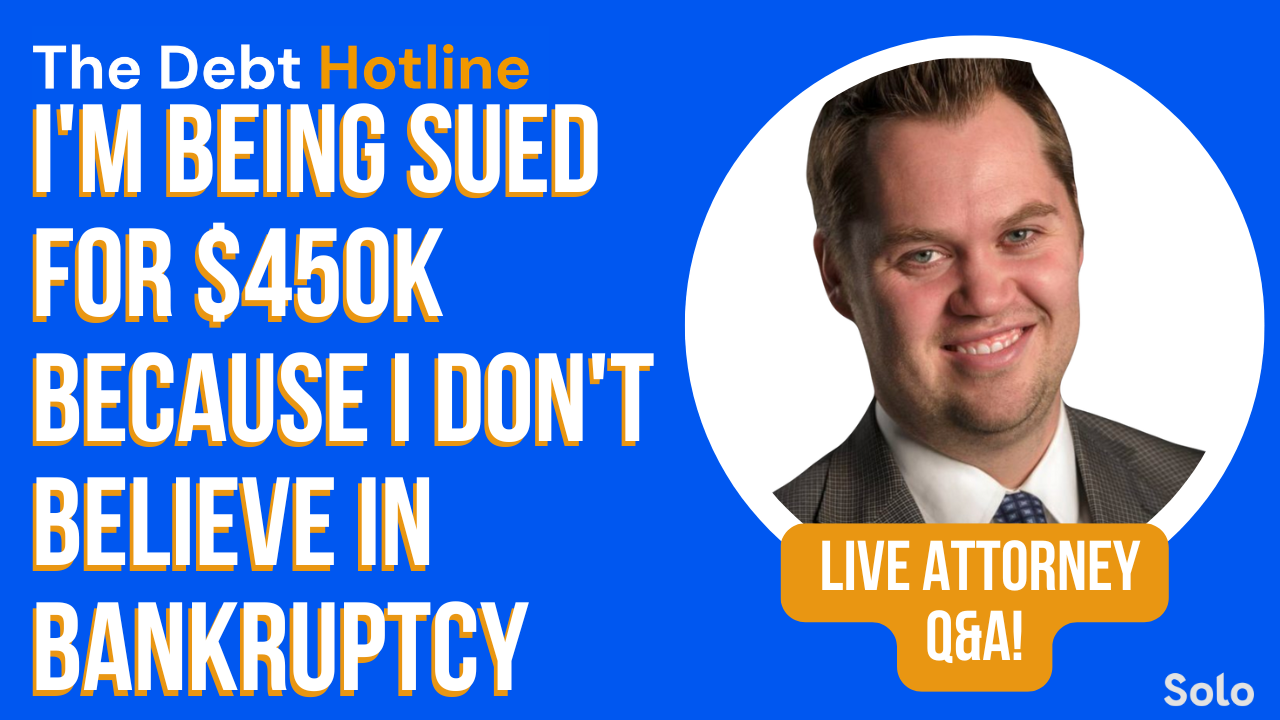
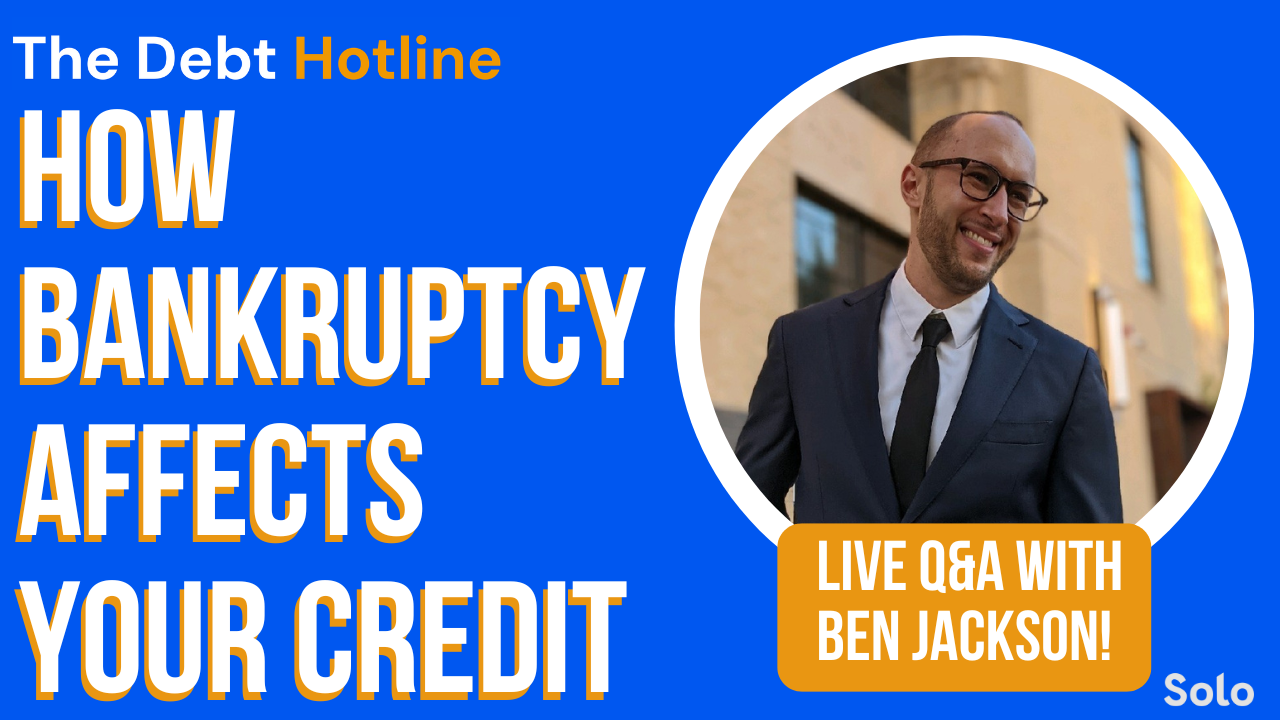
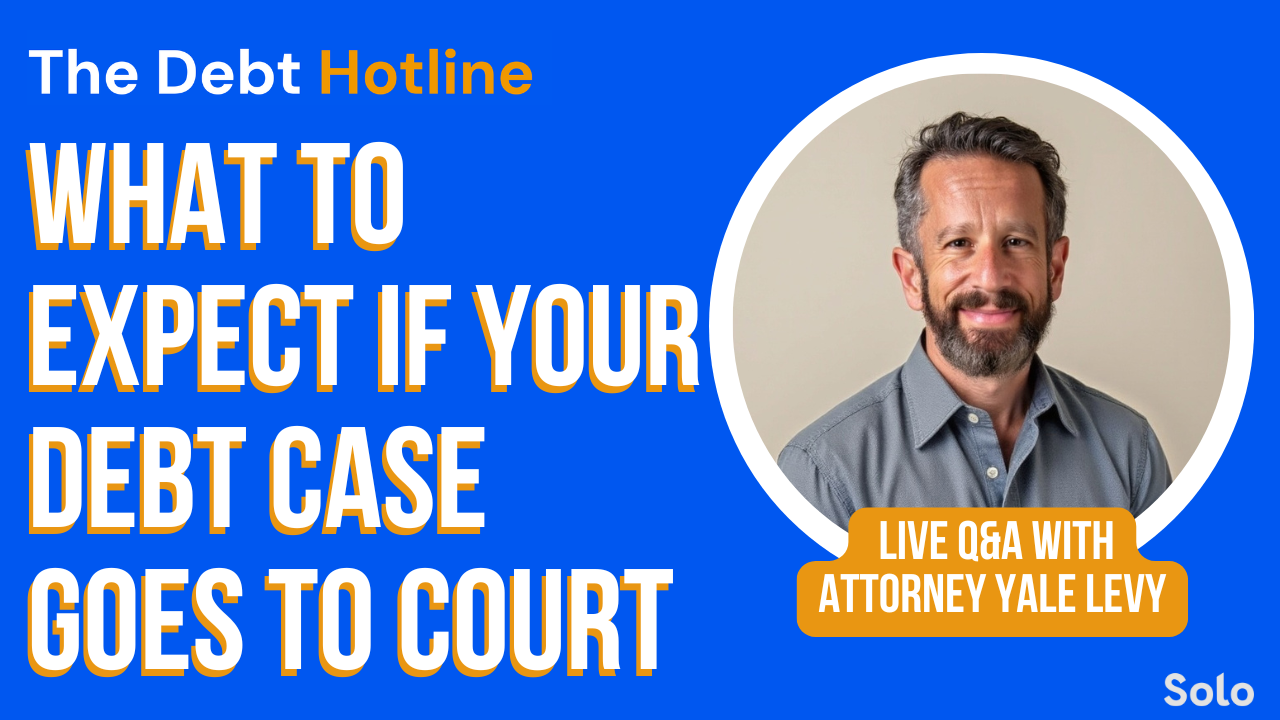

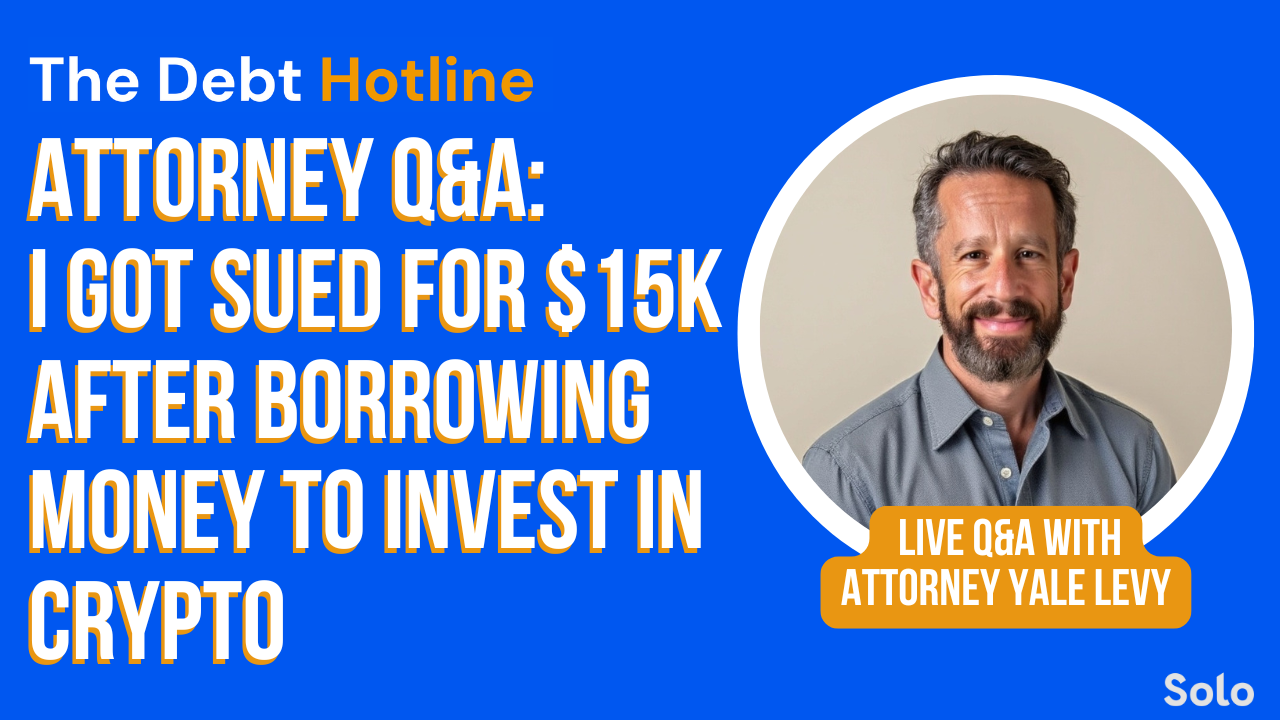
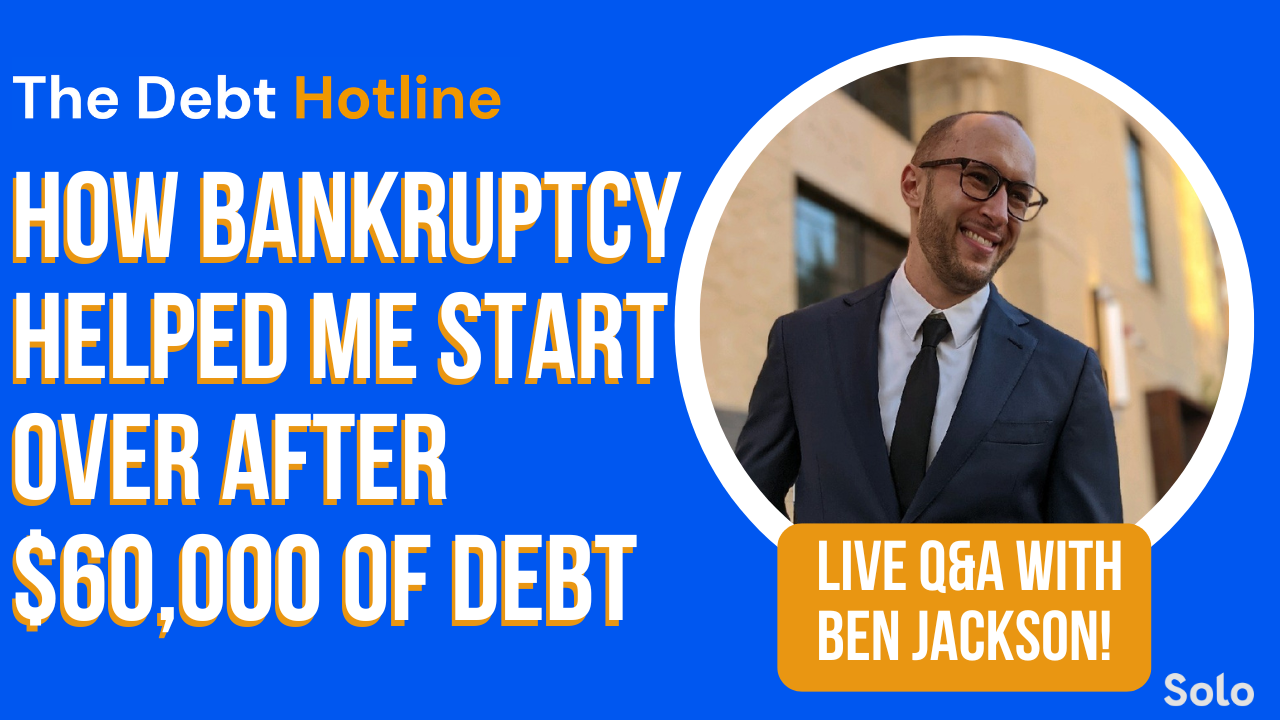
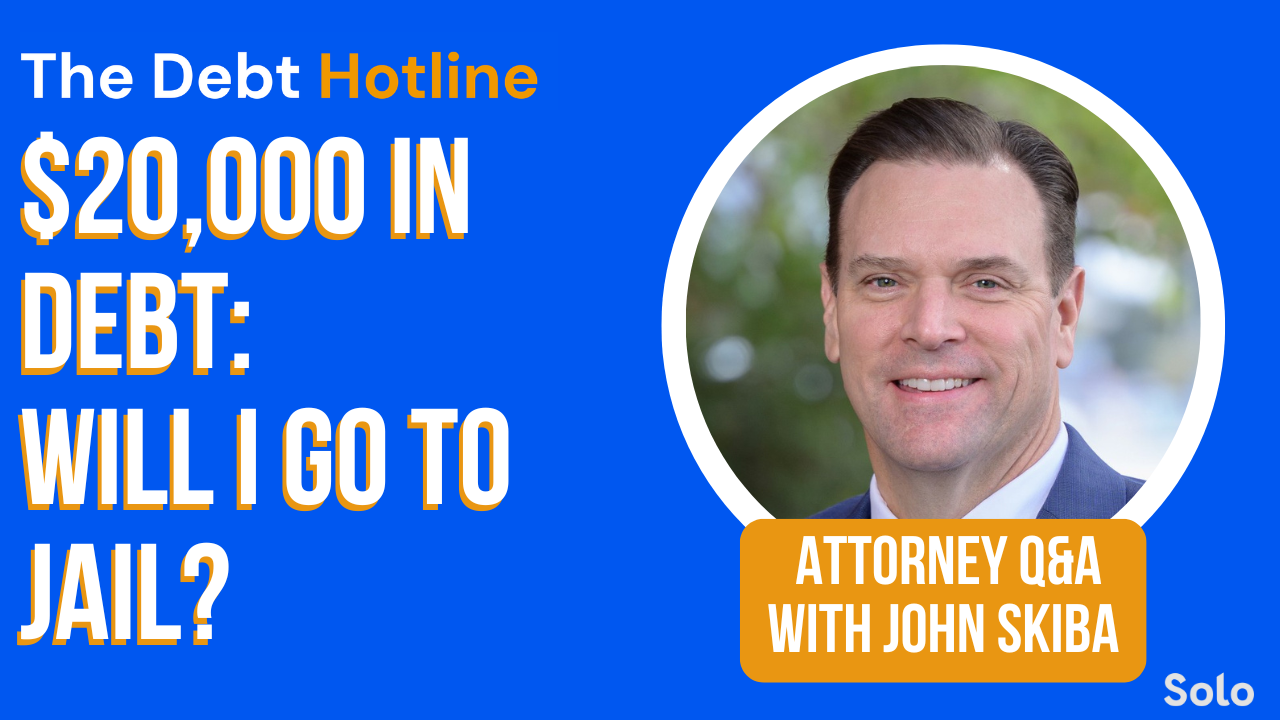
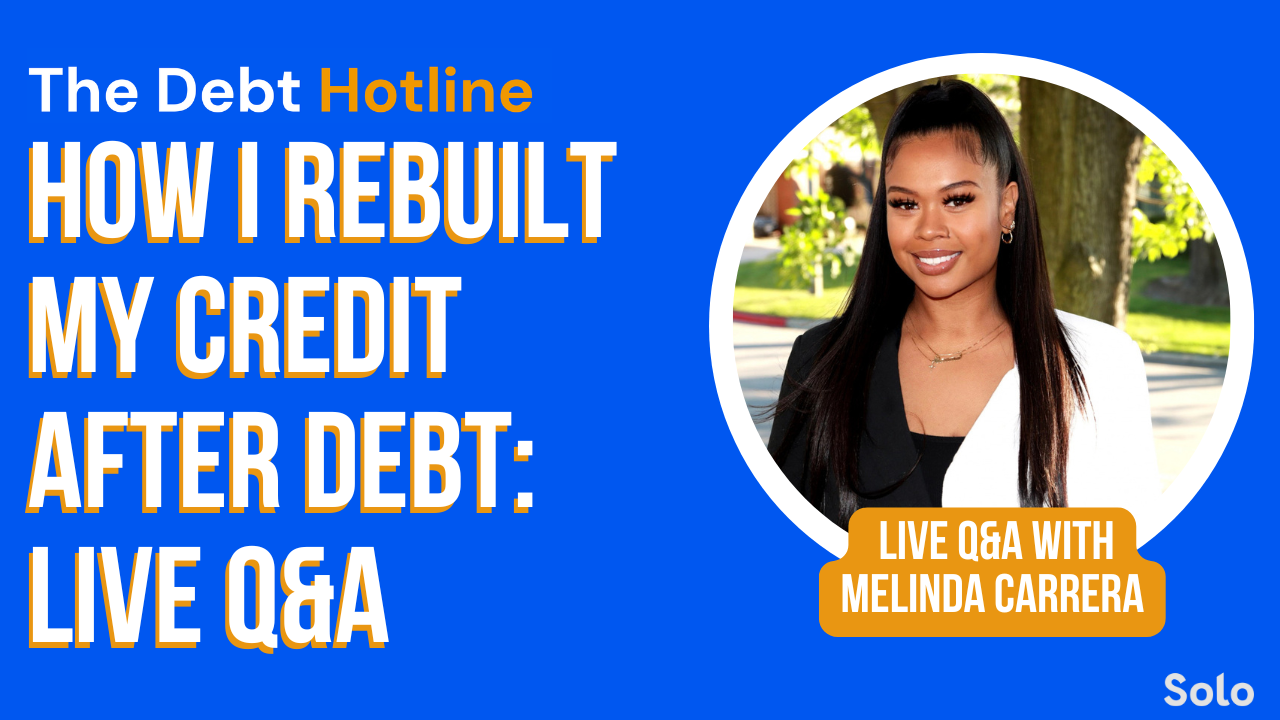
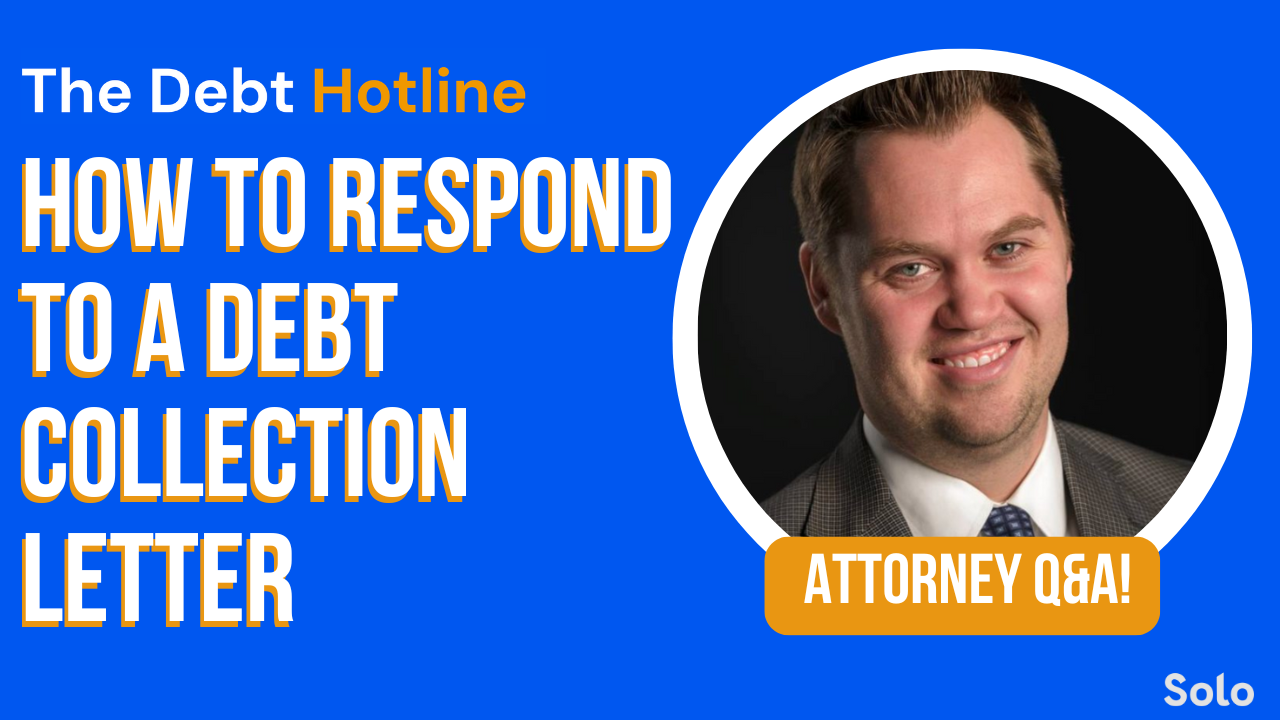
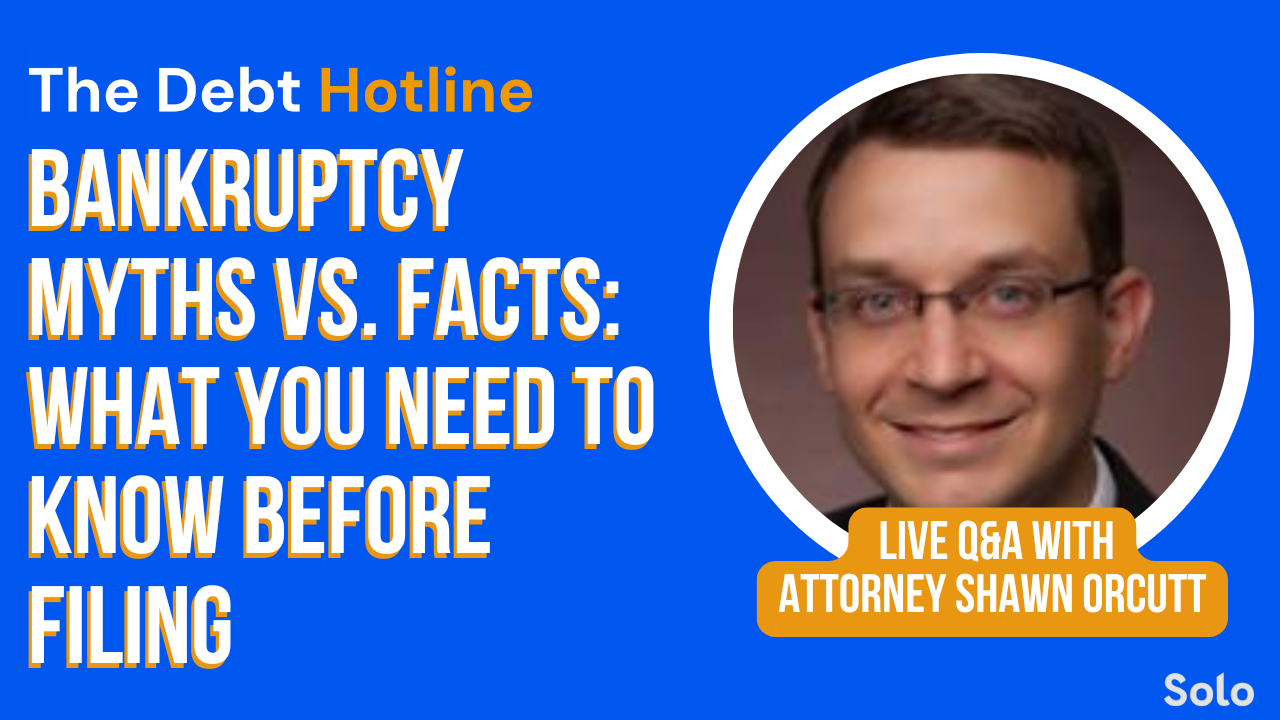
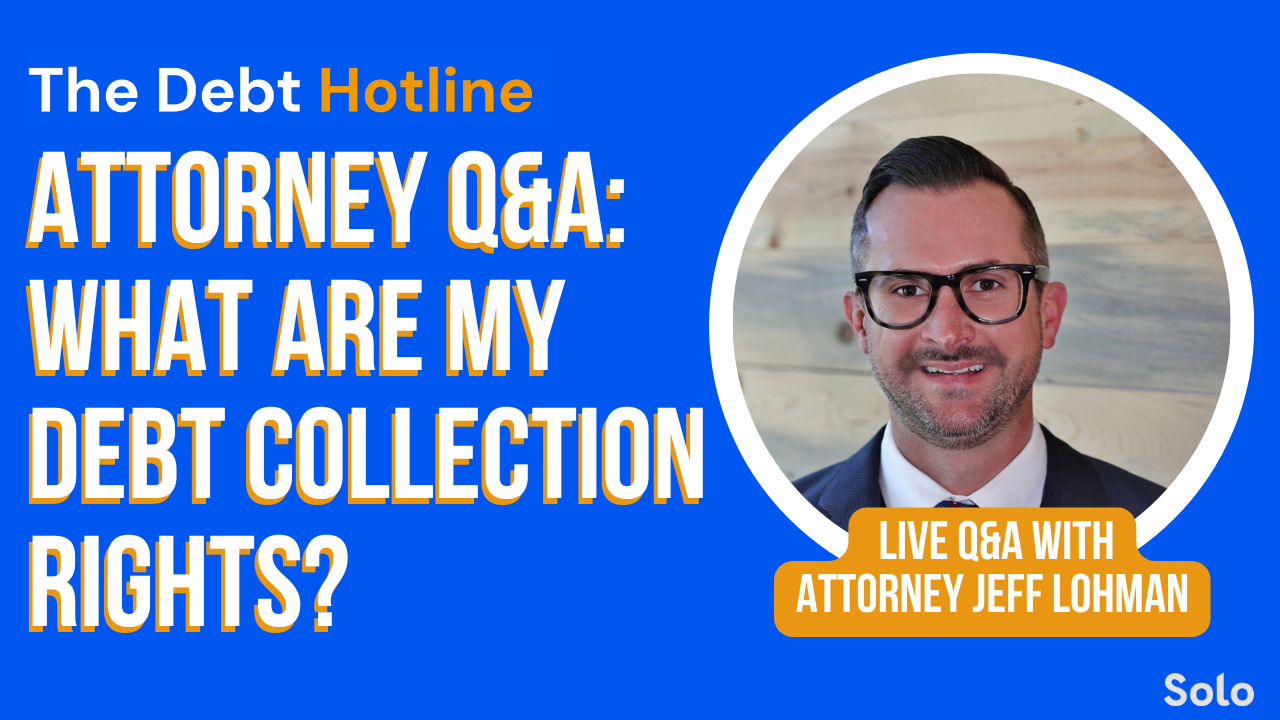

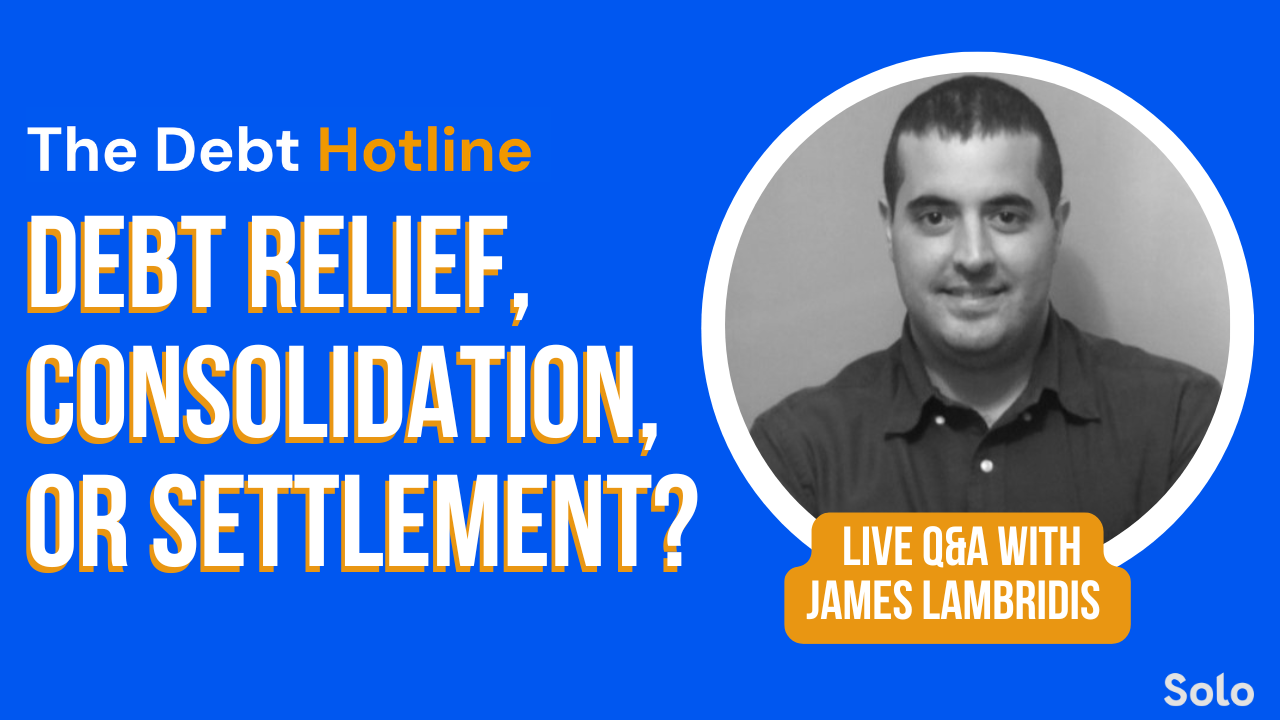
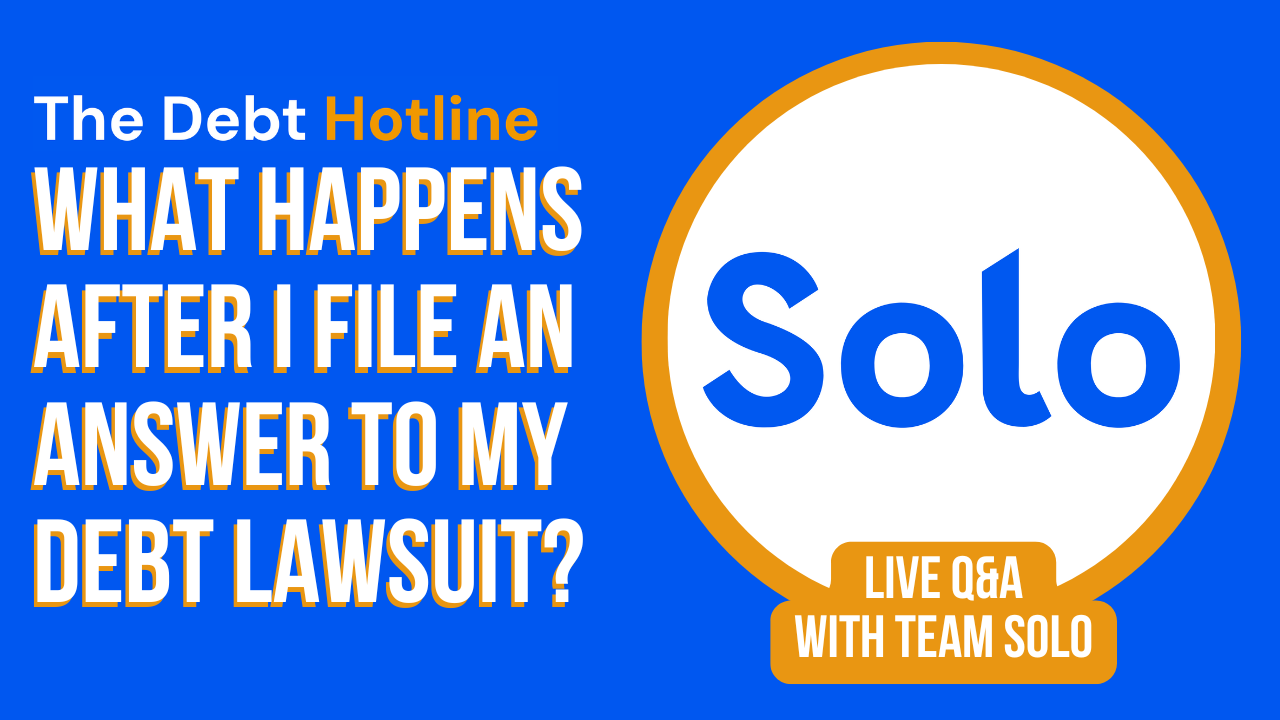
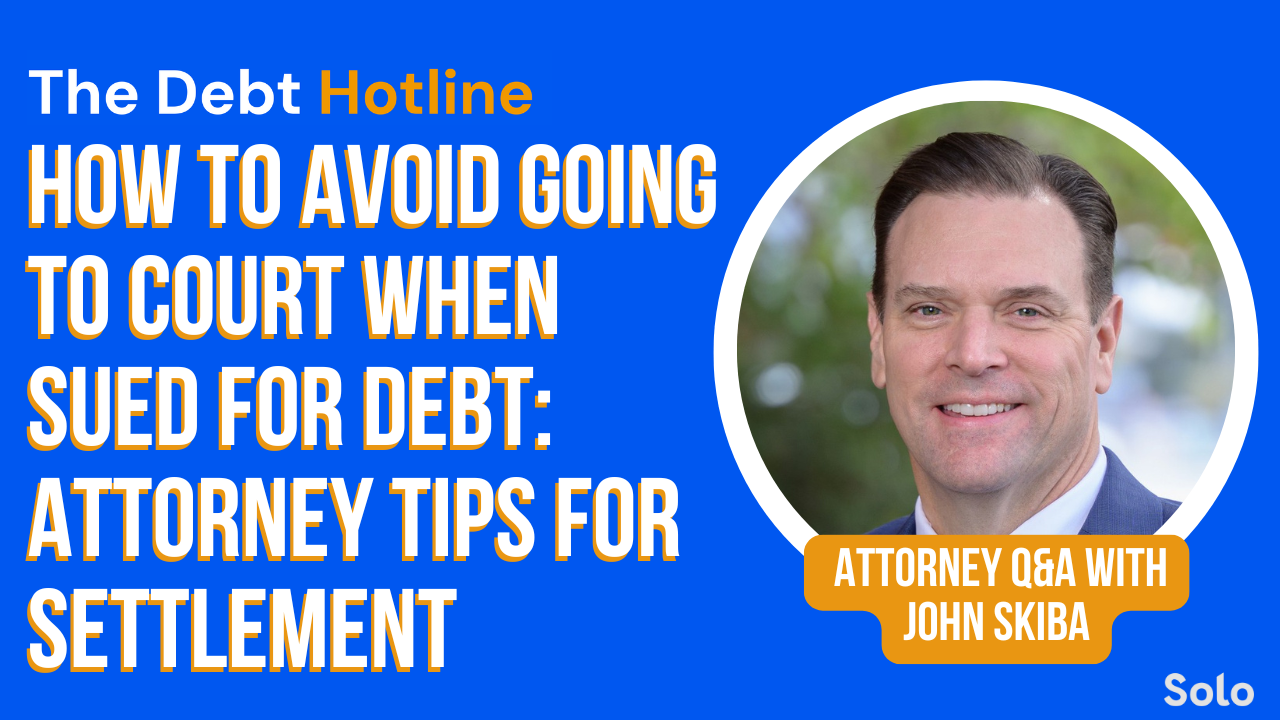


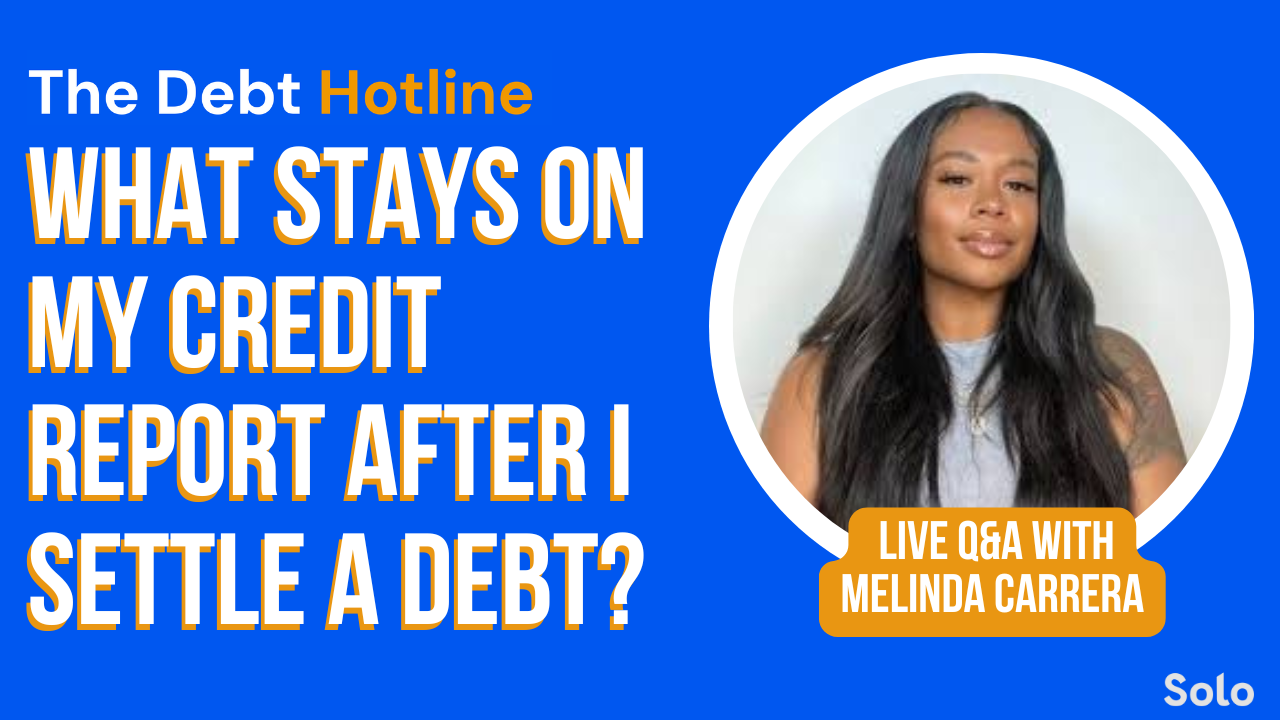
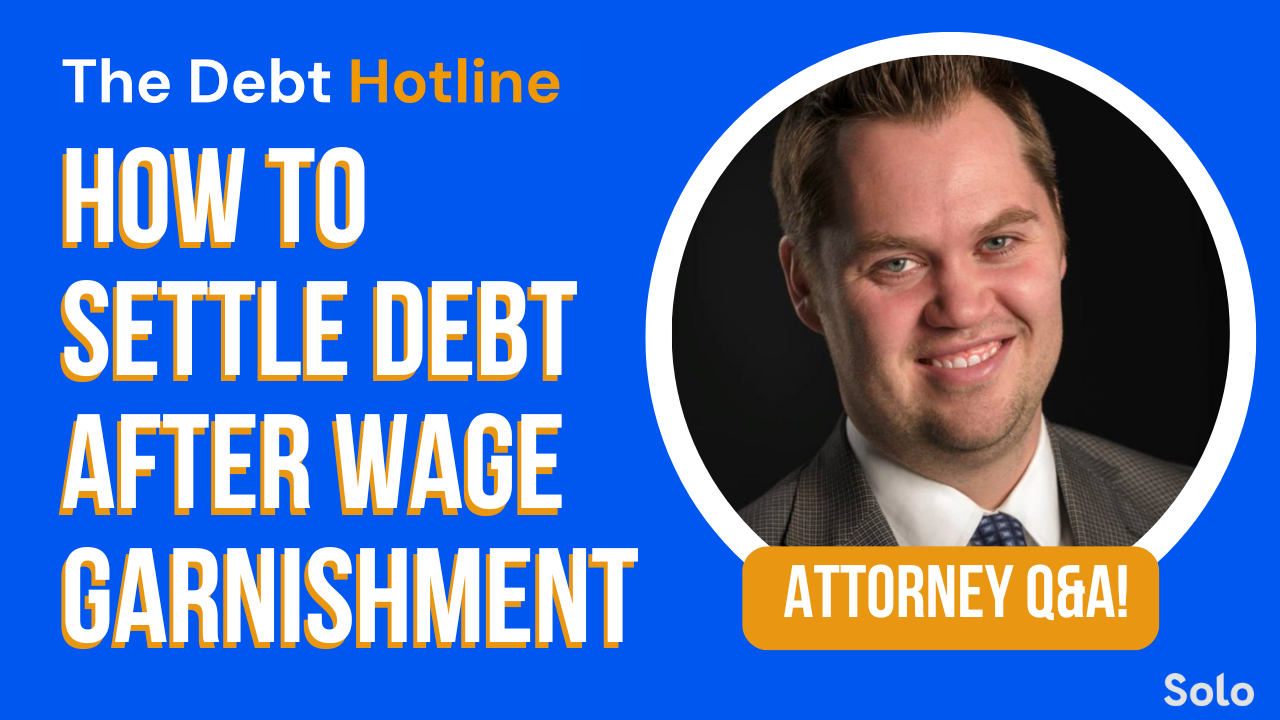
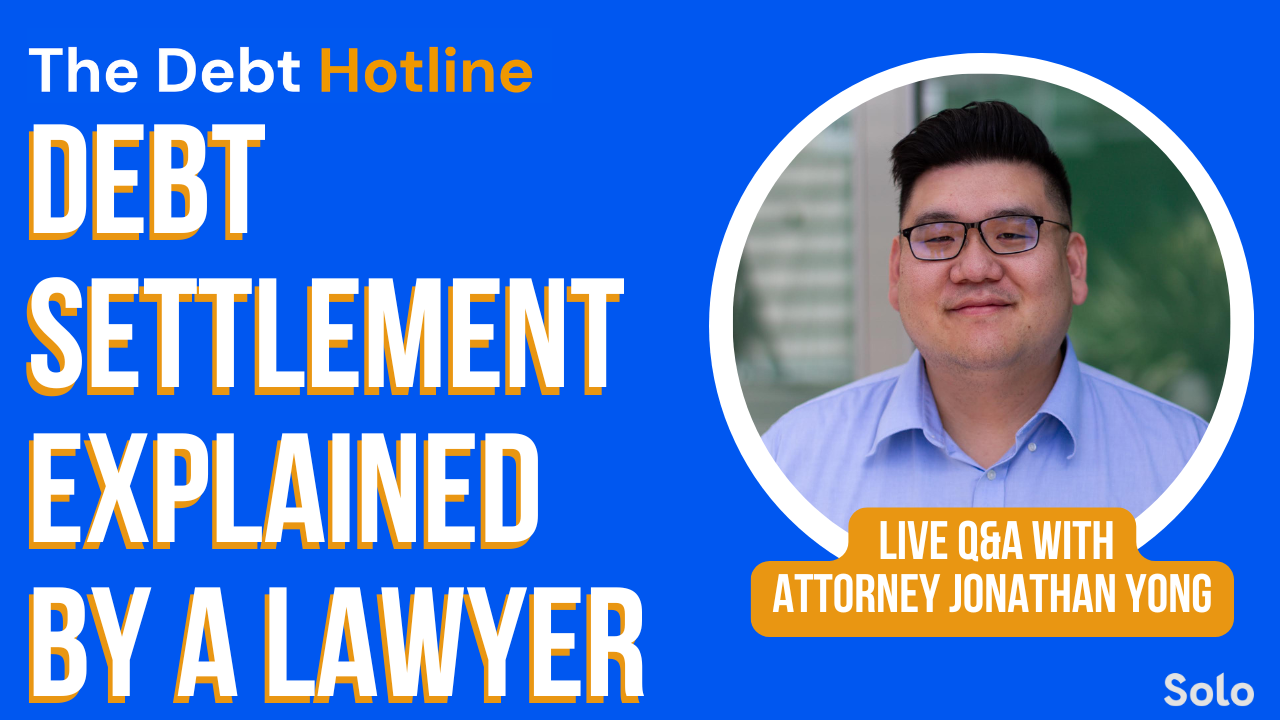
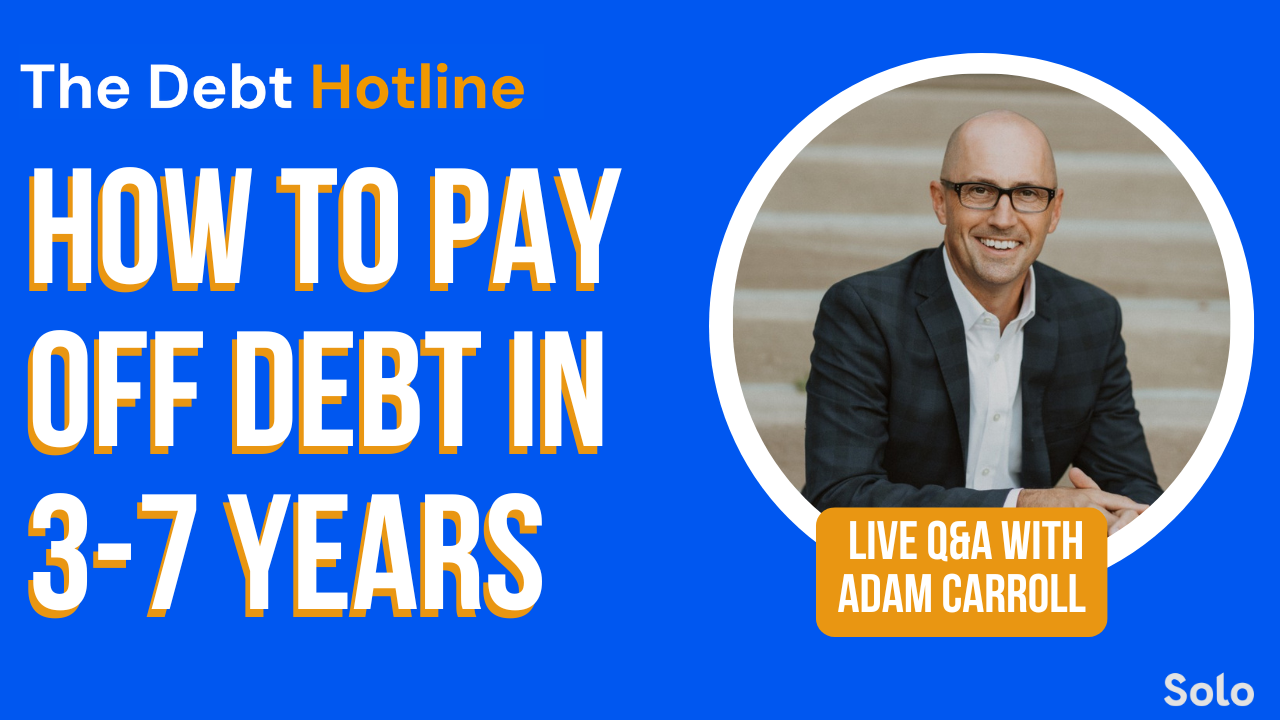
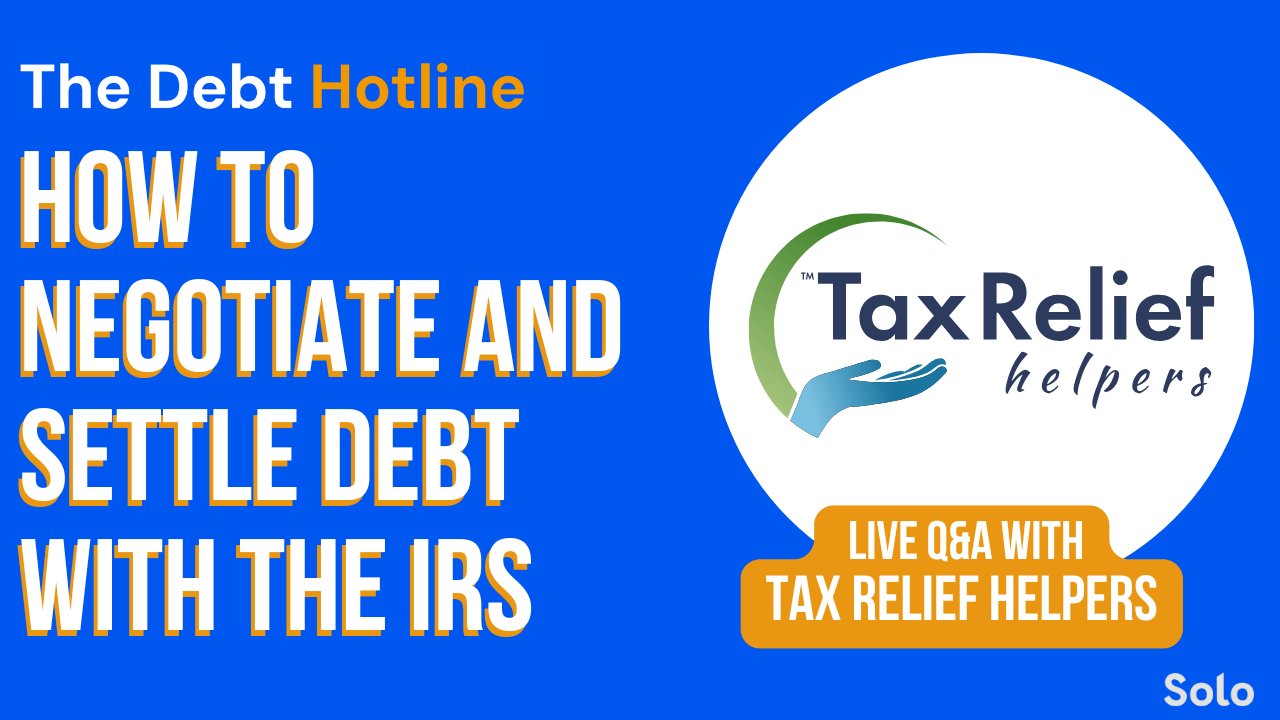
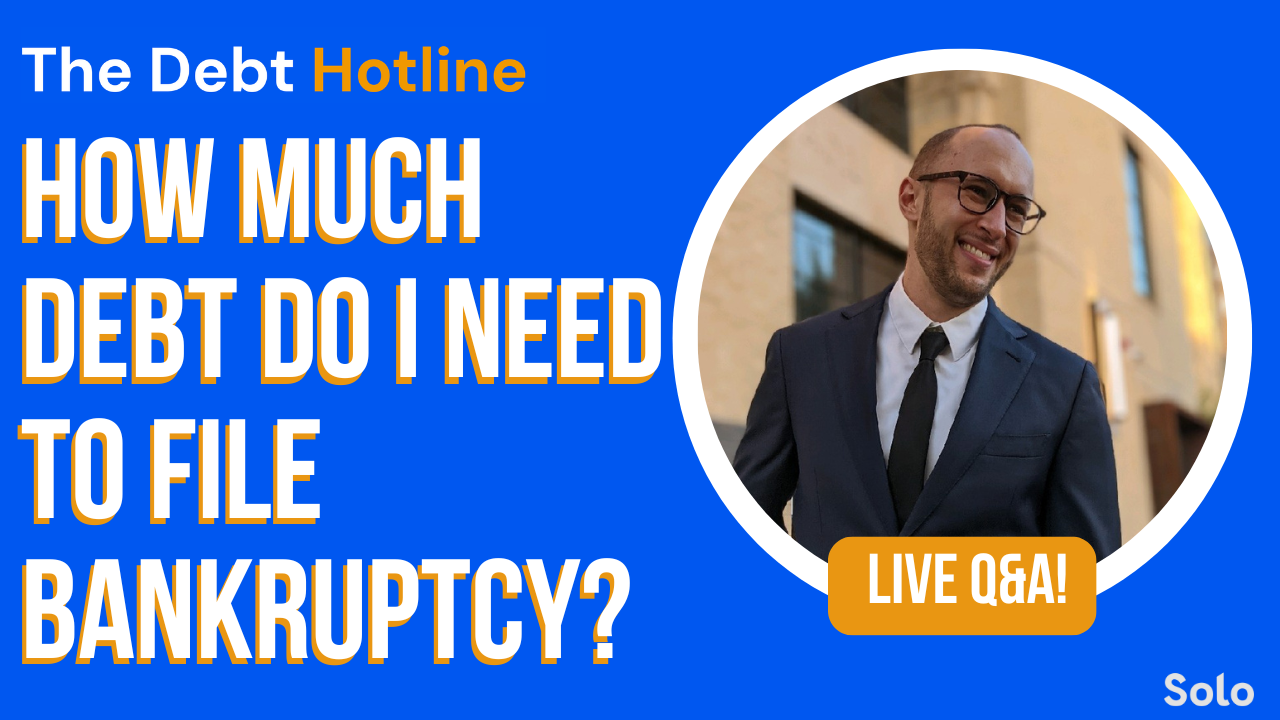


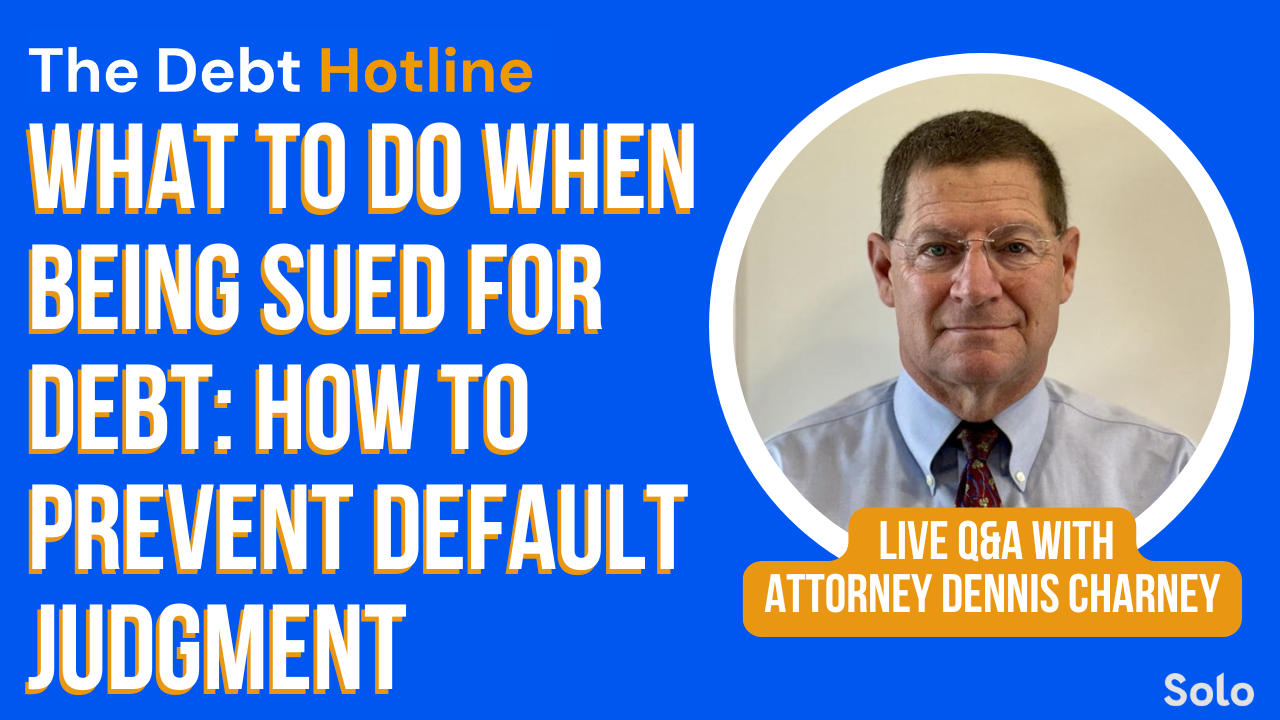
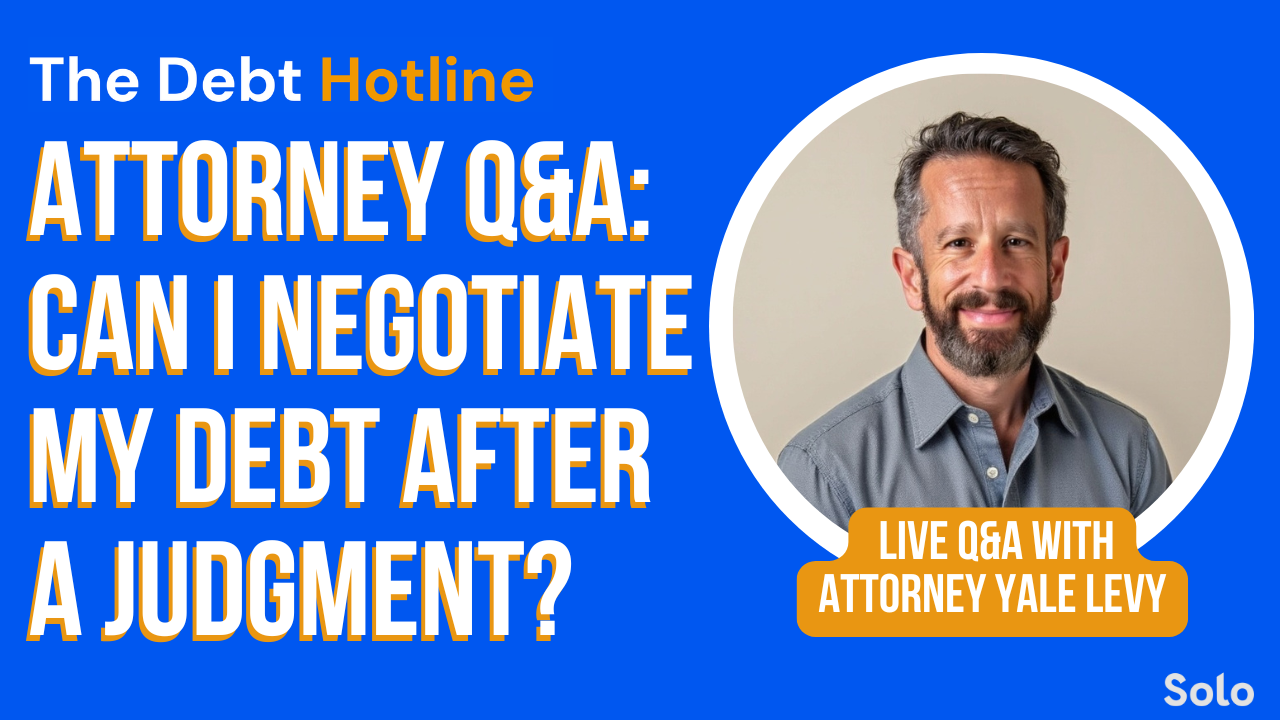
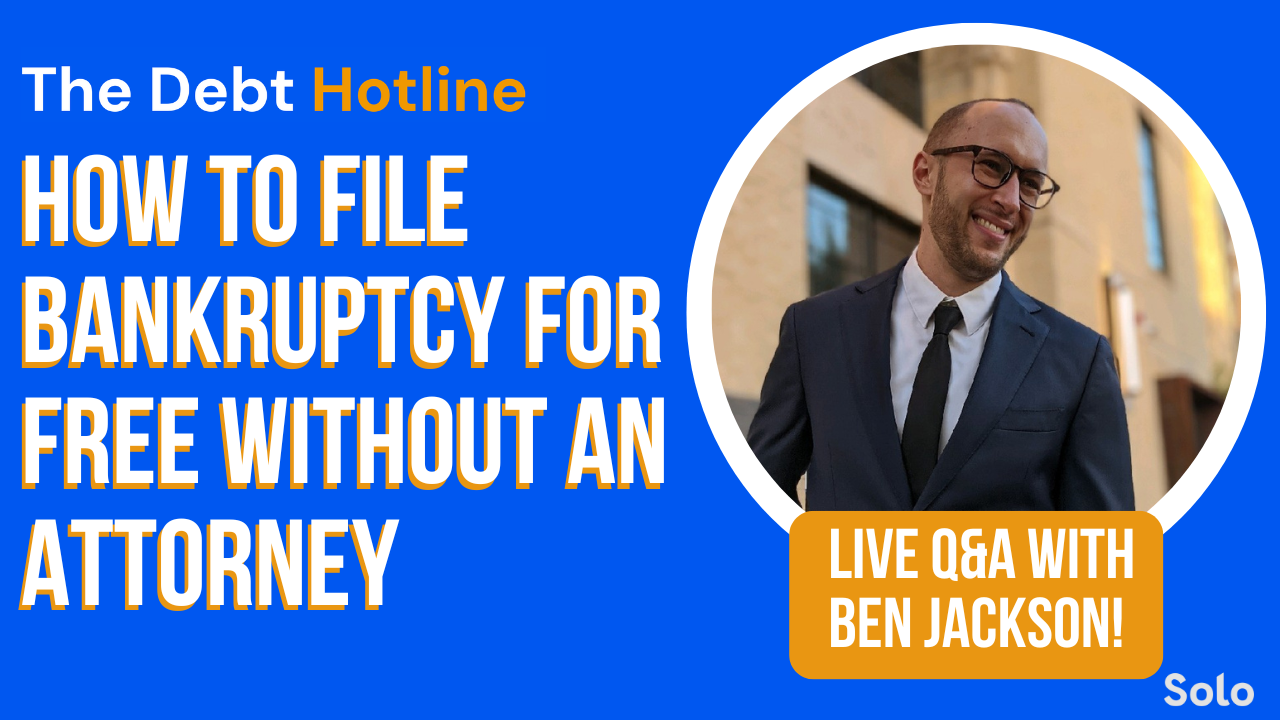
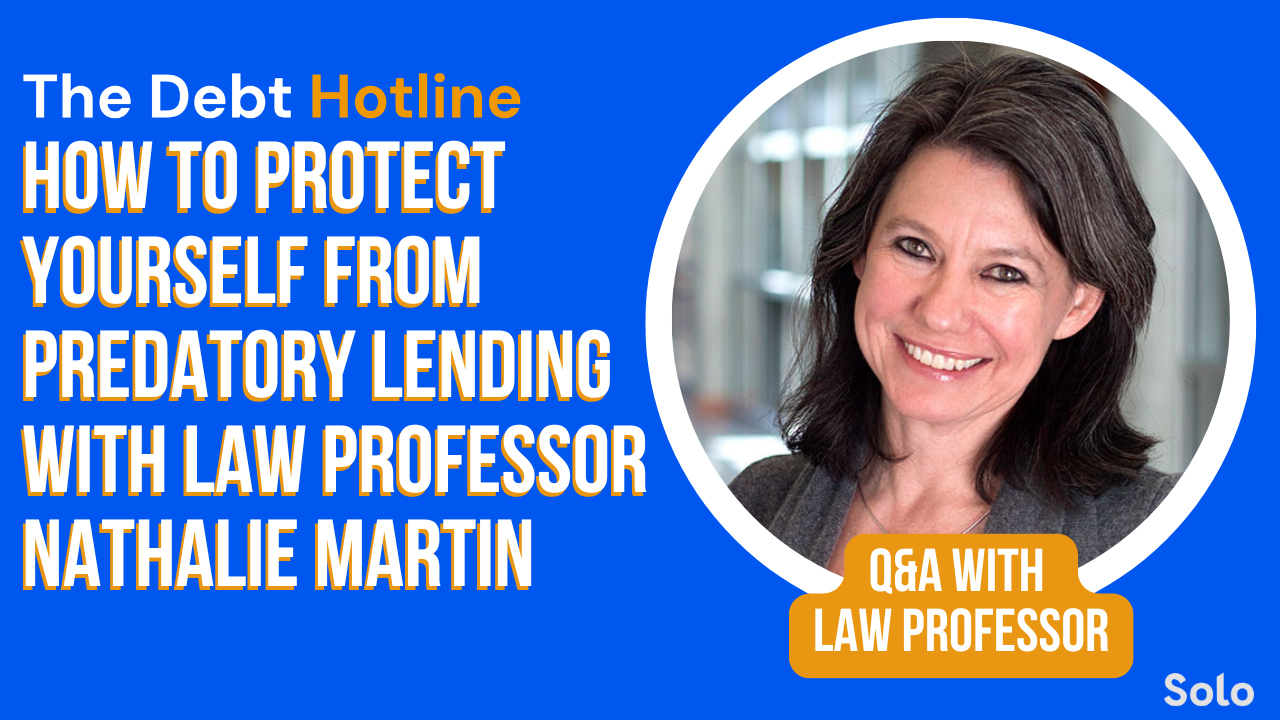
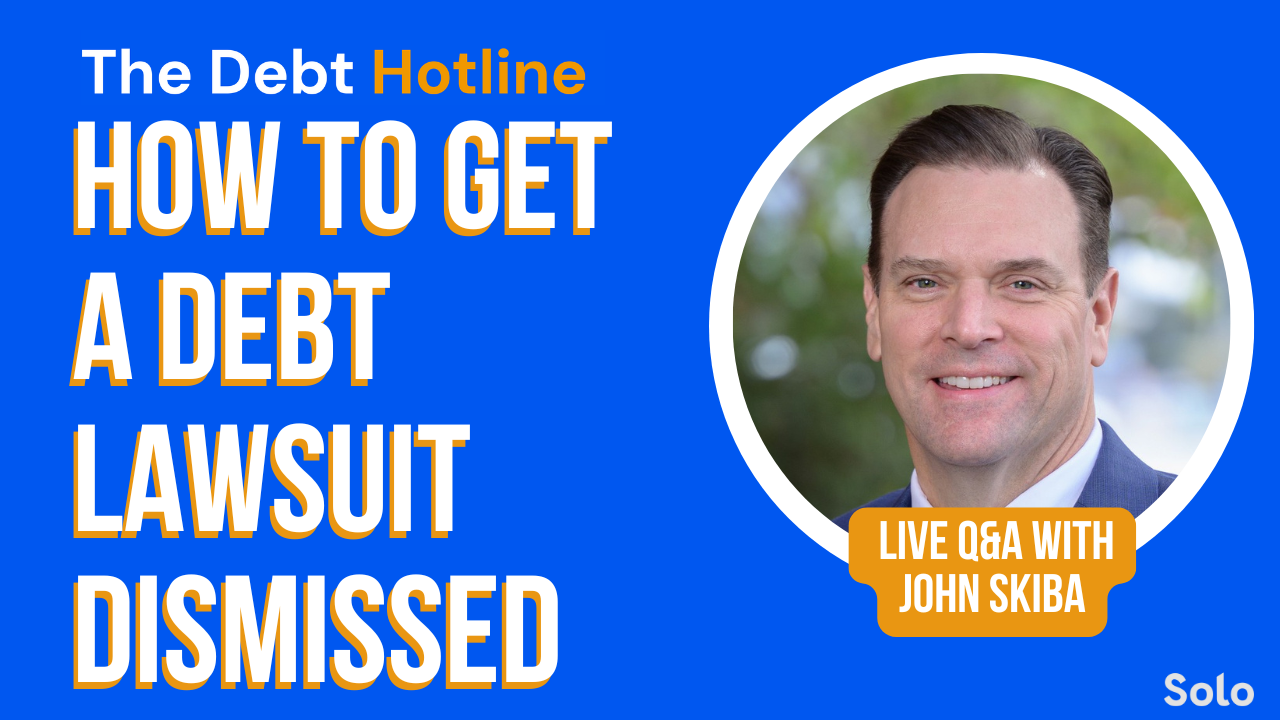
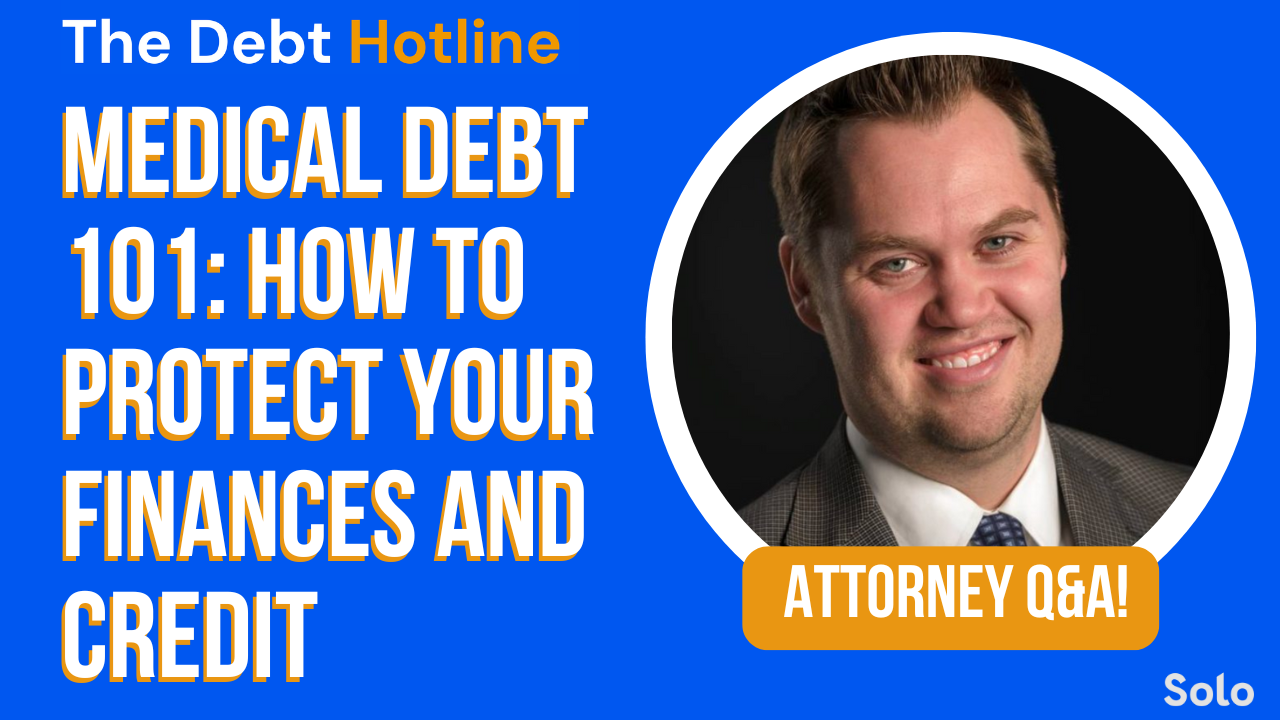

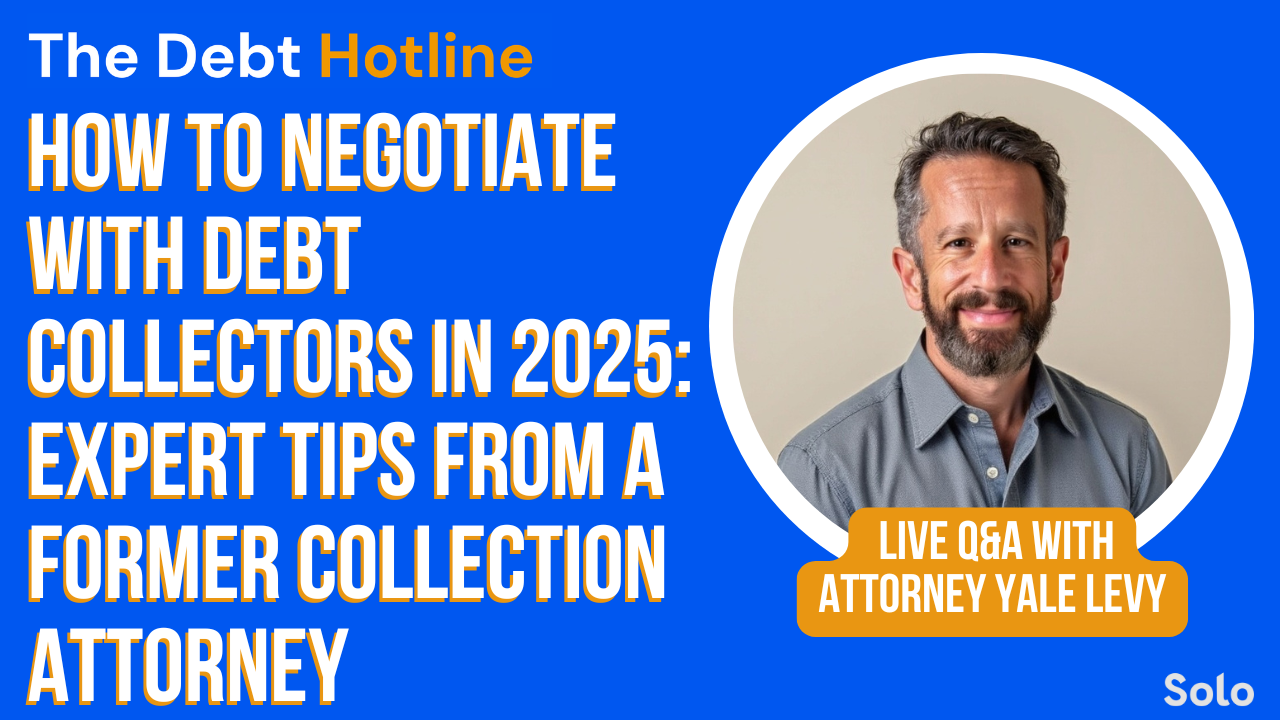
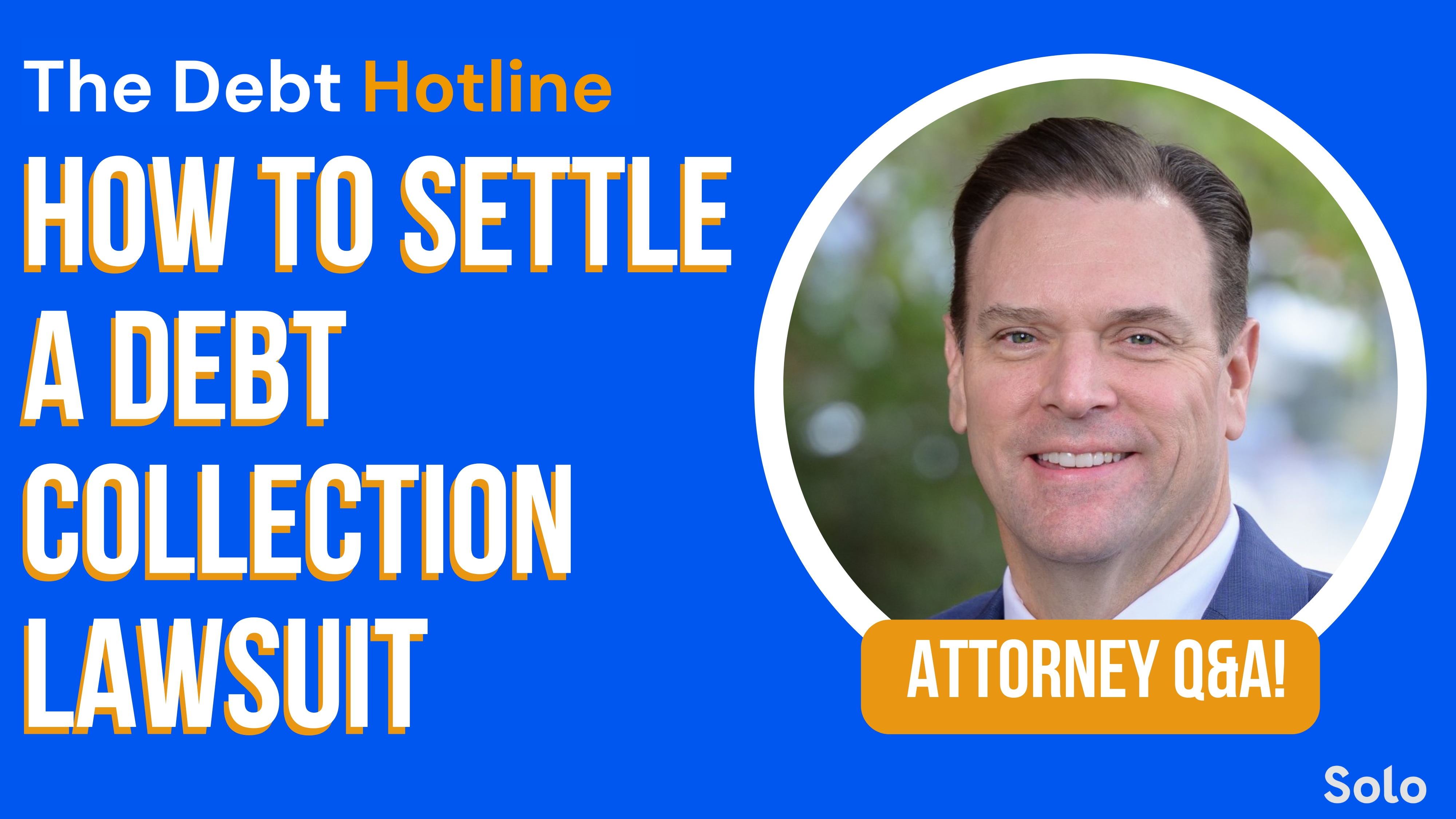
































































































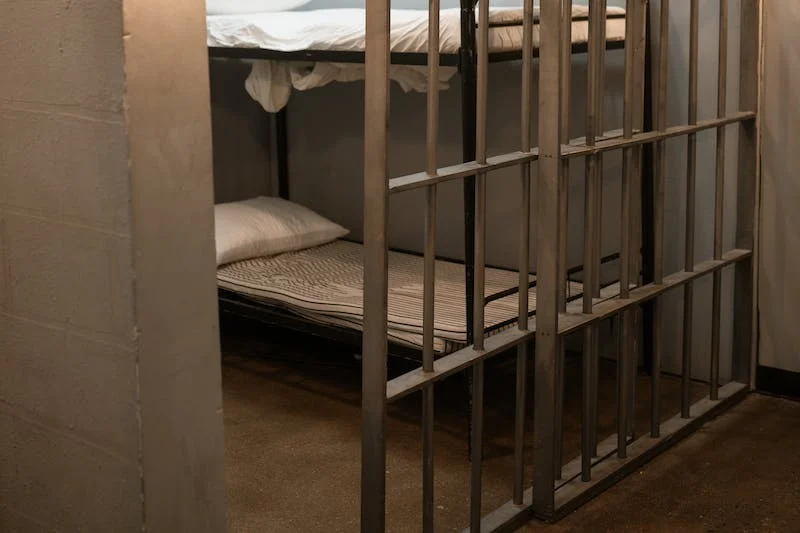



































































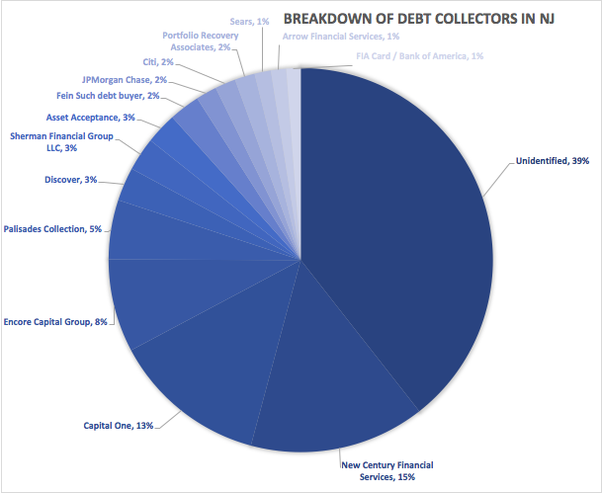


.png)
